- Discovery Platform
- Innovation Scouting
- Startup Scouting
- Technology Scouting
- Tech Supplier Scouting
- Venture Clienting
- Startup Program
- Trend Intelligence
- Business Intelligence
- All Industries
- Industry 4.0
- Manufacturing
- Case Studies
- Research & Development
- Corporate Strategy
- Corporate Innovation
- Open Innovation
- New Business Development
- Product Development
- Agriculture
- Construction
- Sustainability
- All Startups
- Circularity
- All Innovation
- Business Trends
- Emerging Tech
- Innovation Intelligence
- New Companies
- Scouting Trends
- Startup Programs
- Supplier Scouting
- Tech Scouting
- Top AI Tools
- Trend Tracking
- All Reports [PDF]
- Circular Economy
- Engineering
- Oil & Gas
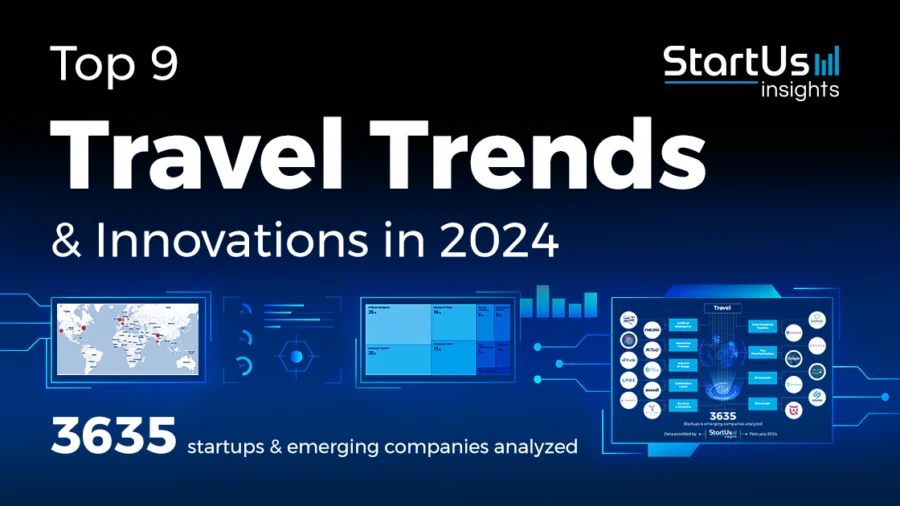

Share this:
- Click to share on Facebook (Opens in new window)
- Click to share on Twitter (Opens in new window)
- Click to share on LinkedIn (Opens in new window)
Top 9 Travel Trends & Innovations in 2024
How are the latest trends in the travel industry reshaping trip planning and enhancing tourist experiences in 2024? Explore our in-depth industry research on the top 9 travel trends based on our analysis of 3500+ companies worldwide. These trends include AI, immersive tourism, IoT, contactless travel & more!
Technological advancements in the travel industry meet the growing demand for personalized experiences, safety, and sustainability. Post the COVID-19 pandemic, emerging travel trends mark a shift towards contactless travel through digital payments, self-check-ins, and more. Additionally, artificial intelligence (AI), the Internet of Things (IoT), and blockchain are automating various hospitality and travel-related operations.
For instance, smart hotels make use of internet-connected devices to remotely control rooms. Further, businesses offer virtual tours by adopting extended reality (XR) technologies like virtual reality (VR) and augmented reality (AR). Travel companies also leverage data analytics to personalize marketing. At the same time, traveler assisting solutions like chatbots and voice technology aid them in booking accommodation and optimizing journeys. These travel trends improve the overall profitability of the tourism industry and enable it to make operations more sustainable and safe.
This article was published in July 2022 and updated in February 2024.
Innovation Map outlines the Top 9 Travel Trends & 18 Promising Startups
For this in-depth research on the Top 9 Trends & Startups, we analyzed a sample of 18 global startups and scaleups. The result of this research is data-driven innovation intelligence that improves strategic decision-making by giving you an overview of emerging technologies & startups in the travel industry. These insights are derived by working with our Big Data & Artificial Intelligence-powered StartUs Insights Discovery Platform , covering 2 500 000+ startups & scaleups globally. As the world’s largest resource for data on emerging companies, the SaaS platform enables you to identify relevant startups, emerging technologies & future industry trends quickly & exhaustively.
In the Innovation Map below, you get an overview of the Top 9 Travel Trends & Innovations that impact travel & tourism companies worldwide. Moreover, the Travel Innovation Map reveals 3 500+ hand-picked startups, all working on emerging technologies that advance their field.
Top 9 Travel Trends
- Artificial Intelligence
- Immersive Tourism
- Internet of Things
- Contactless Travel
- Big Data & Analytics
- Post-Pandemic Tourism
- Tour Premiumization
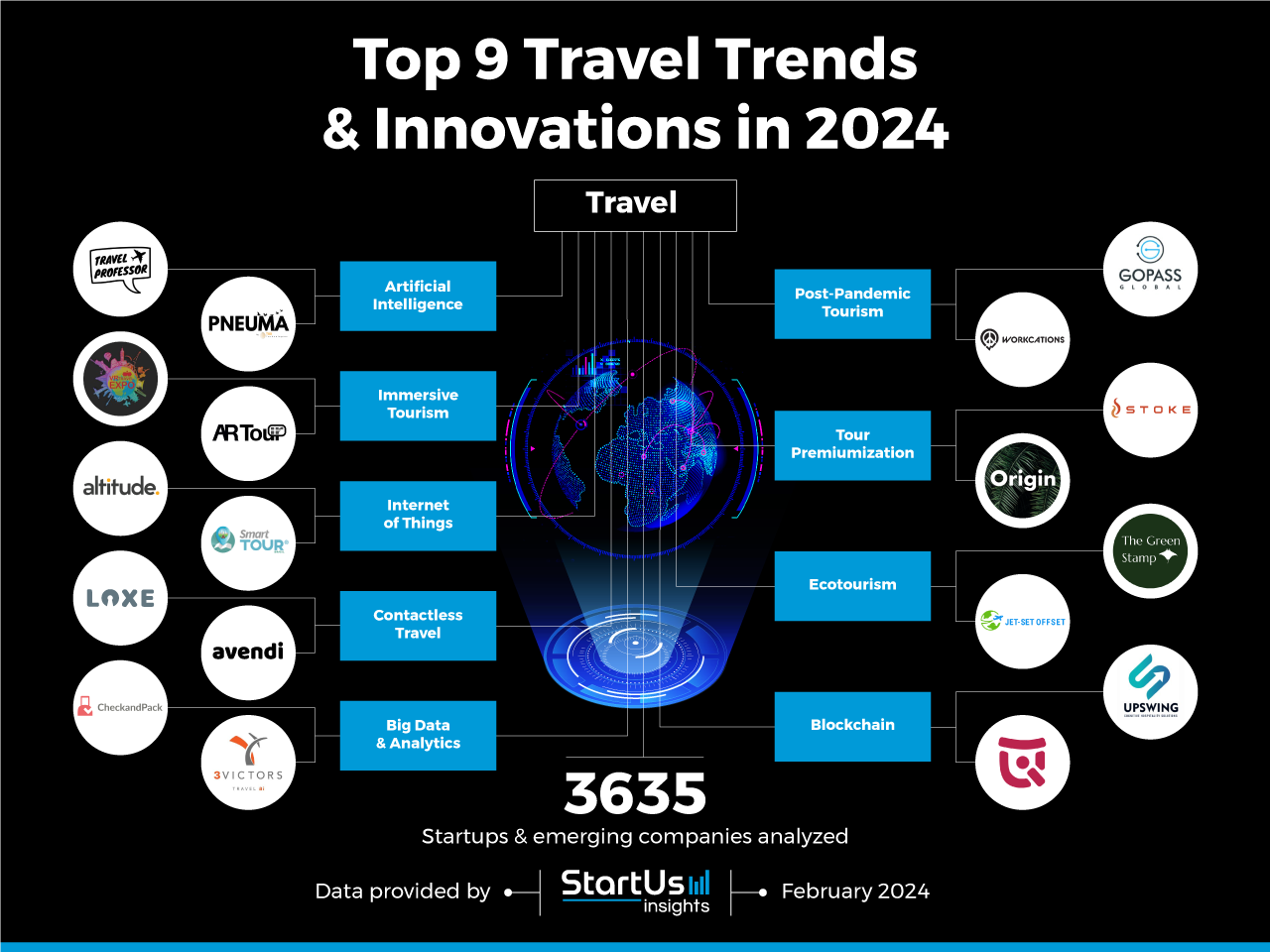
Click to download
Tree Map reveals the Impact of the Top 9 Travel Trends
Based on the Travel Innovation Map, the Tree Map below illustrates the impact of the Top 9 Travel Industry Trends in 2024. Startups and scaleups are enabling contactless travel using technologies like biometrics, radio-frequency identification (RFID), and near-field communication (NFC). This is due to increasing health and hygiene concerns post the pandemic. The use of AI in tourism ensures hassle-free trip planning while AR and VR allow tourists to virtually visit various locations and excursions. IoT increases visibility into tourism industry operations and allows passengers to track their luggage more efficiently. Further, the demand for personalized and luxurious travel is rising. Several startups enable recreational space travel as well as offer sustainable travel options to passengers.
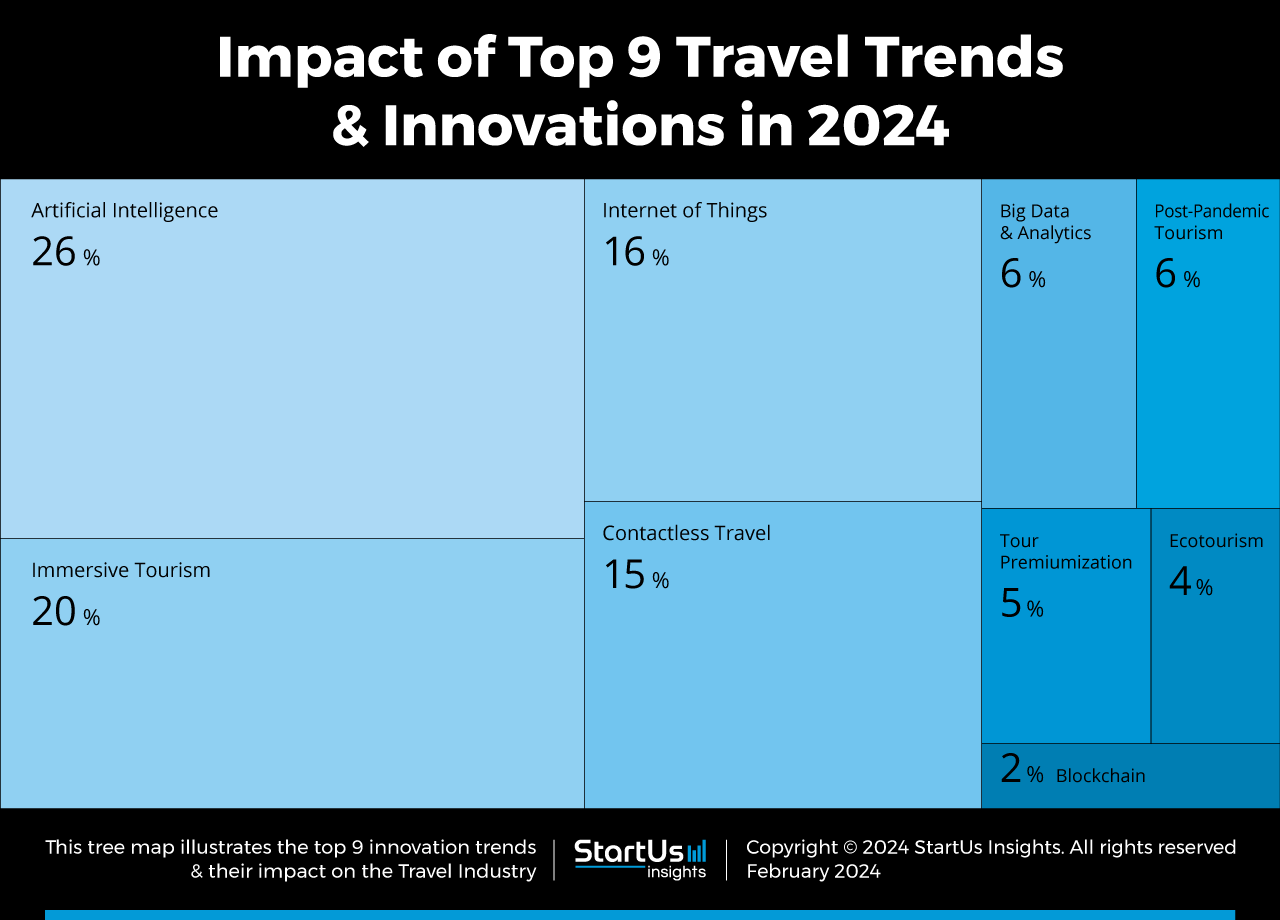
Global Startup Heat Map covers 3 635 Travel Startups & Scaleups
The Global Startup Heat Map below highlights the global distribution of the 3 635 exemplary startups & scaleups that we analyzed for this research. Created through the StartUs Insights Discovery Platform, the Heat Map reveals that the US, Europe, and India see the most activity.
Below, you get to meet 18 out of these 3 635 promising startups & scaleups as well as the solutions they develop. These 18 startups are hand-picked based on criteria such as founding year, location, funding raised, and more. Depending on your specific needs, your top picks might look entirely different.
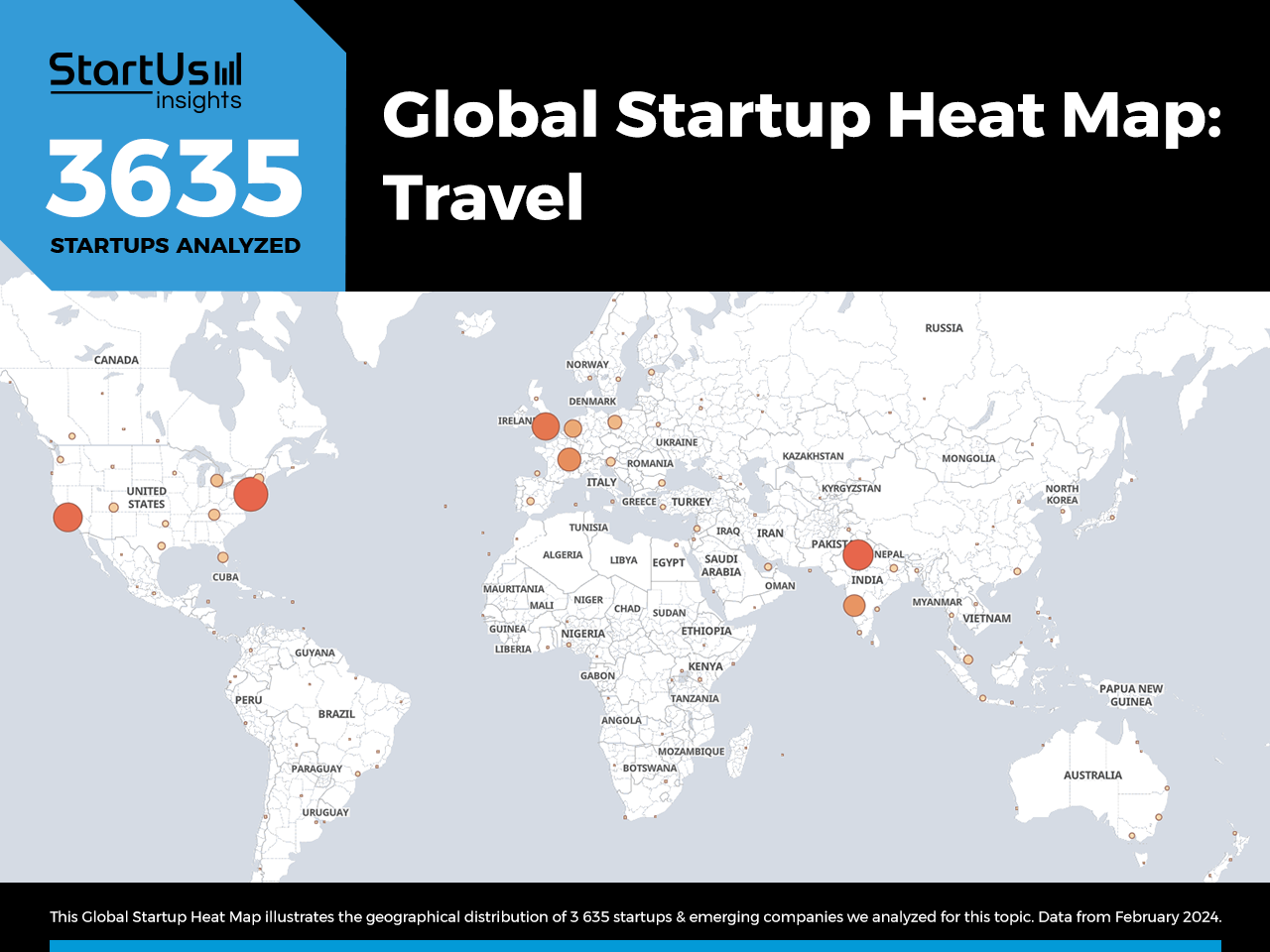
Interested in exploring all 3500+ travel startups & scaleups?
Top 9 Travel Trends in 2024
1. artificial intelligence.
Hotels employ intelligent chatbots, powered by AI, to provide quick and personalized responses to traveler inquiries. These chatbots simplify the booking process and gather customer reviews, aiding potential travelers in making informed decisions. Moreover, AI-based robots enhance the customer experience by automating hotel disinfection and delivering room service.
At airports, these robots guide travelers and assist with luggage handling. Facial recognition technology, driven by AI, expedites identity verification at airports, enhancing security and offering a swift alternative to traditional methods. Startups are developing AI-powered trip planning solutions, optimizing journeys, and personalizing travel experiences.
Travel Professor develops a Travel Chatbot
UK-based startup Travel Professor offers an AI-enabled chatbot for travelers. The startup’s chat widget software monitors multiple flight deals and notifies users when their preferences match. It also provides travel destination recommendations and flight price alerts. This allows travelers to book economical flights and have a budget-friendly tourism experience.
Pneuma Travel facilitates Travel Planning
US startup Pneuma Travel develops a voice-assisted digital agent, Sarah , to streamline the process of travel planning. This assistant, powered by AI, excels in arranging flight and accommodation bookings and assists travelers in discovering a variety of activities. Sarah , available round the clock, provides continuous support for all travel-related inquiries.
Moreover, Sarah customizes travel options according to individual preferences and budgetary constraints. The agent further enhances the travel experience by providing insights into local attractions in unfamiliar cities. Importantly, Sarah enables real-time modifications to travel plans, in compliance with specific airline policies, thereby minimizing waiting times for users.
2. Immersive Tourism
Immersive tourism caters to the growing demand for meaningful experiences among travelers, leveraging AR, VR, and mixed reality (MR). VR simulates original locations through a computer-generated environment, allowing tourists to virtually explore destinations. It provides travelers with a comprehensive 360-degree tour of points of interest.
AR enhances the travel experience with interactive elements such as navigation maps and ads. Travel companies employ AR and VR-based gamification to heighten tourist attractions. Moreover, these technologies enable hotels and resorts to present amenities and rooms in an engaging, interactive manner.
VR Travel Expo offers VR-based Travel Plans
US startup VR Travel Expo develops a VR travel application to transform the way people research and book travel. The application enables users to plan their vacations more efficiently. It provides an engaging platform for users to explore and expand their knowledge of the world. Moreover, it employs 3D geospatial technology that creates real-time digital twins of the world. This further enhances the travel planning experience.
AR Tour makes AR Glasses
Italian startup AR Tour offers AR-powered tours. The startup’s AR glasses superimpose reconstructed images of archaeological ruins to show how the site originally was. Its tour informs the tourists about the site’s history and significance via an audio-visual package. Moreover, the startup designs lightweight AR glasses to prevent motion sickness among tourists, improving convenience.
3. Internet of Things
IoT generates ample data that tourism companies leverage to personalize services in their subsequent visits. Hotels use IoT sensors to enable smart rooms that automate room lighting, temperature, and ambiance control, enhancing guest comfort. These sensors adjust appliances in vacant rooms, conserving energy and reducing the building’s carbon footprint.
Startups harness IoT to deliver location-specific information to customers, including real-time luggage tracking via IoT tags, minimizing lost items. Airlines also incorporate IoT-based solutions into seats, monitoring passenger temperature and heart rate for proactive health management.
Altitude enables Smart Hotels
New Zealand-based startup Altitude creates an IoT-based hotel software and hardware to develop smart hotels. The startup makes self-service kiosks to automate reservations, room up-gradation, payments, as well as check-in and check-out. Its hotel management platform further enables contactless engagement with guests. Additionally, Altitude’s mobile keys allow guests to open doors using mobile phones, providing convenience and saving time for travelers.
Smart Tour provides Smart Itineraries
Brazilian startup Smart Tour offers smart itineraries using IoT and quick response (QR) codes. The startup recommends travel routes and destinations based on the user’s preference in real-time. This facilitates a seamless experience for travelers. Besides, the user-generated data enables tourism managers to better understand consumer behavior and indulge in proximity marketing. The startup also offers a contact tracing solution to monitor COVID-19 infected travelers and ensure public safety.
4. Contactless Travel
Travelers benefit from contactless recognition technologies like retina scanning, which replace traditional travel documents, speeding up passenger identification and reducing airport queues. QR codes offered by travel companies allow tourists to access relevant information on their mobile devices, enhancing engagement.
Hotels have introduced contactless self-check-ins, enabling visitors to arrange services before arrival. Additionally, contactless payment modes are available in hotels and restaurants for swift and secure transactions. Moreover, wearable devices are transforming the travel experience by providing real-time notifications and touch-free access to services and information.
Loxe designs Smart Hotel Keys
US-based startup Loxe makes smart mobile keys for hotels. The startup’s smartphone app replaces key cards with contactless mobile keys that allow users to unlock doors using smartphones. It also reduces operational costs incurred in the manufacturing of conventional keys or plastic cards. Moreover, the startup designs a Bluetooth retrofit module that converts normal door locks into mobile-ready door locks. This allows hotel owners to easily convert their existing locks into smart ones without additional expenses while improving guest safety and convenience.
Avendi provides Contactless Payment
Singaporean startup Avendi offers contactless and cashless payments for travelers. The startup allows tourists to accumulate expenses throughout their trip and pay at the end of the journey. Avendi’s app utilizes QR codes to add all the billed expenses and shown through its dashboard. The user settles the tab amount in the preferred currency, preventing the inconvenience of cash withdrawal or credit card payments.
5. Big Data & Analytics
Big data empowers travel companies with customer trends for strategic marketing. Analyzing traveler behavior, they offer tailored recommendations for hotel bookings, cab hires, flight reservations, and ticket purchases.
Predicting future demand is another advantage of big data and analytics, helping hotels and airlines identify peak periods to optimize revenue. Advanced analysis of transactional data aids in detecting cyber fraud, and safeguarding sensitive customer information such as credit card details and biometric data.
CheckandPack creates a Travel Platform
Dutch startup CheckandPack offers a big data travel platform. It runs marketing campaigns to gather traveler data and understand tourism trends. Based on these insights, the platform enables businesses to approach travelers with a customized appeal. It also provides travelers with holiday planning.
3Victors provides Travel Data Analytics
US-based startup 3Victors offers travel data analytics. The startup’s product, PriceEye Suite , proactively monitors the prices of numerous airlines to provide insights into competitor prices. It creates a dashboard to display travelers’ location of interest, allowing travel airlines to better manage their revenue and pricing strategy.

6. Post-Pandemic Tourism
Post-pandemic tourism focuses on safe, sustainable, and flexible travel options, responding to evolving traveler preferences and health guidelines. Enhanced health and safety protocols, including regular sanitization and contactless services, become standard in airlines and hotels, ensuring traveler confidence.
Destinations and operators emphasize outdoor and less crowded experiences, catering to a heightened demand for nature-based and wellness travel. Flexible booking policies and trip insurance gain prominence, offering peace of mind amid uncertainties. Sustainable travel gains traction, with tourists and businesses prioritizing environmental impact and community well-being.
GOPASS Global enables Pre-travel Risk Management
Singaporean startup GOPASS Global provides a travel risk analytics platform against COVID-19. It analyzes the biosecurity risk elements involved in a trip, such as border restrictions, quarantine requirements, airport type, and airline transit points or seating in real-time. This allows travelers to assess risk factors and plan their trips accordingly.
Moreover, the startup creates world maps displaying information regarding COVID-prone areas, testing areas, and vaccine coverage. This provides travelers with a preview of the current situation, allowing them to ensure safety during business and leisure travel.
Workcations enables Work from Anywhere
Indian startup Workcations provides properties at tourist destinations for remote-working individuals. It offers amenities like internet connectivity, food, and a quiet ambiance, allowing tourists to work in a peaceful environment without hindrance. This increases employee productivity, motivation, and retention.
7. Tour Premiumization
Hyper-personalization in travel experiences is on the rise, with tourists eager to immerse themselves in diverse cultures. Luxury travelers enjoy tailored experiences and intuitive services through tour premiumization. Health and wellness packages offered by travel startups help tourists unwind.
These retreats enhance health and offer detoxifying food options. Space tourism is another exciting development, offering leisure or research trips to space. Lastly, travel startups are fostering customer loyalty and building strong relationships through membership or subscription models.
STOKE provides Space Tour
US-based startup STOKE facilitates space travel using everyday-operable rockets. The startup’s rockets are reusable and deliver satellites to any desired orbit. This enables on-demand access to space, paving way for space tours for exploration, recreation, and research. The startup also emphasizes the economical and rapid development of its hardware for feasible spacecraft launches, advancing space tourism.
Origin offers Travel Personalization
Dutch startup Origin provides premium travel personalization to tourists. The startup utilizes machine learning and travel curators to plan creative vacations. It also arranges flights and accommodation for travelers. Further, the startup measures the carbon output of itineraries and offers sustainable tourism options.
8. Ecotourism
Traveling responsibly minimizes tourism’s environmental impact and supports local communities’ well-being. Ecotourists strive to reduce their carbon footprint during their journeys. Startups contribute by developing sustainable transport, ecolodges, and solar-powered resorts.
Airline passengers have the option to offset carbon emissions during flight bookings. Local tourism stimulates small businesses economically and creates job opportunities. It also emphasizes minimum littering, which lowers pollution and the time spent on cleanups.
Jet-Set Offset simplifies Flight Carbon Offset
US-based startup Jet-Set Offset creates a carbon-offsetting platform for air travel. The startup partners with non-profit organizations working against climate change and connects them with travelers. Each time travelers book flight tickets via the startup’s platform, Jet-Set Offset contributes a certain amount per mile for their journey to environmental organizations. This way, the passenger’s journey promotes mileage-based donations to offset carbon emissions.
The Green Stamp facilitates Ethical Wildlife Tour
Dutch startup The Green Stamp provides a platform to book ethical wildlife tours. It curates tours based on the tourists’ inclinations toward certain locations or wildlife. Exploration of these projects allows travelers to indirectly contribute to their cause as these wildlife projects donate to the welfare of local communities and the environment.
9. Blockchain
Blockchain provides the travel industry with operational transparency and security. Traceable payments, particularly for international travel, are a key application, that fosters trust among parties involved in transactions.
Automation and enforcement of agreements in travel insurance and supplier contracts are achieved through smart contracts. This strengthens reliability and cuts administrative costs. Travel firms establish customer loyalty programs where points are exchanged for cryptocurrency. Lastly, blockchain increases data storage security, reducing the risk of information leaks.
Upswing facilitates Guest Profiling
Indian startup Upswing creates AURA , a blockchain-powered platform for guest profiling. It provides a holistic view of guests, their preferences, and purchase patterns. The platform associates a score with each guest and suggests improvements in their service. This facilitates hotels to provide a personalized experience to their guests and, in turn, increase sales.
UIQ Travel develops a Solo Traveling App
US-based startup UIQ Travel develops a blockchain-based app to connect solo travelers. It discovers people with shared interests and suggests tours or attractions. Such hyper-personalized recommendations assist in experience discovery and also increase traveler engagement.
Discover all Travel Trends, Technologies & Startups
Tourism, although severely impacted by the pandemic, now continues to rapidly grow across the globe. Post-pandemic trends indicate an increasing emphasis on hygiene and safety during travel. The industry is witnessing the widespread adoption of disruptive technologies like AI, XR, IoT, and blockchain. The travel industry utilizes big data to understand traveler trends for targeted marketing. The transition to ecotourism is accelerating as businesses integrate zero-emission transit and carbon offset programs to reduce their carbon footprint.
The Travel Trends & Startups outlined in this report only scratch the surface of trends that we identified during our data-driven innovation and startup scouting process. Among others, personalization, decarbonization, and travel safety will transform the sector as we know it today. Identifying new opportunities and emerging technologies to implement into your business goes a long way in gaining a competitive advantage. Get in touch to easily and exhaustively scout startups, technologies & trends that matter to you!
Your Name Business Email Company
Get our free newsletter on technology and startups.
Protected by reCAPTCHA and the Google Privacy Policy and Terms of Service apply.
Discover our Free Travel Report 21 pages
Book a call today!
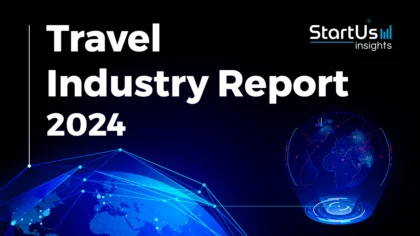
Travel 21 pages report
Mobility 22 pages report, railway 22 pages report, cleantech 19 pages report.
Leverage our unparalleled data advantage to quickly and easily find hidden gems among 4.7M+ startups, scaleups. Access the world's most comprehensive innovation intelligence and stay ahead with AI-powered precision.
Get in touch
Your Name Business Email Company How can we support you? (optional)
Business Email

Protected by reCAPTCHA and the Google Privacy Policy and Terms of Service apply.
- Product Intelligence
- Product Benchmark
- Marketing Intelligence
- Promotional Intelligence
- Case Studies
- Downloadable Reports
NEW Travel Apps Report 2023: Speed And Innovation in the Travel App Industry
We are excited to share Watchful’s new report, with new findings on how 15 of the biggest companies in the industry, including major airlines and OTAs (Online Travel Agents), are pushing their R&D and product efforts to remain competitive and meet or exceed traveler demands.
Apps analyzed for this new report include Expedia, Airbnb, KAYAK, Trip.com, Skyscanner, Trip Advisor, Hooper, Booking.com, American Airlines, British Airways, United Airlines, easyJet, Ryanair, and more. New products and features are launched, optimized, and tested every day. Our research team analyzed thousands of product changes across hundreds of apps versions over a 6-month period.
R&D has become the new battleground across the travel industry. Hence, industry leaders must gain a better understanding of their competitive landscape to refocus their R&D efforts in order to enhance the overall travel booking experience and meet or exceed traveler demands.
While carrying out this new research, we discovered dozens of a/b tests, new features, innovative marketing campaigns, UI iterations and many other insights across all the apps researched. In this report we will share a small sample of what we found, and a high level overview of the competitive landscape.
You can download a complimentary copy of the report here: Travel Apps: Competitive Intelligence Report 2023
We are proud to share this new report, and give you a glimpse into how quickly the industry is evolving, and provide you with a fresh perspective on some of the product-led strategies where the industry’s key players are betting on for their future growth.
Hungry for more insights? You can also check our blog where we shared the most interesting product features and updates from Travel Apps over Summer 2023.
Recommended Articles

2024 Mobile Megatrends: The Rise of Family Accounts

2024 Mobile Megatrends: Building & Upholding Trust in Apps

2024 Mobile Megatrends: The Rise of AI-Generated Tools
Winning Results

Travel apps’ 2023 stats and growth in five charts
Micah Motta, Senior Content Writer, Adjust, Aug 17, 2023.
In 2023 travel apps are anticipated to accrue an impressive US$1.23 billion in revenue. Despite the current economic downturn , people worldwide are not so far removed from the recent pandemic’s and intend to travel now that most restrictions and heavy border controls have been lifted in what has been dubbed “revenge travel”. Forbes reported that 49% of U.S. consumers plan to travel more in 2023.
We’ve examined the first half of 2023, and Adjust data confirms that travel apps are indeed experiencing growth. Dive into the latest 2023 travel app trends below.
1. Travel app installs take flight
We last reported that travel apps had made a big bounce back in 2021 and can now share that, according to Adjust data, they’ve since reached heights well above pre-pandemic levels, with the 2023 average so far 18% above the Q4 2019 average. Taking a closer look at more recent performance data, travel app installs are on the rise. In terms of growth, H1 2022 saw an increase of 8% year-over-year (YoY), and then H1 2023 enjoyed a YoY increase of 5%.

Pattern alert: June installs climb above the rest
June is an active month for travel app installs, often rising above the yearly average. Check out the following statistics on June installs from the past three years.
- June 2021 travel app installs were 7% above the yearly average.
- June 2022 travel app installs were 10% above the yearly average.
- June 2023 travel app installs were 11% above the H1 2023 average.
June also continues to be a star month in other trends and below, we’ll get into more on why that is.
2. Travel app sessions journey upward
Travel app users are logging more and more app sessions. Examining Adjust data for travel app sessions, we’ve noted that, like installs, they are well-above pre-pandemic levels, with current 2023 averages 87% higher than the Q4 2019 average. This impressive figure is the result of the consistent, steep and steady incline in session growth. The chart below shows the increase seen over the last two years, from June 2021 until June 2023. While session increases can often lead to a drop in session lengths, the good news for travel apps is that this volume has also come with a considerable uptick in engagement (more below).
Travel app sessions in 2022 saw a 14% YoY increase. Already, H1 2023 sessions are another 13% above 2022’s yearly average. Based on the trends charted since 2021, we anticipate this percentage will grow by the end of the year as it captures the latter part of the summer and holiday season travel plans.

Guess who it is? It’s June coming back for that session growth
Similar to the trend noted in installs, travel app sessions also enjoyed an increase during the month of June than the yearly average. And that increase has also grown YoY.
- June 2021 travel app sessions were 2% above the yearly average.
- June 2022 travel app sessions were 8% above the yearly average.
- June 2023 travel app sessions were 9% above the H1 2023 average.
Q: Why is June a popular month for travel app installs and sessions?
Today’s consumers are booking closer to their travel dates more frequently. It was recently reported that travelers are now starting to search online for a trip just five weeks before departure. And guess what? In a 2022 survey , July was the top month for a summer vacation in the U.S., followed by September, further supporting the high number of travel app installs and sessions in the preparation month of June.
3. Travel app session lengths elongate in 2023
Further confirming that 2023 is a year of growth for travel apps, the boosts in installs and sessions have come with a welcome subsequent increase in session lengths YoY.

H1 2023 session lengths are up 13% YoY and an impressive 15% compared to the same period in 2021—representing an overall climb from 15.04 minutes per session to 17.23. That's more than two extra minutes total to engage your users.
2023 sees an uptick in sessions per user in travel apps
The year 2023 continues to outperform 2022 when we zoom in on the sessions per user per day in travel apps. So, it’s not just that the individual sessions are longer, users are logging more sessions total. This indicates that the overall increase in sessions can largely be attributed to multiple sessions per day from existing users, complemented by the sizable installs uptick, and resulting in an increase in retention. Basically, this is an extremely positive moment for travel apps.
When compared to the previous two quarters, Q1 2023 outshone them both in terms of app session frequency, as illustrated on the chart below.

Travel apps’ Day 1 sessions per user per day in Q1 2023 increased to a median of 1.6—up from 1.56 in Q2 2022. Day 7 saw an increase between the two quarters from 1.65 sessions to 1.70 sessions. Finally, Day 30 saw the greatest expansion in sessions per user per day, from 1.59 sessions to 1.67 sessions. This increase further speaks to the growing engagement users have with travel apps and marketers’ success in acquiring users that, when retained, are highly engaged.
5. Retention rates for travel apps flying high
Travel apps’ retention rates in Q1 2023 are up considerably YoY. Day 1 increased by an impressive six percentage points between the two quarters, climbing from 11% to 17%. While the gap slowly closed throughout the 30-day period, Day 30 for Q1 2023 still finished two percentage points higher than the preceding quarter.

While these rising figures are great, they still aren’t super high compared to some other app verticals. Depending on your app monetization model you’ll likely have different retention requirements needed. Either way, check out our guide: How to successfully keep users and grow your app for top retention tips.

Travel apps, here’s how to dominate H2 2023
Now that you have the latest travel app benchmarks, it’s time to plan your marketing strategy.
Focusing on the following growth areas can significantly improve your app marketing in the second half of 2023.
Seven areas of growth for travel apps
- Become a SKAN 4 expert for success in your iOS campaigns.
- Using TikTok, Snapchat, or CTV ads? Include view-through attribution .
- Master connected TV (CTV) to meet users where they are—streaming.
- Ensure you stay ahead of mobile ad fraud by proactively fighting it.
- Consider media mix modeling (MMM) to factor in seasonality.
- Prepare campaigns for the holiday travel season . (Last week of the year is critical.)
- Time campaigns differently for markets that have summer at the opposite time, like Indonesia and Australia.
For example, travel and lifestyle platform Traveloka partnered with Adjust and TikTok to tackle fraud. By using Adjust’s Fraud Prevention solution , the brand decreased fraudulent installs on TikTok by 2.5 times and doubled performance uplift. And that’s not all; Traveloka revealed that since partnering with Adjust, its marketing efficiency has increased by 80%.
So, care to follow in Traveloka’s footsteps to grow your app marketing in 2023 with accurate, cross-channel measurement and protection against fraud? Request your personalized demo of Adjust now!
Be the first to know. Subscribe for monthly app insights.
Keep reading
Quick links
- Request a demo
- ROI Measurement
- Fraud Prevention
- PC & Console
- Incrementality
- Security and privacy
- Partner marketplace
- Success stories
- Adjust Help Center
© 2024 Adjust GmbH. All rights reserved

Preview: Travel Innovation and Technology Trends 2023
A preview of the most significant innovation trends in travel technology and distribution for 2023.
By Phocuswright Research

Introduction
As the world fully reopens in the wake of the COVID-19 pandemic, the travel industry can once again focus its attention squarely on the future. While significant challenges remain (i.e., inflation, recession, staffing, international conflict), it’s a good time to place strategy and competitive edge-building at the forefront.
Each year, Phocuswright's expert analysts identify the technology and innovation trends that will influence travel significantly in the coming year and beyond. This year, we’re exploring the growing roles of social media and Web3 in travel, addressing the realities of sustainability and our fragmented technology landscape, and pondering the impact of the next game-changing technologies like generative AI and eVTOLs.
This overview article is a preview of the full report , which features brief introductions to the eight trends that we will cover in the coming months. Stay tuned for each full trend analysis, and for details on a late spring/early summer webinar in which we’ll discuss these trends live.
The Future of Social Media, Influencers and Social Commerce in Travel
Web3 is proving itself in travel .
- Green Travel Innovation Now (Yes, Now!)
Selling Travel Is Hot Again – Even If You’re Not a Travel Company
Glimpsing the future: chatgpt, generative ai and travel .
- Regime Change in Digital Hotel Operations
- eVTOLs in Travel: Viable Addition or Flights of Fancy?
Super Apps’ Secret Sauce
By Robert Cole
Efficient direct-to-consumer marketing has been the goal of travel industry marketers since the dawn of the internet. Intermediaries may create value by cost effectively expanding brand reach, but they rarely enhance the brand-customer relationship in a manner superior to the brand itself.
According to one projection, U.S. social commerce surpassed $45 billion in 2022 and will reach nearly $80 billion in 2025, growing its share of total e-commerce sales to 5.2%.
Social commerce – in which merchants sell products directly through social media platforms without involving another e-commerce environment – is a key strategy for direct consumer engagement. According to one projection, U.S. social commerce surpassed $45 billion in 2022 and will reach nearly $80 billion in 2025, growing its share of total e-commerce sales to 5.2%.
The forthcoming report will focus on:
- How influencer-driven social commerce differs from traditional paid advertising
- Sponsorship and affiliate marketing methods typically employed throughout the social media landscape
- Influencer communities
The future of influencer-driven social commerce represents a significant opportunity for a travel industry striving to develop direct distribution channels, nurture loyalty and improve marketing efficiency.
Image captions

By Norm Rose
After years of hype surrounding blockchain and Web3 technologies, 2023 promises to be the year when Web3 starts providing measurable value to the travel industry. This is both a revolutionary and evolutionary change that will eventually impact all players in the travel ecosystem.
- Separating the hype from true business impact
- Reviewing the landscape
- Adopting Web3 across the industry
- A closer look at the Web3 startup space and innovative companies, highlighting their unique contributions to the space
- An evaluation of how traditional industry players are viewing Web3 technologies, with an eye to understanding how the mainstream travel industry will adopt Web3
- A review of multiple sectors of the industry, including air and hotel distribution, short-term vacation rentals, ride sharing, payment, settlement, social travel and loyalty
The focus will be less on these companies’ future capabilities, and instead evaluate the real-world impact these companies have today.
Green Travel Innovation Now (Yes, Now!)
By Cathy Schetzina Walsh
Facing mounting pressure to enact measurable change, travel companies must move beyond greenwashing and halfhearted environmental efforts.
The industry can either accept the challenge to make real change and become more sustainable via innovation – or be forced to do so via crises, regulation and traveler demand.
- Several new initiatives launched by travel companies and destinations
- How individual travel companies are shifting towards renewable energy sources
- How travelers – particularly younger travelers – increasingly consider environmental impact when making travel plans
Travel companies must innovate now to establish green infrastructure, leverage data and influence traveler behavior to shift the industry towards green energy sources and preserve tourism for future generations. There are many challenges along this path. Stay tuned for more on what’s realistic, what’s not and what needs to happen to effect meaningful change.

By Lorraine Sileo
Non-travel brands, such as financial institutions, retailers and loyalty clubs must really want to get into the travel business. Over the past 18 months, several have launched travel booking platforms or announced ambitious plans to do so, even though the online travel agency market is already consolidated and highly competitive. Will they succeed? If so, what are their advantages and what will be the impact on the marketplace?
If travel is best left to the big travel portals, then why are so many other entities jumping in?

If travel is best left to the big travel portals, then why are so many other entities jumping in? First, it’s easy to resell travel, considering the plug-and-play options offered by Expedia for Business, Rocket Travel (Booking.com), Hopper Cloud and others. And though non-travel brands’ travel gross bookings are tiny (earned commissions), the benefits can be big in terms of generating value and customer loyalty (e.g., Costco Travel, BJ’s Travel, AARP Travel Center).
- How these developments put a whole new spin on online travel – creating pockets of loyalty across myriad brands
- How they compare to giant OTAs
- How they signal a shift in consumer behavior
“The travel industry can use generative AI in a variety of ways …” At least according to ChatGPT , the free chatbot from OpenAI that made its public debut in November 2022 (see figure below). Since its launch, ChatGPT has attracted massive attention as the world gets a taste of AI’s creative potential. But while the technology does have applications for travel, it comes with a number of challenges that must be addressed before generative AI can have a substantial impact on the industry.

- Why generative AI is an area that travel companies should follow closely
- Why ChatGPT marks a substantial step forward
- Speed of advancement and potential pitfalls

Regime Change in Digital Hotel Operations
By Adam Glickman, VP Brand Strategy, Actabl and Dmitry Koltunov, Co-founder, ALICE
Hoteliers have typically looked at past performance and results to help forecast the future. They painstakingly analyze historical data to develop budgets, plans and goals. It’s been quite a simple approach, really: look back to compare in order to look forward and plan.
Real-time data is the “beating heart” that forward-looking plans flow through, and which allows hoteliers to maximize profits while optimizing guest experiences.

But as we move on from COVID and “revenge travel” and adapt to changing travel patterns for business, leisure and group, it’s time to consider a new approach in the context of labor shortages and inflationary pressures. It is essential to develop a strategy that puts real-time data analysis at the core of a plan to manage the business. Real-time data is the “beating heart” that forward-looking plans flow through, and which allows hoteliers to maximize profits while optimizing guest experiences.
- Several novel data-centric approaches to optimize operating performance in new and powerful ways
- Forward-looking demand data that can help enable precise scheduling and staffing
- How sales pace and sales leader performance data can uncover market-wide trends and individual performance management opportunities
- Identifying operational functions that can be automated, freeing up team members to deliver more personalized services to more guests
- Predicting new ancillary revenue sources by evaluating changing guest behavior patterns for each market where hotels operate
- Reviewing target Hours of labor Per Occupied Room (HPOR) for various segments and providing recommendations for using benchmarks to forecast labor costs
EVTOLs in Travel: Viable Addition or Flights of Fancy?
By: Hollis Thomases
EVTOLs, the acronym for Electric Vertical Take Off and Landing aircraft (pronounced “ee-vee-tolls”), have been in development for over a decade. Heralded as a greener solution to fossil fuel-powered short-haul planes, helicopters and roadway-clogging cars, eVTOLs will likely service intracity and city-to-city travel. The ecosystem is commonly referred to as Urban Air Mobility (UAM) or Urban Air Transportation (UAT).
While the applications of eVTOLs are broad and have previously been categorized into areas such as cargo, emergency medical or inspections, Phocuswright’s forthcoming analysis will focus on passenger transportation.
In the past 18 months, United, American, Virgin Atlantic and Delta have each invested in and/or made deal commitments to one or more eVTOL companies.
- Addressing carbon emissions and climate change
- Collaboration and access to data and technology
- Improving the passenger/travel experience
- Mindshare, relevancy and branding
- Broadening of accessible markets
To flourish, eVTOLs must overcome concerns regarding short-term hindrances. Some of these key pain points include safety issues, significant legal and governing issues, certification of vehicles and pilots, public perception and adoption, sustainability, and infrastructure constraints.

What do Google, Meta, Twitter, Hopper, Booking.com, PayPal and Uber have in common? All are Western companies with their sights on becoming super apps in the vein of Asia’s all-in-one mobile powerhouses. Apps like WeChat and AliPay in China, Grab (Singapore), PayTM (India), GoTo (Indonesia), Kakao (South Korea) and AirAsia (Malaysia) have all built addictive multi-service apps that dominate their respective markets.
While different market conditions from region to region are not replicable, there are strategic lessons to be learned from the apps themselves.

It remains to be seen whether companies can replicate the level of super app success seen in Asia Pacific (and more recently, in Africa and Latin America) in Western markets like the U.S. and Europe. But you don’t have to build a full-fledged unicorn super app to capture some of the benefits that have made these platforms an essential part of daily life for Asian consumers.
While different market conditions from region to region are not replicable, there are strategic lessons to be learned from the apps themselves:
- Multiple services
- Daily usage
- Social networking
- Gamification
- What can be learned from successful super apps to make travel offerings stickier and more appealing
- Whether a travel company aspires to super app status or not
The overview article features full introductions to the eight trends that we will cover in the coming months.
Watch the online event that covered each trend, presented by Phocuswright analysts:

WEEKLY RESEARCH INSIGHTS
We dig deep to give you the data and trends that drive the travel, tourism and hospitality industry.
Get the latest in travel industry highlights with our free weekly research articles and more. Sign up to get the latest delivered directly to your inbox.
FOR MORE INSIGHTS
See all of Phocuswright's free research insights here .
Sign up to get the latest delivered directly to your inbox.
Open Access Research Subscription
Research is our priority. Our Open Access research subscription puts the world’s most comprehensive library of travel research and data visualization at your fingertips.
Clients have relied on Phocuswright's deep industry knowledge for over 25 years to power great decisions, help justify a pitch, build a strategic plan and elevate any presentation through trusted research and data. When companies and executives reference Phocuswright, they gain the trust of an industry keen on data, trends and analytics.
See the full benefits of an Open Access subscription here .
Travel Apps: Top 7 Trends to Watch in 2024

Travel. Together with Dating, Food & Drinks, it’s one of the three categories of mobile apps designed to make you go out, explore, and meet people. Technically, we could include Weather here, but apps from this category may sometimes have the opposite effect ;)
The category is as diverse as the travel industry itself. Mobile apps are offered by independent publishers, hotel networks, travel agencies, airlines, coach operators, and many other tourism companies. However, the functionality of apps from this category can be roughly divided into these areas:
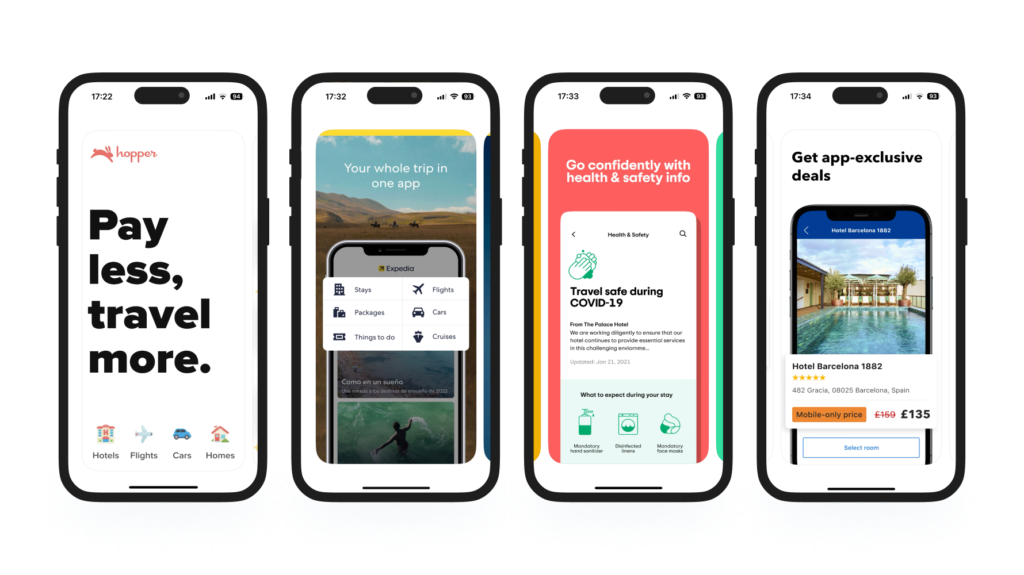
Booking, planning & preparation: from booking of hotel rooms (or any other type of accommodation), and tickets for planes, trains, and boats, to compiling must-see lists of local attractions. You may also add a handful of useful tools for exploring the outside world (like currency calculators and local safety information). Apps like Booking.com, Tripadvisor, Expedia, AirBnB and a multitude of others will either enable you to feel like a local, moving safely and efficiently around with accommodation and other necessities secured… or grab a last-minute deal and just take the most out of life (Carpe Diem ;) ).
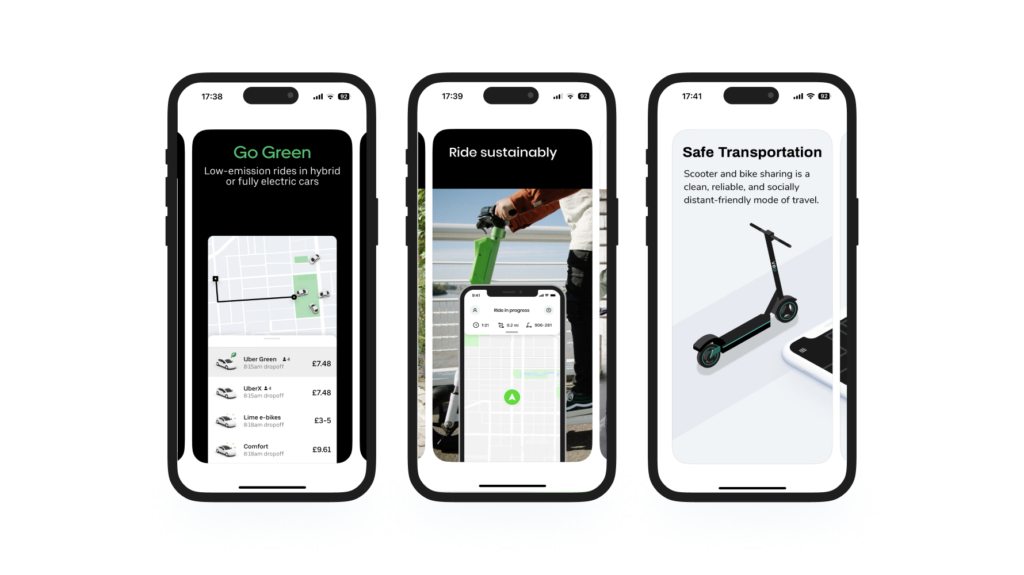
Getting you from point A to point B: from public transport assistance to electric scooters, bikes, car rentals, or ride-hailing – apps like Uber, Lyft, BlaBla Car, Bird, and Lime will make sure you get to your destination quickly & safely (provided you wear a helmet). Though crucial to the local populace, one can’t deny the importance of these apps for tourists. Just take a walk through your city in the summer and count all the people with backpacks and belt sachets moving around on city bikes and scooters (or being parked outside any recognized sightseeing point).
At first, these functionalities may seem far apart, but they have one thing in common: travel apps make the outside world easier to navigate and more pleasant to experience. This has colossal implications for the condition of the category and key industry trends impacting mobile apps from this category.
Digital transformation and the dominance of mobile apps disrupted the tourism industry and how we move around. Now, the travel business and mobile apps can’t exist without each other.
Travel Industry Statistics: 2024
It’s impossible to discuss the future of the category without the real-world context. The economy, inflation, travel restrictions, and local safety precautions have a tremendous impact on the condition and adoption of mobile apps for traveling and transportation.
The Travel category of apps is tied closely to life in the real world and influenced by external factors beyond their control more than other categories.
Let’s look back at 2023 first: with few exceptions (China being a notable example, still implementing strict policies at the end of the year), most countries lifted any remaining travel restrictions related to the Covid-10 pandemic. Throughout the year, we got our freedom back and Travel apps took notice.
In financial terms, the outlook for Travel apps in 2024 is positive: according to Statista Digital Market Outlook, revenue generated from travel apps worldwide is expected to rise steadily in the following years, reaching over 533 million U.S. dollars in 2027. Read more about the financial outlook of the Travel app market on Statista.com .
This is even though travel expenses & recreation are among the first to be cut in case of tightening budgets. High costs of living and inflation will be an important factor in shaping the market in 2024. Skyscanner’s travel trends report for 2024 released at the end of 2023 confirms what’s logical in such circumstances: those of us with just enough funds to go anywhere will seek to make more informed decisions when it comes to spending . For many, traveling will become price-driven. Just take a look at the industry’s top booking app Hopper (number #2 in the Travel category on the App Store).
However, this still leaves a sizable population of customers with money and time (or in many cases – just time) at their hands to seek some truly unique, life-changing experiences.
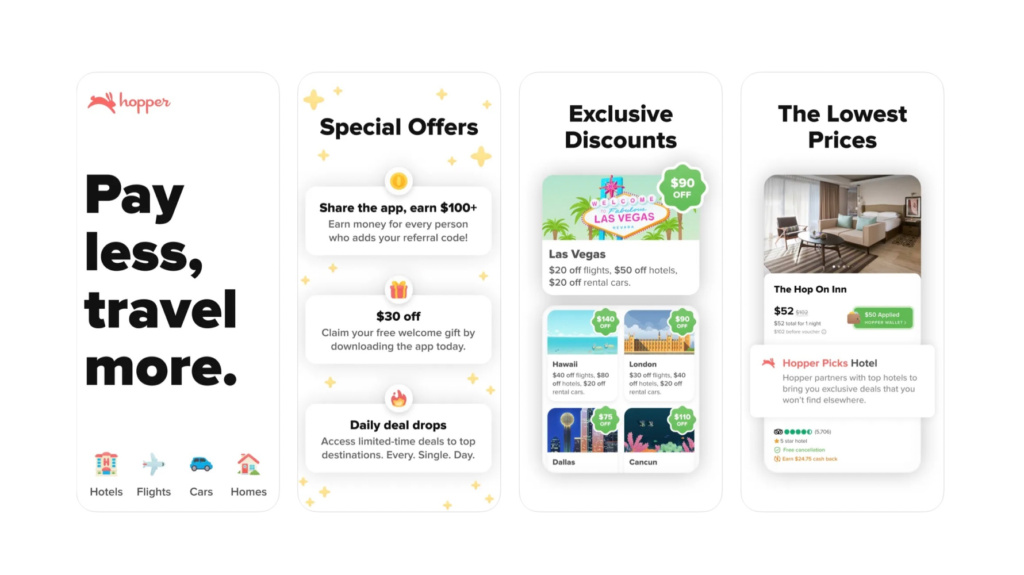
How does the world of economy and politics shape the attitudes and mindsets of travelers? Travel Predictions 2024 , the most recent report released by Booking.com gives us many insights into the minds of travelers.
First of all, it showcases how significant unique experiences have become. According to the report, more than half of travelers are willing to stray off the beaten path and move forward without a plan, adapting to the situation as they go . What’s more 52% of travelers want to book trips where the destination remains a mystery until they arrive.
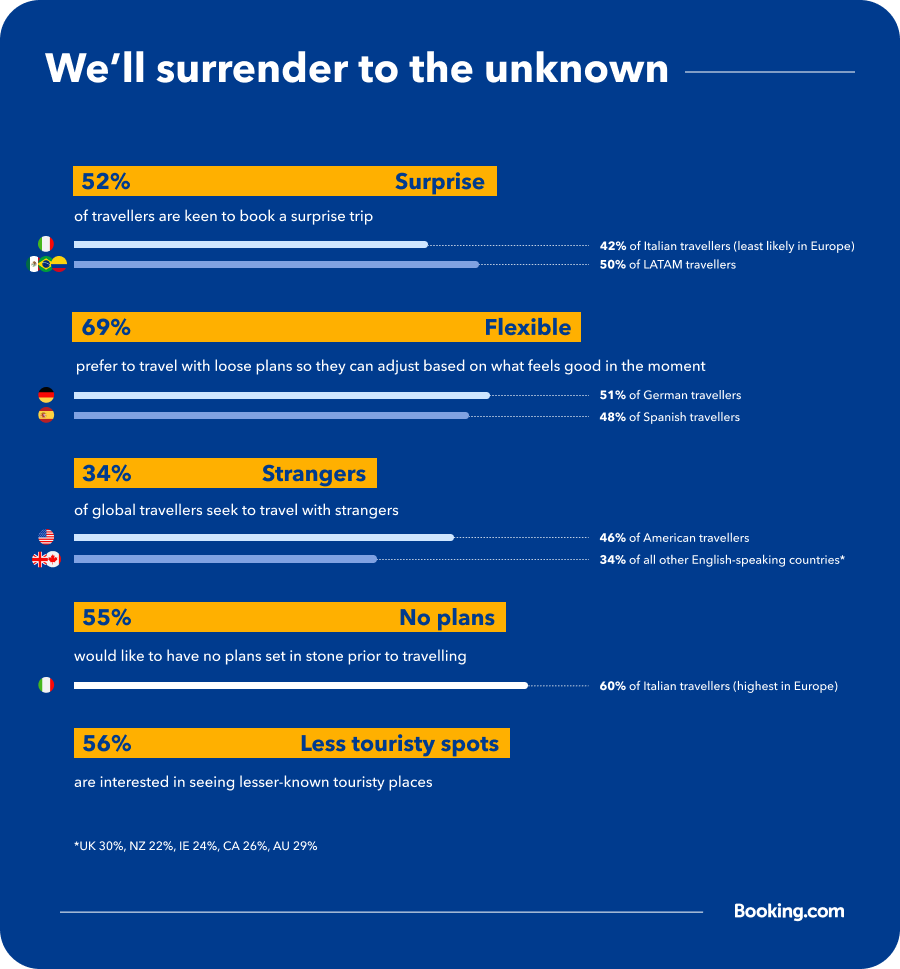
Booking.com predicts that AI is set to become a mainstream feature of travel next year. AI indeed seems like the only viable technology to deliver the necessary level of personalization at scale, as it’s capable of giving general advice to those seeking inspiration and providing precise destinations to those who made up their minds.
AI will also be able to handle the increasing scope of travelers’ interests and concerns. For example, they will be even more conscious about the environmental impact and safety of their experiences. This is evidenced in apps’ messaging shown before in this article and confirmed by data from the report that states that travelers do want to make eco-friendly decisions and expect app rewards for making them (by 60% of studied respondents).
Other subcategories of apps from the Travel category are also affected by external factors. Tightening budgets and high gas prices encourage car sharing. Lower car ownership among millennials may boost car-hailing and car-sharing services, according to a report by Reportlinker .
The growth of apps for renting electric bikes & scooters is the direct result of cities being overcrowded and difficult to move through. These services can provide alternative transportation to those living on a tight budget.
What is the main takeaway from all this data? Flexibility, responsiveness, and personalization will be key to handling the rising population of cost-conscious customers who at the same time seek something new, different, and unique.
These market factors and realities directly affect the trends for apps from this category that we think will dominate app development and creative direction in 2024.
AI will emerge as the absolute key component of Travel mobile apps in 2024. The report by Booking.com highlights this: solo travel is booming, with 59% of respondents looking to venture alone…
…only if we don’t count that artificial friend in their pockets ;).
Travel Apps Apple Search Ads Search Results Benchmarks
Here’s our perspective of a company whose ecosystem of services helps mobile apps grow, acquire users, and optimize their online presence. The infographic below reflects the condition of the category and indirectly confirms what’s been said about the travel industry in general:
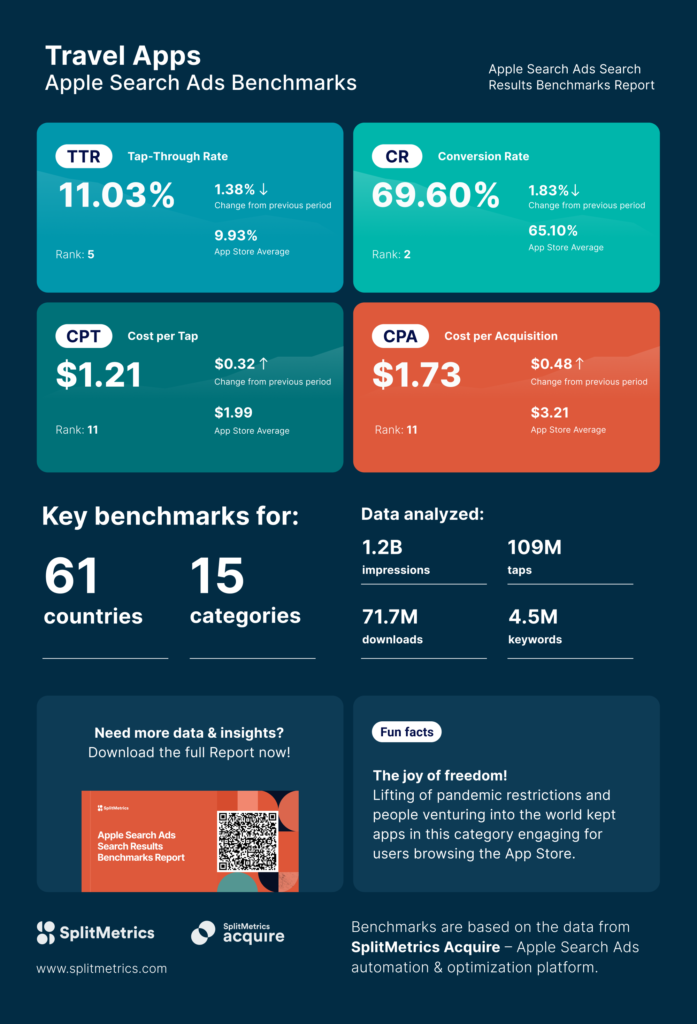
There are reasons to be optimistic about the outlook for travel apps, but we must keep in mind that a lot depends on their ability to deliver a seamless experience that truly helps to navigate the real world. Travel apps enjoy an average high conversion rate on the App Store, meaning that people are willing to experiment with new services. At the same time, costs of user acquisition (in terms of taps and installs) aren’t the highest when compared to other categories (although they are rising from their pandemic decline).
To summarize: our data indicates a good general outlook and that the time to act is now. Take our predictions for travel apps and make 2023 the best year so far!

Do you like the data you see for travel apps on the infographic? Download the full report and see much more! We’ve analyzed over 4.5M keywords, 1.2B impressions, 109M taps, and 71.7M downloads to give you Apple Search Ads paid search results benchmarks for 15 categories and 61 markets.
Marketing budgets are among the first expenses to be cut in the face of market uncertainty and rising costs of business operations. Apple Search Ads search results benchmarks are therefore a good indicator of what’s to be expected in a given market. What we see fills us with optimism, but as evidenced by travel app market trends – growth will require the full embrace of paid user acquisition and app store optimization efforts.

Find out how Flyin.com reduced their cost per acquisition by 15% with SplitMetrics Acquire. Flyin.com is the first and only “Online Travel Agency” in the Middle East that offers integrated travel services and helps create the best possible trip for over 50,000 travelers daily.
Read the case study on our blog
Travel App Market Trends
Taking into account the unique functionalities of travel apps, market conditions, and outlook for 2023 as well as our own data, we picked these trends to look out for and react to.
Trend 1: The domination of personalized offers…
Better personalization of offers & user experience is key to handling a diverse, segmented market. Customers want such offers and they are willing to pay for them.
Hunters want access to exclusive and quick deals. Planners expect a streamlined and seamless experience. Those with resources will want to be sure that all their needs are met. Those cost-conscious will cherish the ability to fully control their expenses.
Do two separate groups of users want different things from the same app? Read the case study of tonestro to see how they handled this issue with the help of custom product pages.
Only sophisticated algorithms are capable of delivering such perfectly tailored offers to the individual preferences of users. Good analytics & first party data acquisition will be absolutely essential, especially given the rise of the second major trend among mobile app users…
Trend 2: …and focus on first-party data
Fun fact: users desire those personalized offers but don’t want to share the data necessary to create them. This is a problem not only for travel apps but online marketing in general.
There’s only one safe option out of this predicament: a company has to rely on its data in crafting its user experience and offers. To do that, you need a strategy and focus on user experience. If the value proposition is perfectly clear and a certain level of transparency is reached, the chances of the algorithm picking relevant offers are much higher.
You need to have a good first data acquisition strategy, to ask just for the right amount of data necessary to deliver that seamless and fitting experience. Great user experience is key to achieving this.
Trend 3: Subscriptions will become more important
Traveling is a way of life and by definition, every subcategory of travel apps is designed with long-term and possibly frequent use in mind. For those who are truly willing and have the resources to embrace this lifestyle, a premium plan or a subscription model is a viable option. Results, various data and reports by eDreams ODIGEO (one of the world’s largest online travel companies) and its prime subscription program are a fine example of this trend. Hopper, the very successful app mentioned before, is launching a premium subscription too, offering a wide range of benefits for 9.99% a month in the foreseeable future.
With an optimistic outlook and declarations of keeping the same level or increasing travel, it’s viable for apps to introduce premium subscription plans. Any app in fact, meant to be used daily has the potential for subscriptions as a monetization strategy.
Whether this means getting rid of ads to smoothen the overall experience and efficiency of planning & booking or exclusive access to timed offers – we expect subscription plans will become more prominent in the category.
Trend 4: Awards, points will incentivize and build loyalty more often
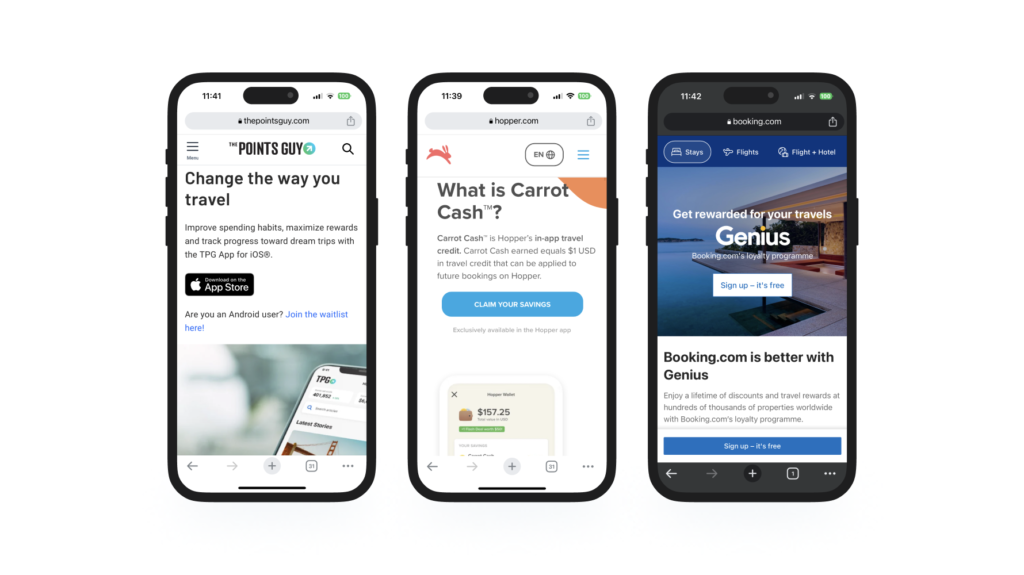
Hopper has Hopper Wallet for Carrot Cash, TPG App implements a points system (TPG stands for The Points Guy), Booking.com has a loyalty program called Genius, Uber uses rewards (for both rides & those ordering them), Expedia introduced them in 2022… and so on. Airbnb comes to mind as one of the few travel apps without some form of a loyalty program or a subscription strategy (as of now at least).
Most apps & travel services have loyalty programs, but there’s always room for improvement, as calls for personalized experiences put attention to varying expectations of target demographics.
Carrots, points, rewards… options are plentiful. Remember, that many customers are looking for more than transactional benefits.
Given this data, a good algorithm able to predict and deliver a perfectly tailored offer can do wonders for the app’s revenue.
Trend 5: Super Apps will rise to power
We mentioned this trend already in our article on Mobile Trends . Here’s a brief reminder of what Super Apps are:
Super Apps is a term for large mobile applications that integrate multiple functionalities, thus replacing several smaller, separate apps.
From a technical perspective, a super app may be a collection of several mini-apps hiding behind a robust and (hopefully) frequently customizable interface, allowing for the accomplishment of a multitude of diverse tasks.
Seamless experience is the goal and by very definition, Super Apps are designed to accomplish that. From planning & preparation, to getting you to the place with comfortable navigation, to taking care of all the payments. Mobile payments, mobile wallets are key among all the features new apps need to introduce.
Given all the economic factors and user preferences, Super Apps seem like a natural direction for travel apps to evolve into.
Trend 6: Artificial Intelligence will & should help
Artificial intelligence is the only technology capable of delivering mass personalization and handling the scope of conversations demanded by travelers today. No human-powered help center will be capable of conducting countless conversations, with topics ranging from sustainability to authenticity of local dishes – and those overlooked by many so far. No wonder that more mobile apps are investing in this technology.
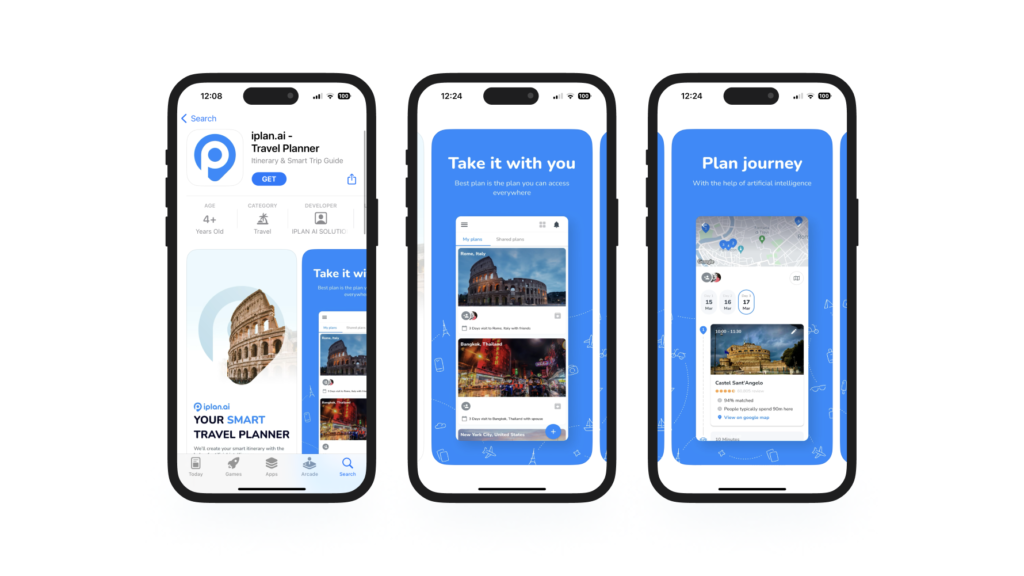
Even more AI-based and optimized for travel companies solutions keep popping up. The technology is becoming more available for businesses of varying sizes. With limited manpower and an ever-increasing pressure on personalization, a robot might be the only viable option for providing a smooth and less stressful user experience.

There is nothing more disruptive than AI right now — even in mobile marketing. Regardless of how you feel about AI, it’s wise to know its strengths and weaknesses. Read about them in our article “ Mobile Marketing Meets AI: New Possibilities with ChatGPT ”.
Trend 7: Progressive Web Apps will help in disrupting the market
Mobile apps truly disrupted the historically desktop-oriented travel industry. We indeed see constant growth of mobile apps and their evolution into Super Apps is very likely.
Progressive web apps use your browser and web technologies to deliver an app-like experience to users of websites. Visitors can place a shortcut to the website on their desktop and use it like an app later – even in offline mode.
From a user’s perspective, it’s a great solution to poor internet connectivity – a common problem of people traveling abroad and relying on mobile data transfers.
From a travel company’s perspective, progressive web apps can be a viable alternative to native apps. This may be the case for travel companies whose services aren’t used regularly enough to warrant an investment in a full-blown app, as well as those businesses with established websites enjoying large traffic.
As a result, it’s no surprise that progressive web apps are present in Asian markets. Brands such as Trivago accomplished fantastic results with its PWA (as observed by Google ). For some, a progressive web app may be a transitional solution, as users may ultimately shift to a native app, thanks to well thought out loyalty programs, subscription models and proliferation of higher end smartphones (as of 2023, Trivago has a successful native app on the App Store).
Nevertheless, progressive web apps are a thing to keep your eye on. It’s a tech with the potential to cause some market disruption by smaller businesses. There’s an interesting case of MakeMyTrip implementing this tech (keep in mind that they also have a prominent app on the App Store).
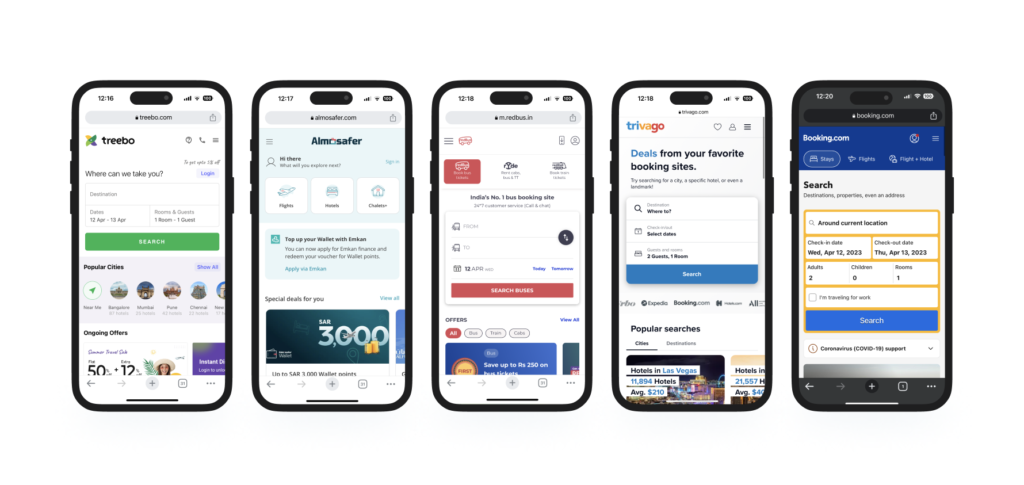
Many new powerful brands are mobile-only and mobile apps are their primary means of doing business. Progressive Web Apps are a tech that can be a milestone for a company, not abandoning its roots and acquired customer base. Simply put, progressive web apps are a low-cost evolution of mobile websites.
The bottom line and ASO & UA strategy implications for travel apps
The trends we picked are worth keeping an eye on not only because of their potential for development or setting of new business objectives but of their direct and immediate impact on travel apps user acquisition and marketing strategies.
Personalization of experiences, new important features, and strikingly different preferences among customers show how important certain mobile marketing solutions and tools will inevitably be for travel apps in 2023.
The importance of personalization and gathering of first-party information on the app’s target audience highlights the role of A/B testing as a key tool in evaluating what features attract new users best and what drives the decisions of various target groups.

Another key tool of user acquisition and personalization are custom product pages. You can use them to highlight specific features of your app, test different value propositions and introduce seasonal campaigns or re-engage your audience.
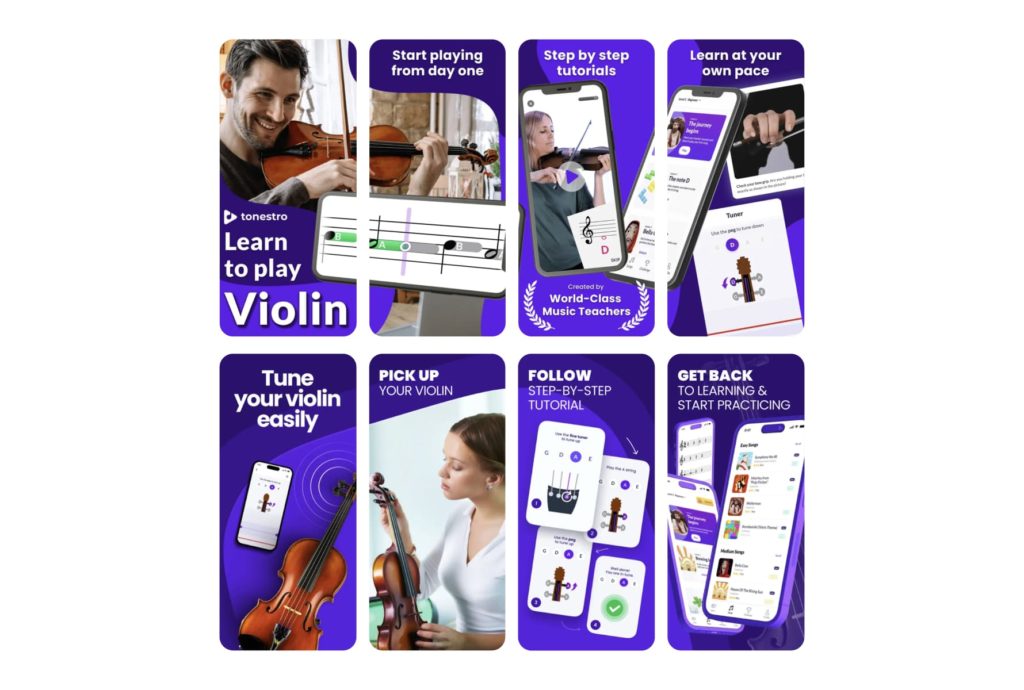
Relying solely on appropriate creatives you can effectively segment your audience (by testing their reaction to them). Using your icons, screenshots, and other elements you can conduct demographic, psychographic, geographical, behavioral, and even needs-based or value-based segmentation.
Custom product pages can also help you optimize your ads for specific markets, taking into account mentality and cultural differences. A surely important aspect of apps from the travel category.
To finally wrap up: personalized offers, new monetization plans, new functions, and means of engaging users… if that doesn’t mark 2023 the year of app store optimization, custom product pages, and A/B testing and validation then we seriously don’t know what will ????
Either way, we’re ready to immediately help you take immediate action to take the most out of 2023.

We use cookies to improve your website experience and sustain important functionality.
Press Accept if you agree with the use of cookies for the purposes described in our Privacy Policy and Cookie Policy

- Flutter App
- Android App
- iBeacon App
- Wearable App
- Health & Fitness
- Education App Development
- Utility App
- Real Estate App
- Business App
- WooCommerce
- WordPress Plugin
- Magento Extension
- Vtiger Extension
Salesforce CRM
- MVC CRM Development
- Our Mission
- Food & Restaurant
- Healthcare & Medical
Recruitment
- Real Estate & Property
Taxi Booking
On-demand solutions.
- Education & eLearning
- Events & Tickets
- Case Studies
Web Development
Mobile app development, enterprise app development, cms & ecommerce, creative branding, plugin & extension.

Industries We Serve
Food & restaurant, hotel booking, healthcare & medical, travel & hospitality, real estate & property, education & elearning, events & tickets, media & entertainment, the future of travel app development: latest trends and innovations.
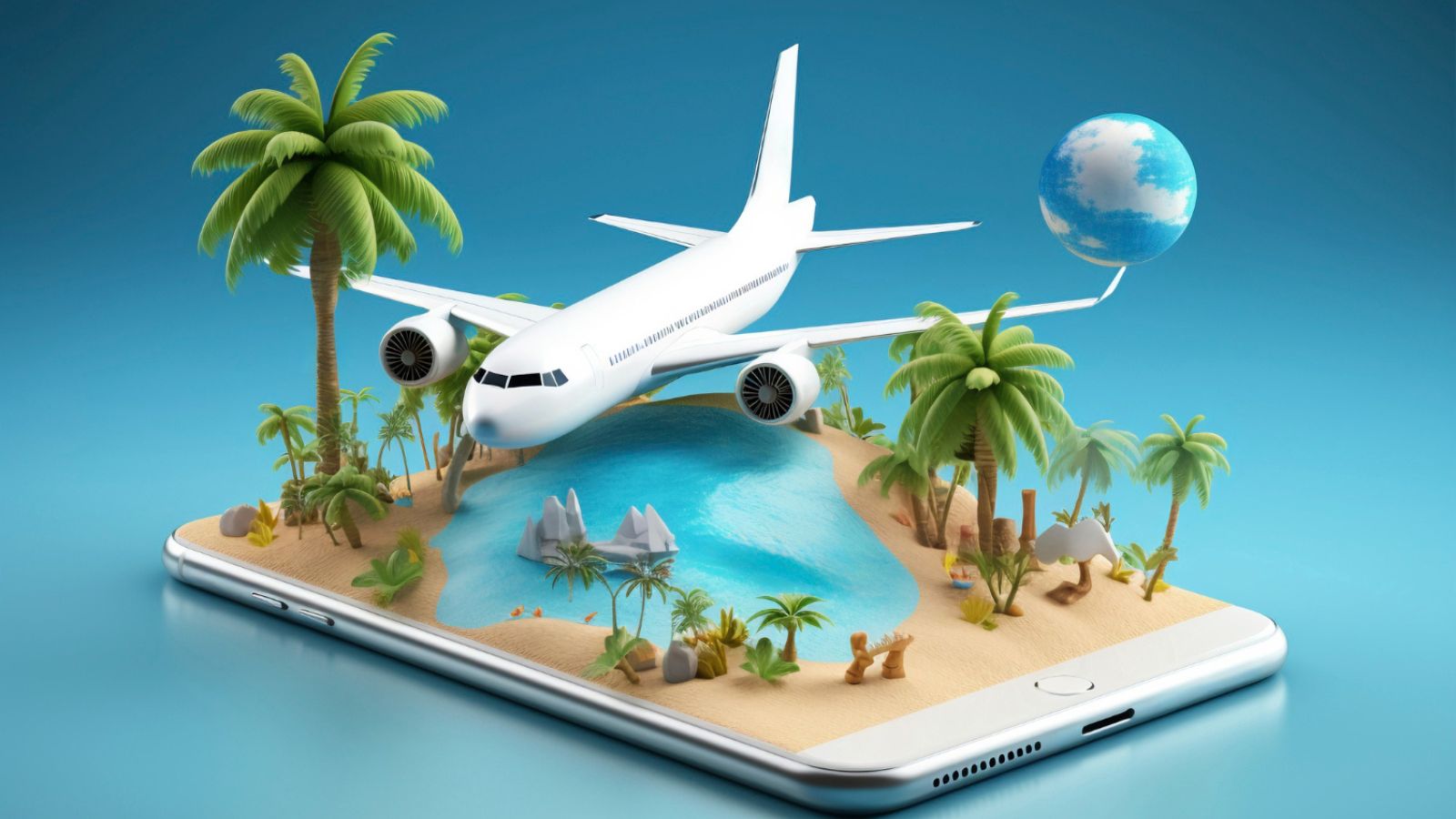
The future of travel app development promises to redefine the way we explore the world, offering smarter, more personalized, and seamless experiences tailored to individual adventurers. The travel industry has undergone a remarkable transformation with the advent of travel apps. From booking flights to discovering local attractions, these applications have become an integral part of our journey. As we step into the future, it's essential to explore the latest trends and innovations shaping the future of travel app development. In a world that never stops moving, travel remains a constant companion. Whether it's a spontaneous weekend getaway or a meticulously planned international adventure, technology has become an integral part of our travel experiences. The evolution of travel apps has been nothing short of revolutionary, and as we step into the future, the landscape is set to transform even further.
1. Immersive Augmented Reality (AR) Experiences :
Changing the way we explore.
Augmented Reality has transcended its novelty phase and is now poised to redefine how we experience travel. Imagine walking through ancient ruins with a travel app that overlays historical information on your screen. This immersive experience allows travelers to engage with their surroundings on a whole new level, turning a simple trip into a journey through time and space.
2. Artificial Intelligence (AI) for Personalized Recommendations :
Your personal travel assistant.
Artificial Intelligence (AI) has become the driving force behind personalized travel experiences. Advanced algorithms analyze user preferences, travel history, and even social media activity to offer tailor-made recommendations. From suggesting offbeat destinations to curating personalized itineraries, AI-powered travel apps are transforming the way we plan and enjoy our trips.
3. Blockchain for Secure Transactions and Identity Verification :
Redefining security in travel.
Security has always been a concern in the travel industry, especially when it comes to transactions and identity verification. Blockchain technology is emerging as a solution to address these concerns. With decentralized and secure systems, travelers can enjoy a seamless and trustworthy experience, from booking flights to checking into hotels, without compromising their sensitive information.
4. Integration of Internet of Things (IoT) in Travel :
Smart travel ecosystem.
The Internet of Things(IoT) is extending its reach to the travel sector, creating a smart travel ecosystem. Imagine a hotel room that adjusts its temperature and lighting based on your preferences as soon as you walk in. IoT-enabled luggage tracking and smart transportation systems are just a few examples of how interconnected devices are enhancing the overall travel experience. You can also read: How Much Does Travel App Development Cost?
5. Contactless Technology for a Safer Travel Environment :
Navigating the new normal.
The COVID-19 pandemic has accelerated the adoption of contactless technology in the travel industry. From contactless check-ins to touchless payments, travel apps are integrating features that prioritize safety and hygiene. This not only ensures a safer travel environment but also provides a more efficient and streamlined experience for travelers.
6. Voice Technology for Hands-Free Travel Assistance :
Conversational experiences.
Voice technology is making waves in the travel app landscape, offering hands-free assistance to travelers. Instead of navigating through screens, users can simply ask the app for information or perform actions using voice commands. This not only enhances accessibility for users with disabilities but also adds a layer of convenience for all travelers, allowing them to focus on the journey itself.
7. Collaboration with Local Communities for Authentic Experiences :
Beyond tourist hotspots.
Travellers are increasingly seeking authentic and immersive experiences beyond the usual tourist hotspots. Travel apps are responding by collaborating with local communities to offer unique insights and activities. From guided tours led by locals to curated dining experiences, these collaborations contribute to a more sustainable and community-driven approach to travel.
8. Sustainability Features for Eco-Friendly Travel :
Reducing the carbon footprint.
With environmental concerns taking center stage, travel apps are incorporating sustainability features. From providing information about Eco-friendly accommodations to suggesting low-impact transportation options, these apps empower travelers to make environmentally conscious choices. The future of travel is not just about the destination; it's also about the positive impact we can create along the way.
The future of travel app development is a dynamic landscape where technology continues to redefine our journey. From immersive AR experiences to AI-driven personalization, the travel industry is embracing innovation to offer more seamless, secure, and sustainable experiences. As we embark on this journey into the future, one thing is certain – the way we travel is undergoing a remarkable transformation, and travel apps are at the forefront of this evolution. Embrace the change, and let the adventures unfold with the touch of a screen. Whether you're envisioning a personalized adventure companion, an all-in-one travel platform, or an Eco-friendly exploration guide, we're here to turn your ideas into reality. Contact us or email us at [email protected] today, and let's craft the next generation of travel apps together. Our team of experts is eager to understand your vision, explore possibilities, and bring innovation to the palm of every traveller's hand.
Most Popular Post

Unleash your inner web developer in 2024! This comprehensive guide equips you with the essential web development tools and frameworks you NEED to know. Master front-end, back-end, and full-stack development with expert insights and clear explanations. Whether you're a beginner or seasoned pro, this guide empowers you to build stunning websites and apps faster and more efficiently.

Dominate the digital landscape in 2024! This excerpt unveils the hottest web design trends guaranteed to impress users and boost conversions. Dive deep into captivating micro-animations, immersive 3D experiences, and UX-focused design that prioritizes user engagement. Discover how to stay ahead of the curve and craft a website that stands out from the crowd. Get ready to unlock the secrets of future-proof web design with IIH Global!

Discover the average cost of a home cleaning services website design. Get a free quote today from IIH Global.
- Cost Estimation
- Digital Marketing
- Entrepreneurship
- Woocommerce
Quick Links
Request a free quote.
Get a free quote from our specialists on your project.
- AR in travel apps
- blockchain security in travel
- contactless technology for travel
- future of travel app development
- IoT integration in travel
- latest travel app development trends
- travel app development
Share :
Discover Your Ideas With Us
Take the lead with integrated innovation in your company using high-quality software. Contact us now to get started with your project.
OUR SERVICES
Trending tech, get in touch, recent post.

National Geographic content straight to your inbox—sign up for our popular newsletters here

5 pandemic tech innovations that will change travel forever
These digital innovations will make your next trip safer and more efficient. But will they invade your privacy?
In the 20 months since the COVID-19 pandemic began, technological innovations have gone from futuristic to familiar. These days it’s hard to be out in the world without encountering QR-coded menus or supplying digital vaccine passports.
As the tourism industry—which logged a billion fewer international arrivals in 2020 than 2019—sputters back to life, masks may begin to disappear, but many pandemic-era tech tools will continue to factor into your trips.
“Consumers will come to expect technologies that make them more confident about travel,” says Steve Shur, the president of the Travel Technology Association. “Some of these changes are here to stay.”
In fact, a 2021 Pew Research survey of 915 policy leaders, science researchers, and other experts predicts that, by 2025, our daily lives could be even more influenced by algorithms, remote work, and what some call “tele-everything.”
While novel interventions such as real-time translation devices and facial recognition passport control may make travel safer and more efficient, there are downsides, including concerns about privacy , data security, and biased technology. Here are some of the innovations that travelers will continue to see and use.
Virtual and augmented reality
When the pandemic shut down travel, museums and tourist destinations turned to augmented reality (AR) and virtual reality (VR) to create online exhibits and experiences. While some of these experiences are best seen with a VR headset, most can be enjoyed with just a computer or smartphone.
The Xplore Petra app launched in June 2020, allowing users to “visit” Jordan ’s most iconic archaeological site by projecting a scaled-down version of the ruins. Lights over Lapland, an Arctic travel company, launched a VR experience to show off the Northern Lights using VR headsets or computer screens.
( How virtual reality might change your next trip, even after COVID-19. )
Post-pandemic, VR and AR may enhance actual trips by adding experiences such as a simulated climb up the Matterhorn at Lucerne’s Swiss Museum of Transport . The Hunt Museum in Limerick, Ireland, has a VR attraction in which visitors immerse themselves in “ The Garden of Earthly Delights ,” a 500-year-old painting by Hieronymus Bosch.
The Museum of Natural History in Paris has an AR exhibit that brings visitors face to face with extinct animals in digital form. The National Museum of Singapore has an installation called “Story of the Forest,” where sightseers explore a virtual landscape comprised of almost 70 nature drawings from the museum collection. The Smithsonian Institution’s National Museum of Natural History , in Washington, D.C., has an app that uses AR to show what some of its animal skeletons would look like with skin and muscle over the bones, offering a new view of a collection dating back to the 1880s.
“VR is not going to replace travel and tourism. It is just going to enhance tourism,” says Anu Pillai, who runs the Digital Center of Excellence at Wipro, a technology company.
Crowd control
To help enforce social distancing, cities, airports, and museums tested or rolled out crowd-control technology including Singapore’s roaming, vaguely terrifying robots that announce people are too close together and signs indicating how large crowds are at airport gates . As throngs of travelers return to popular destinations, similar methods and devices may be implemented to prevent overtourism.

In Italy during the pandemic, Venice began tracking visitors using cameras designed to catch criminals. Post-pandemic, it plans to harness them to keep tourist numbers at manageable levels, perhaps in concert with the mayor’s proposal to add electronic gates at major entry points (cruise ship docks, train stations) that can be closed if the city gets overcrowded.
(These tech changes could make your next flight safer.)
“We know minute by minute how many people are passing and where they are going,” Simone Venturini, Venice’s top tourism official, told the New York Times . “We have total control of the city.”
Amsterdam , which also struggles with overtourism, tracks how visitors use Amsterdam’s City Card, a flat-fee pass to museums and public transport. Beach Check UK launched this summer with real-time information on how busy dozens of beaches are along the English coast, guiding travelers away from packed areas.
“Technology can be used to collect data in order to both make better decisions and communicate those decisions,” says Christopher Imbsen, director of sustainability at World Travel & Tourism Council.
UV-C cleaning
Hospitals have used UV-C light to disinfect and kill viruses for more than two decades. Now, indoor public spaces including airports, gyms, and movie theaters are adding UV-C to halt viral spread.
“UV-C is having its heyday right now,” says Peter Veloz, CEO of UltraViolet Devices, which makes UV disinfecting technology.

UV-C has germicidal properties that combat COVID-19 and other nasties, both in the air or on surfaces. Depending on the location, new UV-C installations go into HVACs, on escalator handrails, or through airports and planes via light-equipped robots that disinfect as they go.
If installed and operated correctly, a UV-C system can kill all sorts of bacteria and germs. Even seasonal flu bugs might be zapped before they spread. “COVID-19 could come and go, but what won't disappear are normal pathogens,” Veloz says.
QR codes at restaurants
In the early days of the pandemic, when transmission of the COVID-19 wasn’t yet well understood, restaurants hurried to provide QR codes. The little black boxes of pixelated dots and dashes could be scanned with a smart phone to bring up a menu, let you order from it, and then allow you to pay your bill, all with limited virus-spreading interactions with servers.
While earlier fears that people could catch the virus via menus and other surfaces have been disproven, the codes have proven convenient and will probably stick around, especially with late-pandemic worker shortages.
Such convenience might mean a trade off with privacy, however, since the little codes can potentially gather a large amount of information from users. Some QR programs just take a food order, but others mine data like a patron’s dining history, age, and gender. The restaurant could use that info to send them coupons or event invitations—or sell it to third parties.
“It’s an example of companies exploiting COVID-19 to extend tracking,” says Jay Stanley, a senior policy analyst at the ACLU. “Moving everything to mobile opens people to new ways of tracking and control.”
Travelers should know that QR codes can be hacked; you might scan one, place a dinner order, and wind up compromising your credit card instead. Stanley recommends treating QR codes just as you do links in unknown emails. Either use your phone to look up the restaurant’s menu on the internet or install a protective app like Kaspersky QR Scanner , which will give users a warning if the code isn’t safe.
Contact-tracing tools
Public health groups used contact tracing methods to identify and track down people who were potentially exposed to infectious diseases such as Zika and HIV, and offer counseling, screening, and treatment. These traditional tools were usually based on phone calls to ask individuals about who they were in contact with and to continue researching exposure. The pandemic pushed officials to scale up such efforts and implement new, higher-tech ones to track viral spread and provide information.
For instance, Apple and Google added contact-tracing functions to new smartphone software, allowing users to opt in and get alerts if they come into close contact with an infected person.
(If you must travel during a pandemic, here’s how to protect your health.)
“There’s been a strong recognition about the value of and the important role of contact tracing for infectious disease prevention and control,” says Elizabeth Ruebush, a senior analyst for infectious disease and immunization policy at the Association of State and Territorial Health Officials. “But we’ve never seen it implemented at the scale of COVID-19.”
Other technologies, such as automated texts, viral heat maps and even CCTV with facial recognition could help track other infectious illnesses or make us ready for the next pandemic.
Even with fancy new apps, however, phone calls and personal outreach will still be at the center of public health. “These tools are aimed to enhance, but not replace, traditional contact tracing,” Ruebush says.
COVID-19 has sped up our adoption of technology . The downside is that this may make it even harder to turn off smartphones while on vacation. Then again, wanderlust is now stronger than ever—and getting lost in the moment still hasn’t been harnessed by a digital code.
Jackie Snow is a Washington, D.C.-based writer specializing in travel and technology. Follow her on Instagram .
Related Topics
- INFORMATION TECHNOLOGY AND TELECOMMUNICATIONS
- SCIENCE AND TECHNOLOGY
You May Also Like
Digital mapmaking innovations are revolutionizing travel

New tools offer peace of mind for pandemic travel
Introducing nat geo kids book bundle.

The uncanny valley, explained: Why you might find AI creepy

How is your location data really tracked? You’d be surprised.

It’s harder than ever to identify a manipulated photo. Here’s where to start.

Would you travel by flying taxi? Here's everything you need to know

Jet lag doesn’t have to ruin your trip. Here’s what you can do
- Environment
- Paid Content
- Photography
History & Culture
- History & Culture
- History Magazine
- Mind, Body, Wonder
- Destination Guide
- Terms of Use
- Privacy Policy
- Your US State Privacy Rights
- Children's Online Privacy Policy
- Interest-Based Ads
- About Nielsen Measurement
- Do Not Sell or Share My Personal Information
- Nat Geo Home
- Attend a Live Event
- Book a Trip
- Inspire Your Kids
- Shop Nat Geo
- Visit the D.C. Museum
- Learn About Our Impact
- Support Our Mission
- Advertise With Us
- Customer Service
- Renew Subscription
- Manage Your Subscription
- Work at Nat Geo
- Sign Up for Our Newsletters
- Contribute to Protect the Planet
Copyright © 1996-2015 National Geographic Society Copyright © 2015-2024 National Geographic Partners, LLC. All rights reserved
- Today's news
- Reviews and deals
- Climate change
- 2024 election
- Fall allergies
- Health news
- Mental health
- Sexual health
- Family health
- So mini ways
- Unapologetically
- Buying guides
Entertainment
- How to Watch
- My Portfolio
- Latest News
- Stock Market
- Biden Economy
- Stocks: Most Actives
- Stocks: Gainers
- Stocks: Losers
- Trending Tickers
- World Indices
- US Treasury Bonds
- Top Mutual Funds
- Highest Open Interest
- Highest Implied Volatility
- Stock Comparison
- Advanced Charts
- Currency Converter
- Basic Materials
- Communication Services
- Consumer Cyclical
- Consumer Defensive
- Financial Services
- Industrials
- Real Estate
- Mutual Funds
- Credit Cards
- Balance Transfer Cards
- Cash-back Cards
- Rewards Cards
- Travel Cards
- Student Loans
- Personal Loans
- Car Insurance
- Morning Brief
- Market Domination
- Market Domination Overtime
- Asking for a Trend
- Opening Bid
- Stocks in Translation
- Lead This Way
- Good Buy or Goodbye?
- Fantasy football
- Pro Pick 'Em
- College Pick 'Em
- Fantasy baseball
- Fantasy hockey
- Fantasy basketball
- Download the app
- Daily fantasy
- Scores and schedules
- GameChannel
- World Baseball Classic
- Premier League
- CONCACAF League
- Champions League
- Motorsports
- Horse racing
- Newsletters
New on Yahoo
- Privacy Dashboard
Yahoo Finance
Travel apps industry report 2024: how travel and tourism companies are utilizing travel apps to drive revenues.
Dublin, June 04, 2024 (GLOBE NEWSWIRE) -- The "Thematic Intelligence: Travel Apps (2024)" report has been added to ResearchAndMarkets.com's offering. This report provides an overview of the impact travel apps has on the travel sector and seeks to understand some of the contributory factors. The key trends within this theme are split into three categories: consumer trends, enterprise trends, and industry trends. Several case studies are included to analyze the multiple ways countries and companies have responded to the impact of travel app's growth and what they are doing to grow with this market. The report analyzes the players impacted by this theme alongside the contributing trends, destination trends, unintended opportunities, and trends that have emerged as a result of travel apps. It then dives deep into an industry analysis, presenting several real-life case studies looking at how companies have responded to the impact of this theme on their operations. Recommendations are also offered for the travel sector, alongside a description of companies mentioned throughout. This report focus is on travel apps. Key Highlights
Globally, travelers are increasingly online and more mobile savvy than ever before. The online travel market value is expected to increase going forward, according to the analyst forecasts. By 2026, market value is projected to reach $662.63 billion (CAGR 2023-26: 7.98%) as travelers increasingly switch to online travel intermediaries over in-store travel agents.
According to the analyst's Q4 2023 Consumer Survey, 80% of global respondents stated that 'time saving' is either 'essential' or 'nice to have' when making a purchase and 83% of global respondents stated that 'convenience' is either 'essential' or 'nice to have' when making a purchasing choice.
Travel apps allow companies to offer a more convenient service, which often saves both time and money for consumers. When looking specifically at OTAs (online travel agencies), the most successful companies in this sub-sector give little reason for customers to shop elsewhere when purchasing the main services and products that create a domestic or international trip.
The number of consumers who access the internet via mobile devices is increasing across the globe. When assessing the increase in the number of mobile internet subscribers across G7 nations (an organization of the world's seven largest so called 'advanced' economies, and therefore important tourism source markets), all countries displayed healthy growth.
Key Report Features
Understand the current travel apps trends within the travel landscape today and how these will escalate in the near future.
Assess how travel and tourism companies such as tour operators, OTAs and DMOs are utilizing travel apps to drive revenues.
Acknowledge the potential pitfalls of using travel by understanding the social, cultural, and environmental effects on the destination.
Discover recommendations for businesses involved in travel apps.
The analyst's thematic research ecosystem is a single, integrated global research platform that provides an easy-to-use framework for tracking all themes across all companies in all sectors. It has a proven track record of identifying the important themes early, enabling companies to make the right investments ahead of the competition, and secure that all-important competitive advantage. All across the travel and tourism supply chain, now have an opportunity to capitalize on travel apps, and there are notable examples of this. Therefore, all should buy this report to fully understand how this theme will continue to be a key theme in the future travel landscape.
Company Coverage:
IHG Hotels & Resorts
Marriott Hotels & Resorts
Key Topics Covered:
Executive Summary
Thematic Briefing
Technology trends
Consumer trends
Industry trends
Industry Analysis:
Market size and growth forecasts
M&A trends
Venture financing trends
Patent trends
Company filing trends
Social media trends
Value Chain:
Intermediaries
Transportation
Destination
Travel services
Public companies
Private companies
Sector Scorecards:
Travel intermediaries sector scorecard
Rail and road sector scorecard
For more information about this report visit https://www.researchandmarkets.com/r/eu57gq
About ResearchAndMarkets.com ResearchAndMarkets.com is the world's leading source for international market research reports and market data. We provide you with the latest data on international and regional markets, key industries, the top companies, new products and the latest trends.

Service offerings, Customer Stories and Updates from Techliance
How Mobile Apps are transforming Travel Industry in 2024
Ever since the inception of the Internet, businesses all around the world have been transforming. This has become possible by leaving traditional ways behind and adopting the digital era. Similarly, everyone is aware that mobile apps are transforming travel industry during 2024.
Meanwhile, smartphones came into existence, and people have started embracing on-demand applications. There has been a sudden change in most of the industries across the globe. Travel industry is no exception from this revolution, and due to ever-growing demand for better services, companies need to adapt.
Nowadays, multi-billion-dollar travel companies are ruling the industry. However, even small businesses aren’t far behind them and starting to invest in on-demand applications. Speaking of 2024, more and more travel agencies are realizing that they are the future.
Today we are going to discuss with you the ways mobile apps are transforming travel industry amid 2024. We are bringing to you this content to explain the importance of mobile applications and development for travel and tourism.
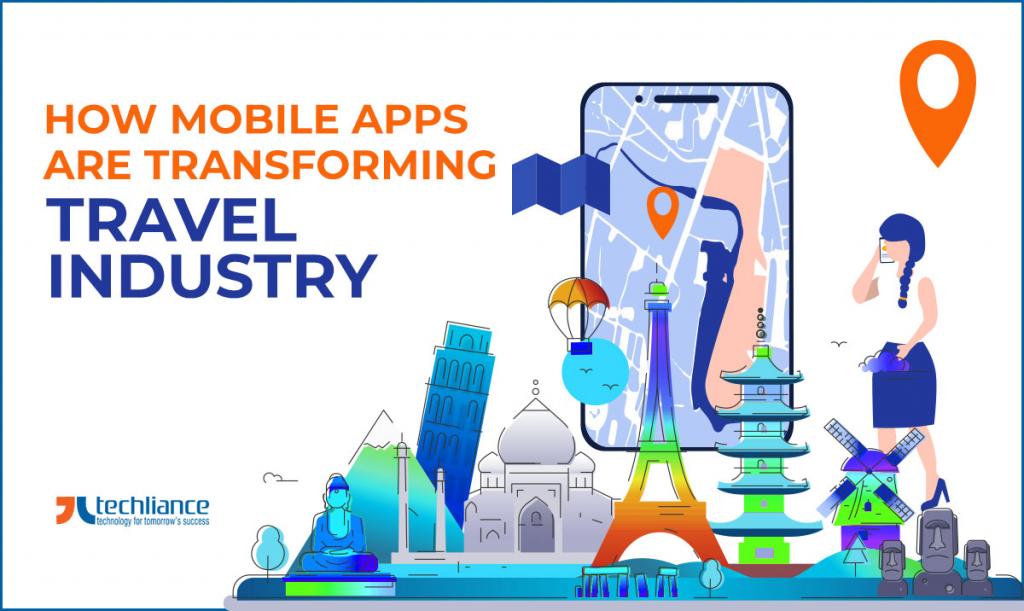
On-demand Apps Trends triggering Innovation for Travel
Take notice that on-demand travel planning apps are one of the topmost downloaded on-demand apps. Firstly, we focus on how the mobile apps changed the way we do travel today. This also involves taking care of pre-tour tasks such as booking a cab or planning a tour.
Customer is King
Choice of youth, personalized experience, social media relationships, 4g & 5g connectivity.
Let’s deliberate in detail over the manners innovative on-demand mobile apps are transforming travel & tourism industry world over.
Nowadays, travelers are more than ever aware of the better traveling services they can get by simply searching the Internet. Thanks to increasing choice of options, consumers are no longer dependent upon their area travel agent to plan their tour. Now the customer is the new king and better services are the new core of the travel industry.
In addition to this, word of mouth very much buzzes in the travel sector. Thanks to social media, users are first checking the reviews of influencers and then making the booking. So, travel companies need to check the pulse of customers, and then offer services accordingly.
More and more youngsters and middle age customers are embracing on-demand mobile apps. It can be said that mobile app technology has become more like a fulcrum in the lives of millennials.
They are constantly dependent on using new apps for various reasons such as social media, online shopping, and travel booking. The customer group that is hitting their mid-30s by 2024 will form a panoply in the travel business world.
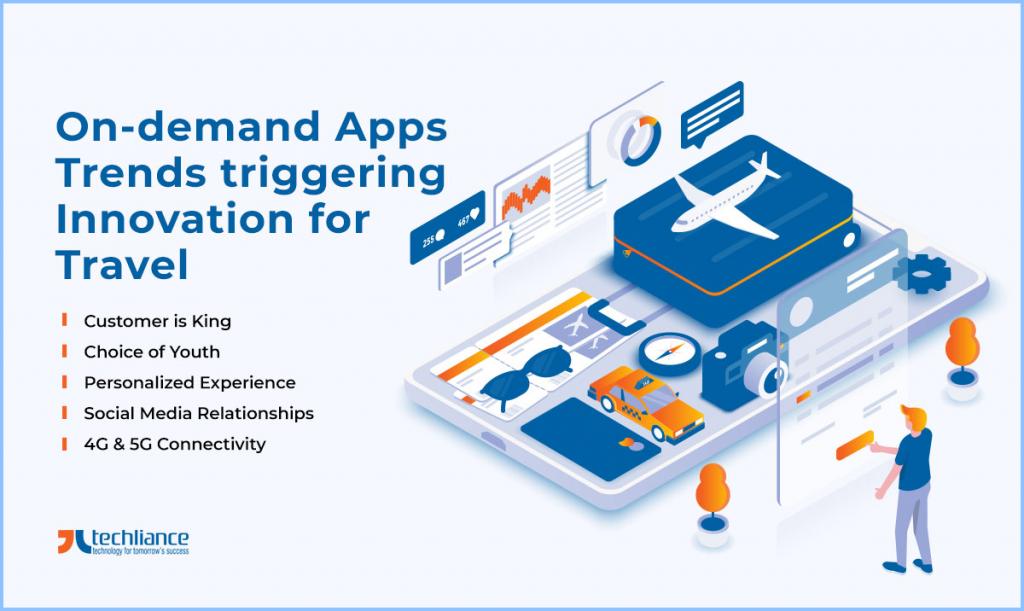
Travel companies focus on targeting customers using customized services; special promotions such as discounted offers, deals, and coupons. All of these perks are offered on websites and mobile apps. Thanks to on-demand applications, travel companies gather customer data that allows them to tailor their services based on customer behavior.
These days, many travel companies are investing in machine learning powered applications like chatbot to provide automated personalized customer service. These personalized services perform integrated tasks for tourism businesses, and also provide pleasure elements for travelers. As a result, this is helping vacation leisure companies offer better services and get ahead of their competition.
No one can deny the fact that the social media phenomenon is growing so fast and impacting the business world. Being optimistic, we can say that social networking will continue to impact more and more offline social relationships with businesses. Likewise, travel industry is going to boom with social media and community networks.
There is another use case of social networking when it comes to travel. People like to share their traveling experiences with friends, family and the world. Apart from general social media services, several travel networking apps have come to the fore.
Similarly, travel-goers also like to share their photos and videos through a special purpose travel social app . This also helps them in preserving the memories of their travel experiences.
If the growing innovation in mobile apps wasn’t enough to shake the travel industry, 4G technology did the deed. Since its inception, many tech giants predicted that 4G will be the mainstream technology by 2024. They forecast that 4G will lead to almost never-ending new users of mobile communications worldwide.
These predictions were perfect and 4G did change the broadband cellular networks and world. Today in 2024 daily new users are coming on the ultra-speed mobile networks. Progress in the internet bandwidth has opened door to many possibilities.
Move forward to 5G and we are set for an information revolution thanks to high-speed internet connectivity. So, these new users are expecting and asking for better services from every industry including the travel industry. 4G and 5G has brought many business growth opportunities globally.
Creating lasting impression on Travelers with Mobile Apps
Talking of 2024, mobile apps are transforming travel and tourism industry for the greater good of travel-aholics. Given below are the benefits of travel apps for both tourists and businesses.
Know your Customers
Enhanced communication, going paperless, seamless interconnection, increasing payment options.
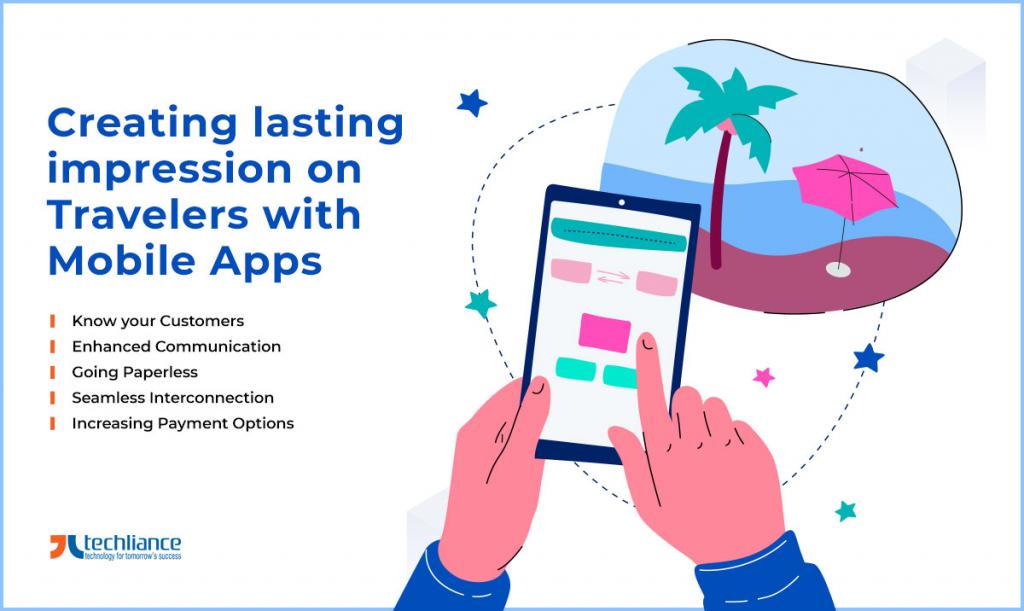
We now discuss these advantages of travel mobile apps for sightseers and holiday vacation businesses both.
Travel industries are using advanced AI and machine learning to gather data about their users’ preferences. Once they have enough data according to the user, they can show tours that compel the user to make bookings. Moreover, other futuristic technologies like IoT , IoE , AR & VR are revolutionizing the travel experience amidst 2024.
The real challenge that travel companies face is to get their customers speak about their experience. Travel agencies use social media integration to encourage them to talk and continue their conversations before, during, and after. This helps travelers even after the trip is over, their bags are unpacked and they are back to routine life.
These conversations encourage new users to pursue their passion and the same traveling experience. Mobile apps facilitate travel operators to announce new offers, deals, packages, discounts directly to their users. Furthermore, chat apps enable the customers to stay in touch with the travel service providers in case of any inconvenience.
Another benefit of mobile apps for travel companies is that they provide real-time user feedback. Travel applications have become the unseen yet direct channels that foster customer relations. Additionally, travel apps allow the tour operators to potentially expand their customer base.
Remember the time when you had to carry a separate bag for the documentations, book proof, and your identification documents. Well, this is not the case anymore. Today, customers can carry all of these things inside their travel app.
Also, you can bundle more items in the travel app like the map, travel expense calculator and even cash. These conveniences enable users to enjoy their tour to its fullest. So, your business travels and corporate voyages are converting into official retreats.
If you own travel business, then consider this. Have you ever asked your customer after their tour has ended to inquire about their experience? These small things show that you care about your consumers.
As well as if they had any inconvenience during their travel then they can come to you. It is always better to increase the “white noise” that wheels the travel companies’ business.
Moreover, this after service support helps you establish long lasting relationships with users. They will like to become repeat customers, and so you again get chance to make them travel through your company.
Over the years, online payment gateways have slowly changed the way we make payments. Nowadays, people are carrying way less cash with themselves. Physical wallets are getting replaced by credit/debit cards and digital wallets.
In addition to this, new emerging security techniques are making mobile payments more and more secure. Now you can use 3D scan, fingerprints, as well as OTP to make payment and reduce the risk of fraud. Services like Apple Pay and Google Pay are available in tens of countries and are a great step toward this.
Integrated payment gateways in mobile apps and websites are allowing customers to make more seamless payments. Even in many developing countries mobile wallets have become daily use thing and have substituted the physical wallets and purses. Visa Contactless, Mastercard Contactless and ExpressPay by American Express are also a few of the main payment gateways in USA.
Now coming back to the topic, the travel industry saw this trend and found an opportunity in this. They are utilizing this cashless trend to facilitate travelers using digital wallet or credit card. They provide more discounts, offers, and coupons to customers doing digital payments.
Cashless digital payments are another step towards gathering traveler data for businesses’ purposes. This is termed as the “digital breadcrumbs” by Amadeus. The record of “who, when and where” will augment the process of customer profiling and communication.
This data will fuel the next decade and we will see the rise of a “knowledge economy”. The customers will be archiving more data, that will be used by travel businesses. So, this data will permit travel companies to use these “digital breadcrumbs” to maintain their competitive edge.
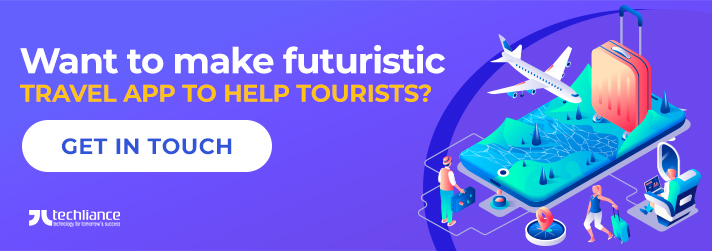
We are living on the edge of a change that will impact the whole travel industry. Those of us who will adapt to this change will come out as the leading travel companies and those who do not will be left behind. The travel world is going to be all-digital, cashless, and highly personal.
Mobile applications have become as well as will remain a ubiquitous travel companion in the near future. On a practical basis, mobile apps are helping travelers to find their surroundings, and experience their tour to its fullest.
There is no way that mobile applications will fad anytime soon. Rather they are the future of the travel business. However, there is bad news for businesses that do not adapt, they may go out of the business. Or at least they may receive heavy losses in running travel operations.
In contrast, the good news is that businesses that embrace this new technology, will surely emerge as prominent travel companies. Thanks to on-demand travel applications, they will remain ahead of the competitors during 2024 and in future. Thus, it is not too late for you to invest in the travel mobile apps.
Are you looking to create a hi-tech travel app to aid tourists? Here at Techliance, we provide innovative travel solutions in the form of mobile apps and responsive websites for tourism companies. We have partnered with leading travel and tours operators in United States to help them become successful in the industry.
Contact us today to build on-demand tourism EPR solutions, interactive leisure websites and travel apps now. Empower users by turning travel mobile booking just a tap away.
Ready to discuss your project?
Fill out the form below and one of our representative will get back to you soon.
Recent Posts
- Mobile app statistics that predict the trends for future
- Which JavaScript libraries are best for web solutions?
- MEAN Stack vs MERN Stack: What is better for business?
- Hire Android development services to make quality apps
- Highlighting the benefits of the Django framework
- Android App Development
- Business Process Automation
- Career Growth
- CMS Development
- CRM Development
- Digital Marketing
- Hybrid App Development
- iOS App Development
- IT Services
- Machine Learning
- Mobile App Development
- Offshore Developers
- On-Demand Apps
- Remote Work
- Software Development
- Uncategorized
- Web Development
- What's New
- Privacy Policy
- Terms & Conditions
Copyright 2024, Techliance

801-308-8750 Ext 101
Schedule a call
14 travel app trends and insights for 2024

Alexander Ragin
Updated May 15, 2024 • 15 min read

In this article
Mobile app trends for 2024
Just like in previous years, the travel industry will certainly be heavily influenced by travel apps in 2024 . Nowadays, travel businesses have to focus on quality and value as much as quantity of services and products, which means creating personalized experiences and offering seamless travel services, sustainable initiatives, and cutting-edge technologies. It’s all about redefining the way travelers plan, embark on, and cherish their journeys.
For the tourism app development in particular, the focus is now on building apps that stand out in the competitive app landscape, and seeking creative ways to optimize user journeys with user-centric innovations. As a travel company looking to develop travel app, new trends and emerging technologies should definitely be at the top of your research list.
Let Zoftify help you out. We’ve put together a list of 14 global travel app trends that you can jump on to create the best travel app in 2024.
When it comes to tourism app trends, we’re going to list the ones that we believe will have the biggest impact on tourism businesses and the industry as a whole. But as with all trends, they come and go — look what happened to blockchain technology, "smart contracts", and NFTs — so make sure to keep an ear to the ground so you’re always up to date with what’s happening in the travel app space.
Now, let's learn about our first contender in the travel mobile app trends to watch in 2024!
Personalization
Modern travelers are already accustomed to tailored experiences, so personalization is absolutely expected from any travel company . Coincidentally, travel apps are unparalleled when it comes to providing customers with personalized experiences.
That’s because travel apps learn everything about user preferences and collect valuable behavioral and demographic data. Using the data collected, apps can upsell services and highlight personalized offers for leisure and business travel, like deals on flight options, car rentals, local attractions, or travel experiences that the user is bound to love. In fact, users are much more likely to make purchases when they get relevant suggestions. These tailored suggestions can be promoted through push notifications.
Personalization is key. It allows an online travel agency to increase its revenue and customer loyalty, because users are more likely to keep your travel app on their phone if they can see that it provides personal value to them. Luckily, travel apps make personalization possible, way beyond the capabilities of a website.
Of course, personalization isn't a new thing, but it’s certainly a priority in the travel industry now and will continue to be in the future. Keeping personalization at the forefront when developing your travel app is a smart move.
Mobile payments
Mobile payments are definitely one of the top mobile travel trends. In fact, it’s safe to say that they are a standard in the travel apps industry and will remain essential in 2024. From the moment COVID-19 emerged and up to this day, quick and convenient mobile payments remain one of the best features of any travel app, as they simplify the whole booking process and increase profits for app owners.

If you’re thinking of developing any type of booking app in 2024, there’s absolutely no way you can do without mobile payment gateways. Whether travelers wish to book flights, hotel rooms, or whole business trips, mobile payments are still the optimal choice as they provide a seamless experience.
With mobile payments and mobile wallets, users can pay from anywhere, anytime, using pre-stored card details, in just a couple of taps on the screen. Now, this level of convenience is something customers expect , so it's a new standard you have to meet.
Depending on your travel policies, we recommend enabling Stripe, Apple Pay, and Google Pay. While it can be a bit tricky to implement the required safety features for taking mobile payments, an experienced development company like Zoftify will know how to build travel apps with mobile payment gateways set up properly and securely, in accordance with the guidelines of the Google Play and Apple App Store.
Want to learn more about current trends for mobile apps?
Reach out to our team and we'll share our expertise.
Artificial intelligence
Artificial intelligence was big news in 2023, especially in the second half, with almost every industry in the world feeling its presence. Numerous startups appeared seemingly out of nowhere, each one exploring the possibilities of big data and machine learning and finding a new use for AI technology. The travel industry was no exception — we saw AI trip planners, advanced chatbots, and dynamic pricing tools for hotels popping up everywhere.
There are plenty of signs that this technology remains on the rise, with companies discovering new applications for AI and developing it further as we write this. For what it's worth, you should certainly hop on the AI train just like everyone else , so you don’t miss out on the opportunities it can provide for your business and your customers.
Whether AI tools will become standard features in mobile apps or not is a bit trickier to say at the moment, but you should definitely keep an eye on AI in the news and watch how your competitors are leveraging its power.
Covering the full user journey
In recent years, travel apps have grown to become more like travel companions , assisting travelers at every step of their journey — from getting inspired, to making a booking, and all the way to returning back home. The fact that apps are always in travelers' pockets only encourages that.
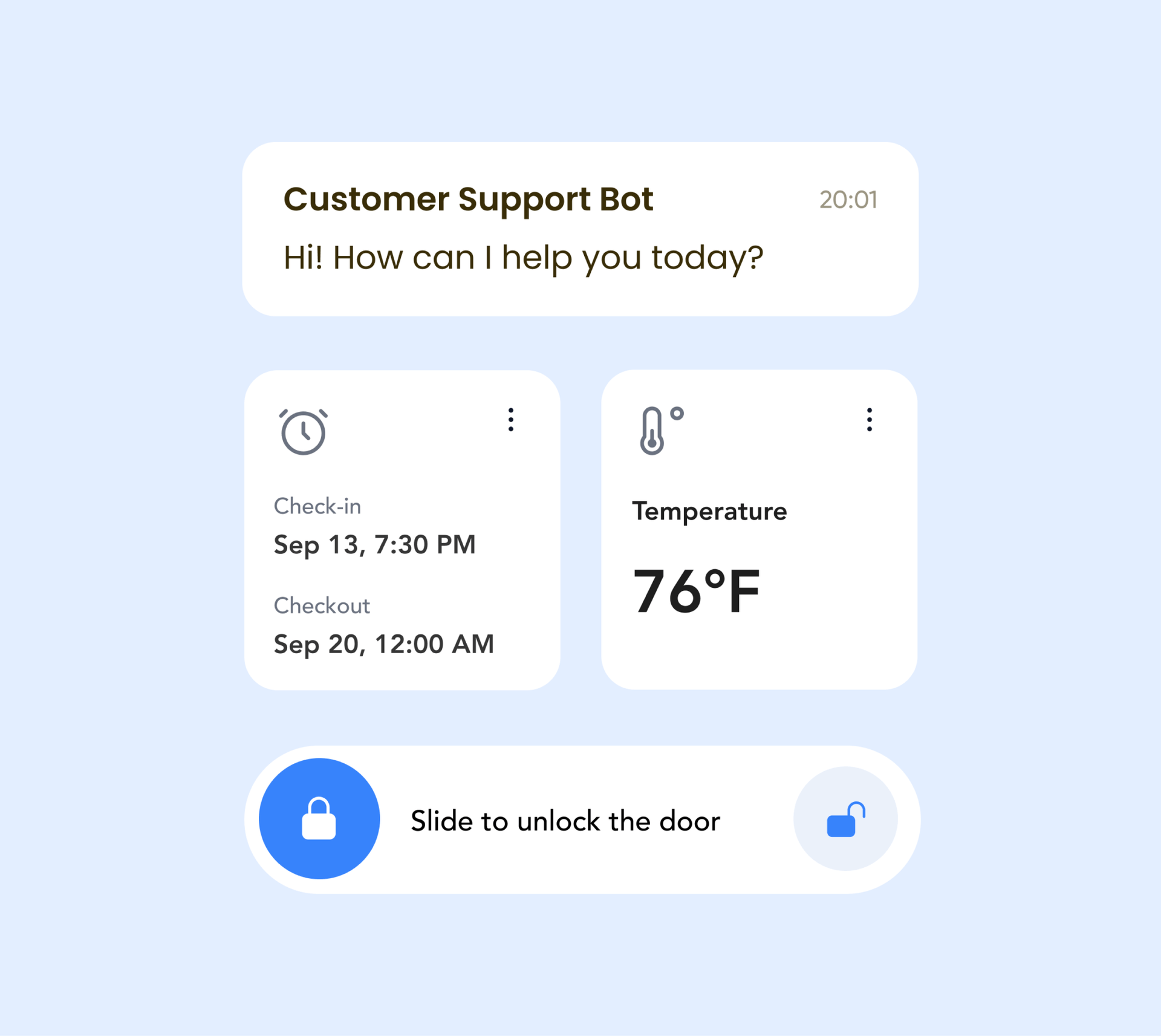
Travel apps are no longer just storefronts for showcasing destinations. When customers download an app, they get access to tour guides, customer support specialists, review platforms, and more, just like having 24/7 access to their very own travel agents. The point is, whenever travelers open an app, they can find something useful to them.
The purpose of travel apps has expanded over the last few years, so it’s very likely that this ‘all-rounder’ approach will be the expectation of any travel apps created in 2024. For example, our travel app development services include not only the development itself but also ensuring that it fits the travel customer journey .
Seamless booking flows
The best travel apps on the market today have seamless booking flows supported by robust booking engines. Going into 2024, new apps can ensure a smooth booking process from start to finish by implementing APIs , payment gateways, and more. Enabling travelers to book everything they need in a few taps is expected nowadays , so make sure your app meets that benchmark.
When developing an app, conduct thorough user research and testing to make sure your booking process isn’t overly complicated, and identify any blockers preventing customers from reaching the checkout.
We’re seeing chatbots featuring in more and more mobile apps nowadays, especially thanks to recent advances in natural language recognition. Chatbots in apps are often positioned as the first line of customer support , and for good reason. 24/7 availability and quick response times makes them extremely convenient, helping travelers who need urgent assistance outside of general business working hours.
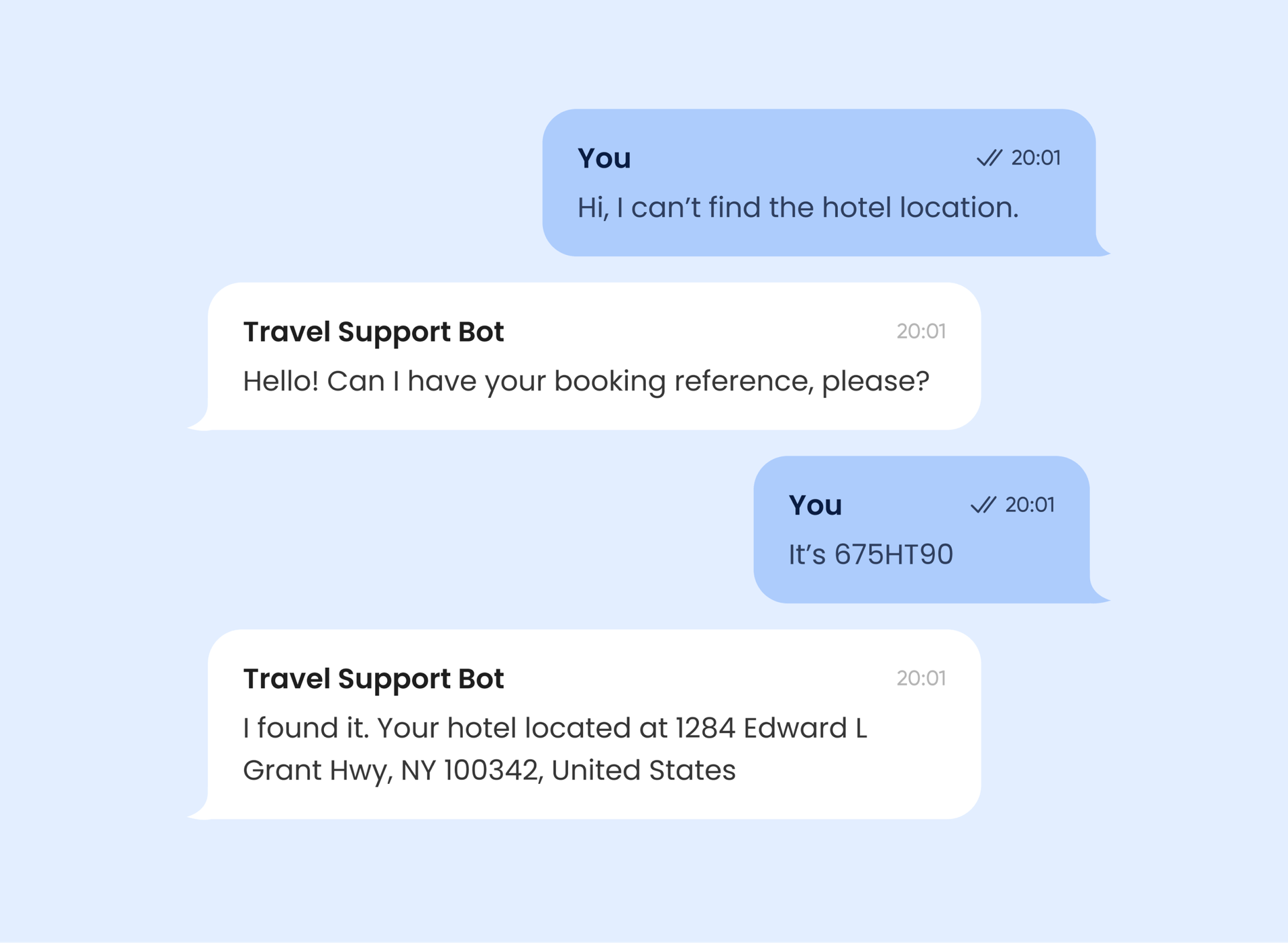
It is reasonable to assume that chatbots for mobile apps are only going to get better and smarter in 2024. While extremely popular, they’re not yet an industry standard, as machine learning has a long way to go. But if you’re thinking of investing in a travel app in the future, there’s a high chance you’ll end up incorporating a chatbot or AI customer service feature in some capacity.
Super apps are apps that consolidate the features of multiple apps into one. The incredible success of Hopper — an app that combines not just travel, but financial services as well — proves that super apps are the next big thing .
Obviously, super apps require a lot of investment and maintenance, so we're not expecting them to appear on app stores in the hundreds, but we're convinced that we'll see the super app strategy being utilized much more in 2024. They have the potential to provide users with unparalleled convenience.
Social interactions
Humans are social beings, and after years of COVID-19 and lockdowns, many of us have a renewed desire to connect with others. Travel apps make social interactions easy thanks to social media integrations, personal profiles, and in-app messengers. And with solo travel on the rise, it’s never been easier for travelers to meet others on their journeys and share their experiences with those at home, all on the go.
New social interactions can be just as rewarding for travelers as discovering new destinations, and when combined, the experience can be extremely satisfying.
This is more of a behavioral shift than a technological trend, so it’s hard to say how important socialization capabilities will be for travel apps in the future. But for 2024, we think customers will continue to love this new way of traveling and see their travel apps with the same importance as their social media apps.
Subscriptions
In recent years, some large travel businesses have adopted a subscription model for their travel apps, giving users access to unique features for a fee. This model offers a stable revenue flow for an online travel agency while providing a valuable experience for subscribers. While you have to be careful and fine-tune subscriptions for optimum results, the premise of this business model is fantastic, which is why plenty of online travel agencies are trying it out.
When done correctly, subscription models for travel apps can even feel fairer than some other profit-generating business practices — especially ads, which, sadly, are often really annoying. If you opt for a tiered subscription model with a premium level, you can make users feel like VIPs, and they’ll reward you with their loyalty .
Subscription models for travel apps are surely going to play their part in 2024, so if you were considering trying this strategy for yourself, now is a good time — just make sure that your offer is truly worth it to users.
Loyalty programs, points, and awards
Keeping customers and increasing retention rates is becoming increasingly important as the market becomes even more competitive for new travel apps. That’s why loyalty programs are also becoming more widely used. By offering discounts, extra miles for flights, or level-ups for each room booking, you can keep users engaged with your mobile app. By rewarding their spending, users will not only stick around for the benefits, but they will be excited about them too — there’s an element of gamification in it.
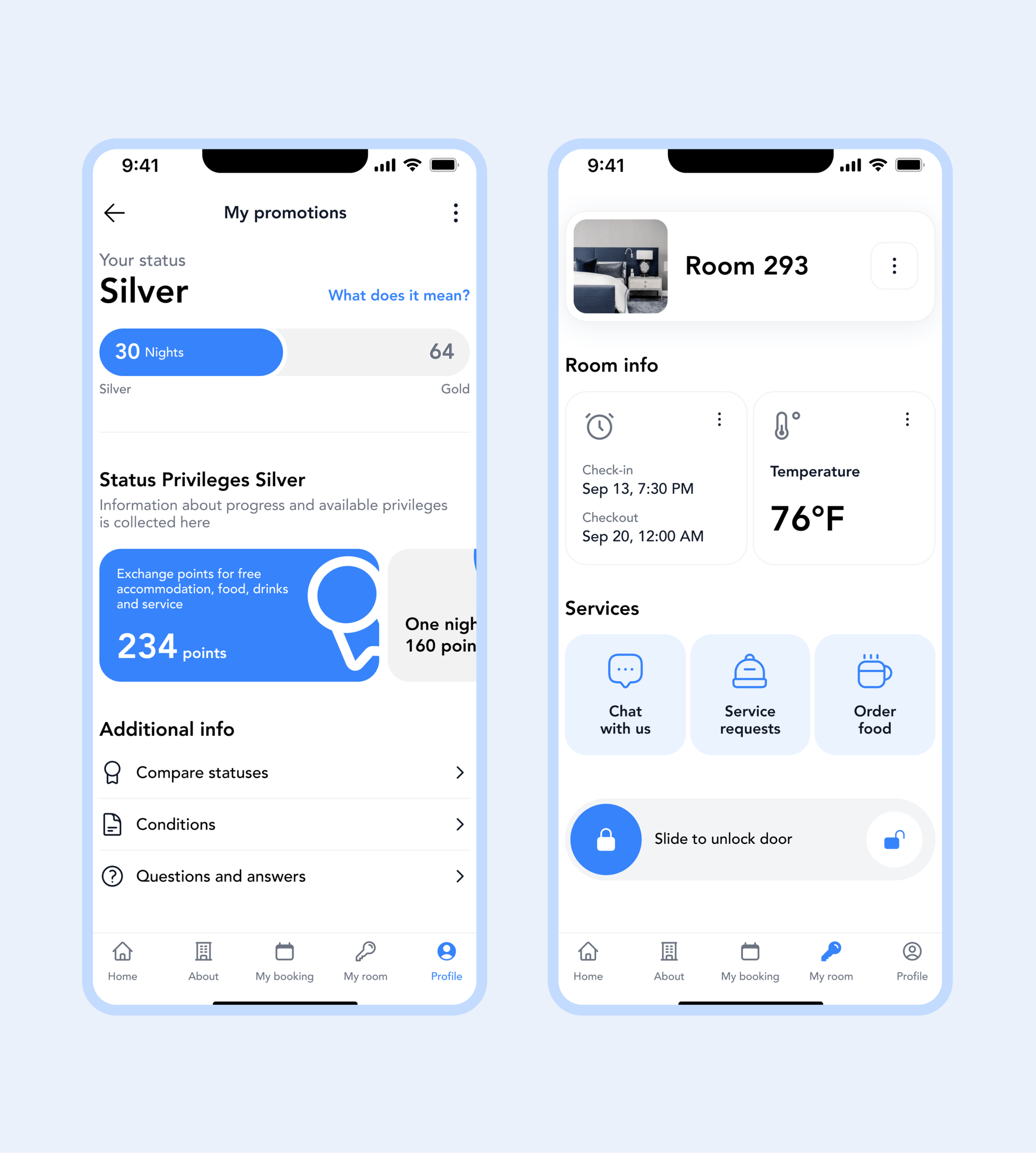
There are lots of ways of introducing reward systems into mobile apps . Giving customers the chance to earn points for using your travel app, plus levels for unlocking new perks, is a simple and very popular system — think of the unwavering Genius program for hotels and rentals from Booking Holdings.
Given how much they can boost revenue and engagement, it is easy to assume we’ll see loyalty and reward programmes appearing in more travel apps in 2024. If your business is thinking about starting one, we think that’s a sensible move.
User-generated content
Another huge trend we’re witnessing is the rise of user-generated content. Traditional marketing efforts and advertisements are not nearly as effective in building trust in a travel business as user reviews and ratings now are. Customers want more data from unbiased sources to help them make informed decisions . They’re much more likely to trust what their friends tell them on Facebook messenger or share on Instagram than anything you could write on your landing page.
To get ahead of this trend and to build confidence in your app, provide customers with an open reviews page that allows travelers to share their honest opinions about your services — if you do everything right, their feedback will be mostly positive.
Another way to utilize user-generated content to your benefit is to get your app on social media and allow travelers to tag you in their posts. You could also hop on the latest trends on TikTok and try to go viral on the internet — plenty of mobile apps have done it, like Duolingo.
This mobile travel app trend is here to stay, so make sure to explore ways for your online travel agency to generate user-led content and use that to your advantage in 2024.
Sustainability
We’re in a climate emergency, and travel companies are among those on the radar for their environmental impact. Sustainability is no longer just a buzzword, but a standard, and companies are being held accountable for the impact that their business practices have on the world. Becoming sustainable isn't just a gesture of goodwill or a reputation boost — it is a necessity , something that is expected from companies of all sizes and across all niches.
Luckily, the travel industry is slowly adapting and finding new solutions and technologies to help reduce and track its carbon footprint, environmental impact, water consumption, and effect on local communities.
Mobile apps have a part to play in a more sustainable future for travel. Digital check-ins and ticketing can save paper, while in-app content and search filters can promote the transportation options with the lowest emissions. Some businesses are even developing eco-friendly travel apps, built by providers who use renewable energy.
Considering the climate emergency is on everyone’s lips, sustainability will remain a priority for travel companies in 2024 and years to come . Helping the cause by making responsible business decisions, minimizing your environmental impact, and implementing sustainability reporting metrics is something we can only recommend.
Augmented reality and virtual reality have so much potential , and, when used in travel apps, can offer unique experiences for travelers. While the technology might be expensive and difficult to integrate at the moment, there are many reasons to go for it if you have the budget and development capabilities.
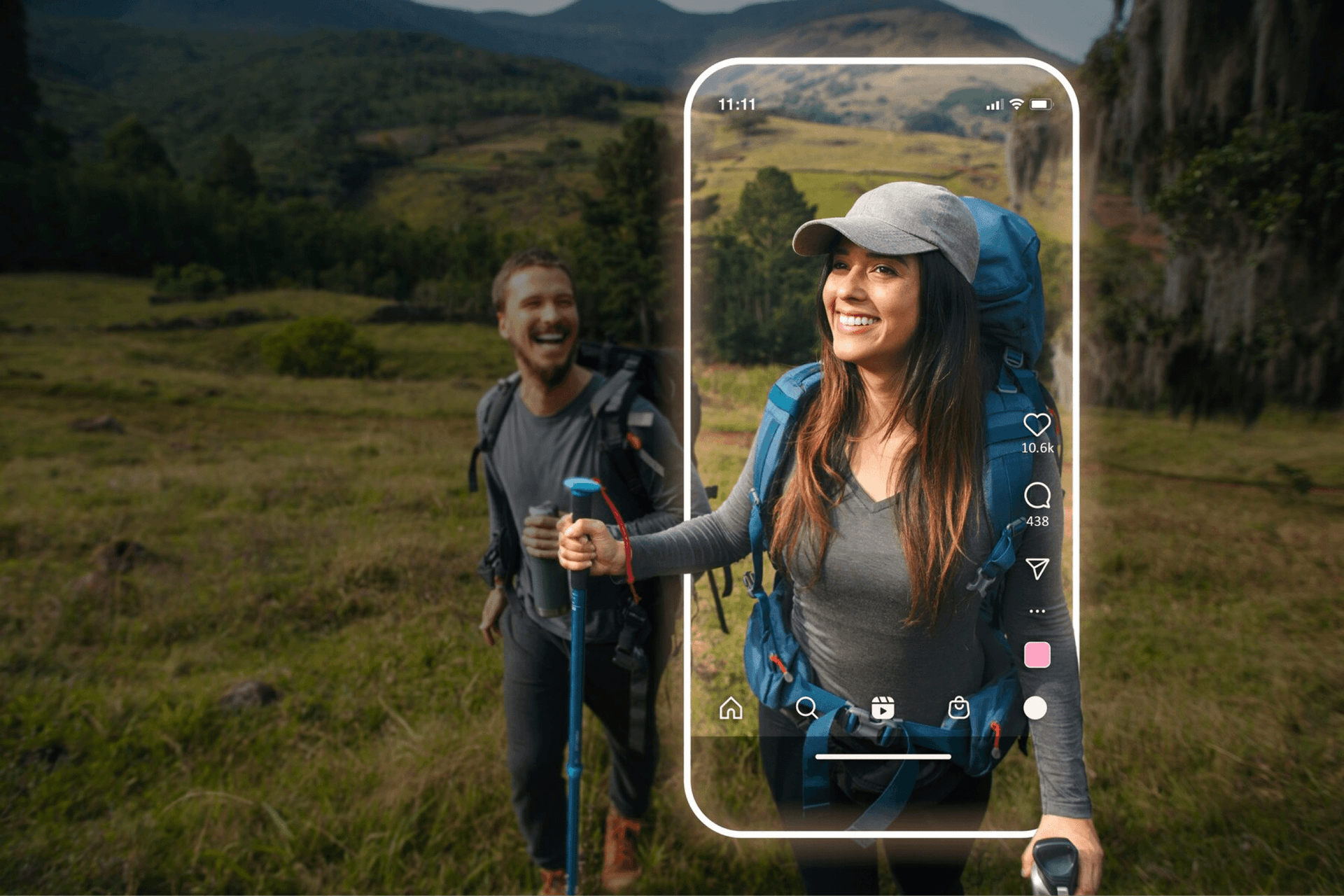
Both AR and VR give apps a great competitive advantage. For example, they allow you to make enticing offers with 360 degree views of destinations, or weave gamifying elements into the user's trip. You can even build a whole app around these features — the only limits are your budget and imagination.
While we don't think that AR or VR will become the new standard for apps in 2024, the technology will still be relevant and continue to mature — it has a lot to offer in general and for travel apps in particular. In fact, we believe that the tourism industry still hasn't fully uncovered its potential for leisure and business travel.
Voice recognition
Voice recognition technology is fairly new, but it has already found its way into some travel apps. The technology is based on machine learning and allows users to access information, search for leisure and business travel options, and receive real-time updates without needing to physically interact with the app, which can be very useful for people with visual impairments.
With voice recognition, travel apps can become more convenient and safer to use, allowing travelers to access essential information without diverting their attention from their surroundings. We also like the idea that an app could recognize at least some general app commands in offline mode — travelers often find themselves in places with little to no internet connection.
While voice search and recognition are not among the prioritized features of travel apps, this technology is still something you should look out for in 2024. We think it could really enhance the business travel experience for busy, on-the-go users.
Tired of mobile websites and ready for native apps?
Contact us and let's get started.
Travel apps in 2024 are going to be heavily influenced by the mobile travel trends we have explored in this article: from personalized offers and sustainability to AI and augmented reality technologies.
Each of these trends and technologies focuses on enhancing the overall travel experience for users. There’s also huge transformation potential for travel apps in providing immersive experiences, evolving to become more environmentally and socially conscious, and reflecting the growing needs of modern travelers. As travel apps continue to evolve, we’re excited to see how they leverage the power of new travel technology, and foster a more connected, responsible, and enriching trip experience for users around the globe.
Online travel agencies and other leisure and business travel providers should keep up to date with the trends we’ve covered here. If you’re looking to embark on app development in 2024 or in the future, remember this list to ensure you provide a rich and valuable experience to your users.
Founder & CEO
Alex loves travel and tech and founded Zoftify to help travel companies use technology more effectively. Before this, he worked in tech consulting, where he led international mobile development teams.
Read other articles
What are the top tourism mobile app trends for 2024?
In 2024, the top travel app trends include increased focus on the personalized approach, seamless booking experiences, integration of AR and VR technologies (e.g. for full 360 hotel room views), mobile payments for enhanced convenience, and a focus on sustainability.
To stay ahead of the curve and remain competitive in the leisure and business travel industry, we suggest that you integrate or implement some of these features and approaches into your travel app. If your budget and travel policies allow, we think mobile payments and personalized offers should be top of your priority list. It’s what travelers expect.
What role does AI play in the travel app market trends?
AI is poised to play a significant role in the future of travel apps by providing personalized recommendations, predictive analysis for pricing and availability, real-time language translation, and virtual customer service to enhance the overall travel experience for users.
Nowadays, lots of online travel agencies are utilizing AI technology in their travel apps to provide a better service to their customers, but the technology is still fairly new. There’s so much untapped potential and many under-utilized applications for it, so watch this space in the coming year.
How can mobile apps support sustainability in the travel industry?
Travel apps can support the sustainability agenda by enabling eco-friendly travel bookings, promoting sustainable transportation options like trains, scooter rentals, and ride-sharing services, and replacing paper processes with digital ticketing and check-ins.
Standards of sustainability are increasing because of growing public awareness around the negative environmental impact that tourism can have, so introducing eco-friendly features in travel apps is a wise decision. In the future, we expect sustainability to play much more of a role in the travel app development process.
However, sustainability starts at the core of a business, not just its app, so think about your business practices and the metrics you can introduce to monitor your company’s impact.

Travel Innovation: How Technology Shapes Modern Journeys
Posted: November 1, 2023 | Last updated: November 1, 2023
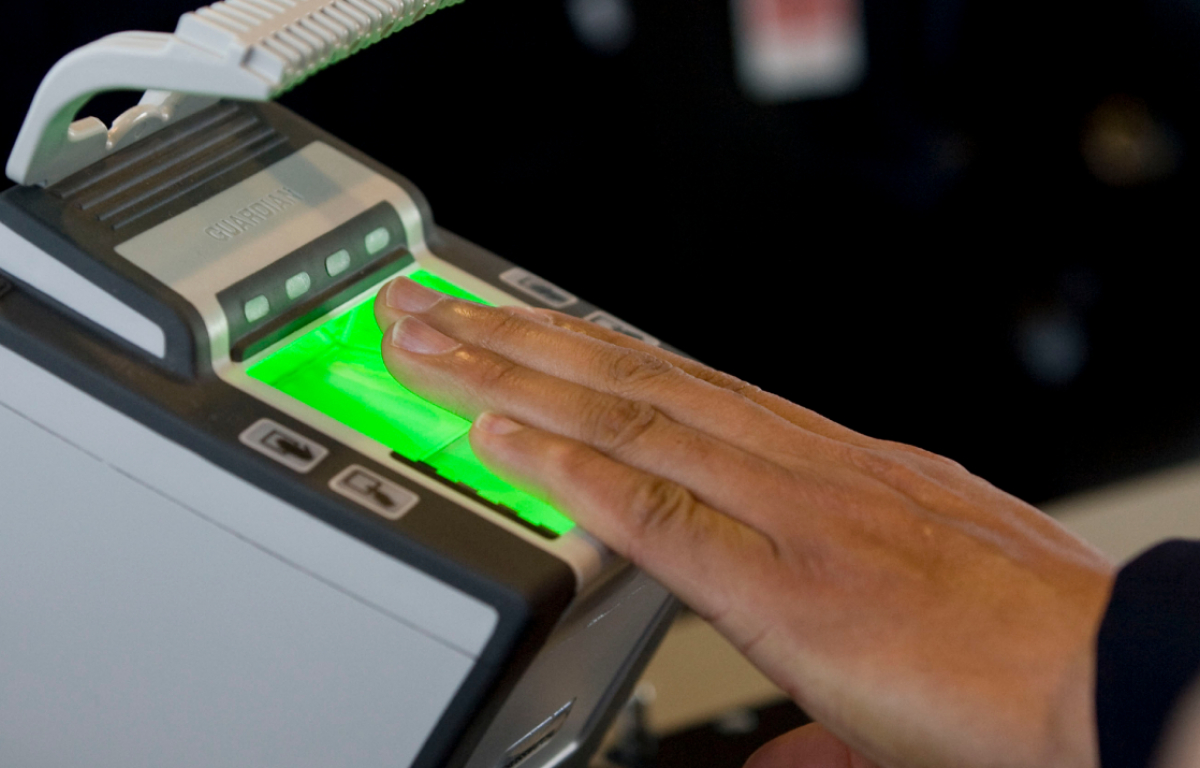
Safety is the number one priority for many people when it comes to traveling. Biometrics have helped make significant progress on that criteria. Biometric technologies like fingerprint scanning, facial recognition, and iris scanning offer a higher level of security compared to traditional identification methods.
Airport security and immigration processes have sped up thanks to biometrics, reducing wait times and eliminating the need for physical documents and manual verification. Biometrics also enable personalized travel experiences by linking individuals’ biometric data with their travel preferences and profiles.
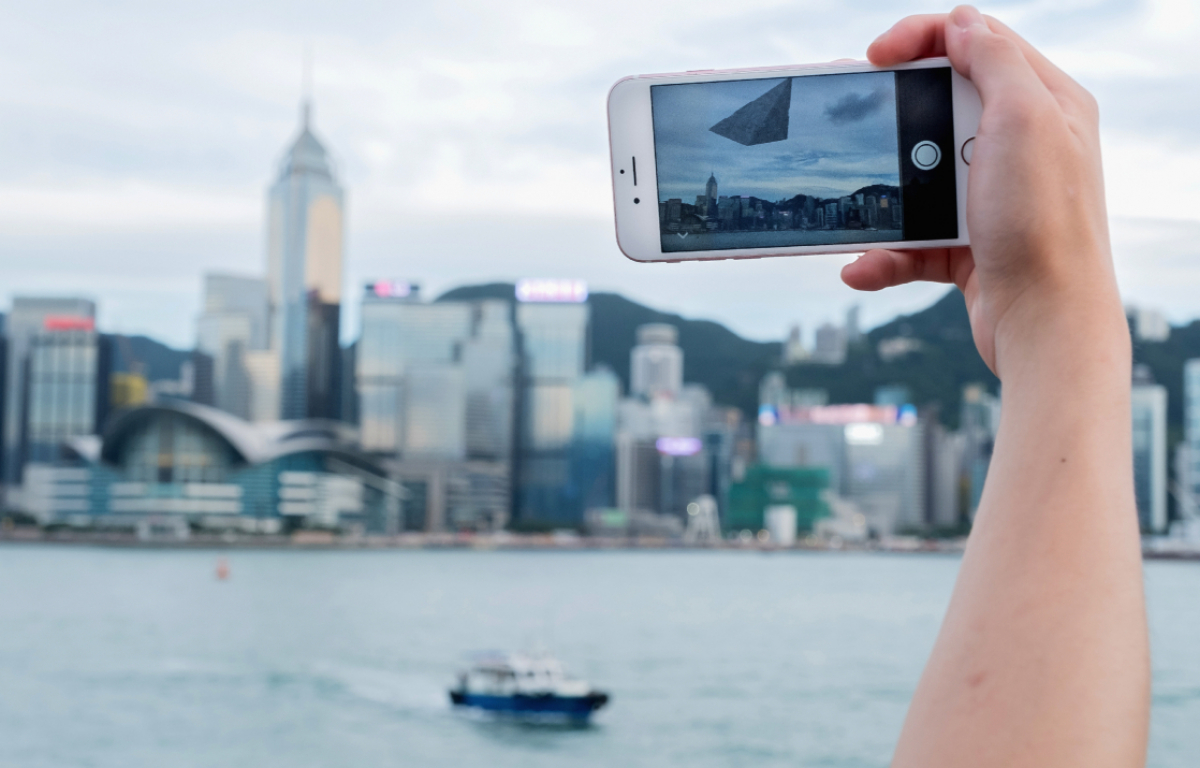
Augmented Reality
Augmented reality apps help travelers by providing real-time information about particular places, attractions, and destinations. AR can help people navigate unfamiliar cities and learn about those places along the way.
Interactive guides, real-time translation, and personalized recommendations are some of the features that AR apps provide to travelers. They improve users’ engagement with the destination where they’re at and provide much-needed information when discovering new places and navigating unknown territories.

In a data-driven modern world, Big Data allows businesses to gather and process large amounts of data from travelers. This allows them to offer personalized travel experiences tailored to individual preferences, customized promotions, and personalized recommendations.
Big data enables businesses to gain a deeper understanding of customer needs and preferences. Business-wise, it analyzes market trends and demand patterns to optimize selling strategies and pricing. It also helps travelers improve their planning and trip management.

Autonomous Vehicles
While still in the early stages, autonomous vehicles promise to change the way we travel forever. Brands like Tesla and cities like San Francisco have begun experimenting with driverless vehicles. The main advantage of autonomous vehicles is that they can eliminate human error, which is the leading cause of accidents due to distractions, fatigue, or impaired driving.
They detect advanced sensors and cameras and use artificial intelligence algorithms to navigate and make decisions on the road. Autonomous vehicles also have the potential to increase accessibility and mobility for people who cannot drive.

Internet of Things
The Internet of Things (IoT) describes the network of everyday objects connected to the internet via embedded devices with sensors, software, and other technologies. IoT devices have also impacted the travel experience.
Whether it’s smart luggage trackers or hotel room controls, these kinds of devices improve the traveler’s experience and organization. It also helps to ensure safety when traveling with devices such as smart surveillance systems equipped with IoT sensors.

Smart Travel Accessories
Smart travel accessories have solved many inconveniences and issues for travelers. For instance, portable Wi-Fi hotspots or smart travel routers enable travelers to stay connected to the internet while on the go, which is crucial when exploring unknown areas.
Some travel gadgets, like portable chargers, noise-canceling headphones, and smart suitcases with built-in GPS, enhance convenience and optimize travel. These kinds of smart accessories are also used for safety purposes.

When it comes to cybersecurity and transparency, blockchain technology has had a major impact on travel. Passenger identities and booking records are stored on the decentralized blockchain, reducing the risk of fraud, identity theft, and data breaches.
Blockchain technology also helps with payments. In the travel industry, the blockchain eliminates any intermediaries in the payment, like banks, enabling peer-to-peer (P2P) transactions, saving time and transaction costs, and enhancing transparency. It also plays a big part in loyalty programs, with the use of blockchain-based tokens or cryptocurrencies that allow more flexibility in the program’s rewards and can be redeemed through multiple participating travel providers.

Travel Sharing Platforms with User Reviews
One of the most important aspects of traveling is trusting the people who are in charge of the transportation, accommodations, tours, and other trip activities. Travel sharing platforms have gained a lot of popularity over the course of the years thanks to the facilities they provide for both parties to connect and interact.
Another key part of travel sharing platforms are the user-generated reviews and recommendations. Platforms like TripAdvisor and Yelp help travelers make informed decisions based on other travelers’ opinions.

Artificial Intelligence (AI)
The AI takeover is real. Platforms like ChatGPT and Bard are regularly used by Internet consumers. When it comes to traveling, artificial intelligence can be very useful, and these chatbots can be used to provide information and assist with bookings.
AI algorithms can analyze large amounts of data, including user preferences and past travel behavior. Using that data, AI can offer personalized travel recommendations. For businesses in the tourism industry, AI algorithms can analyze market trends and demand patterns to generate selling strategies and offer the best prices to maximize revenue.
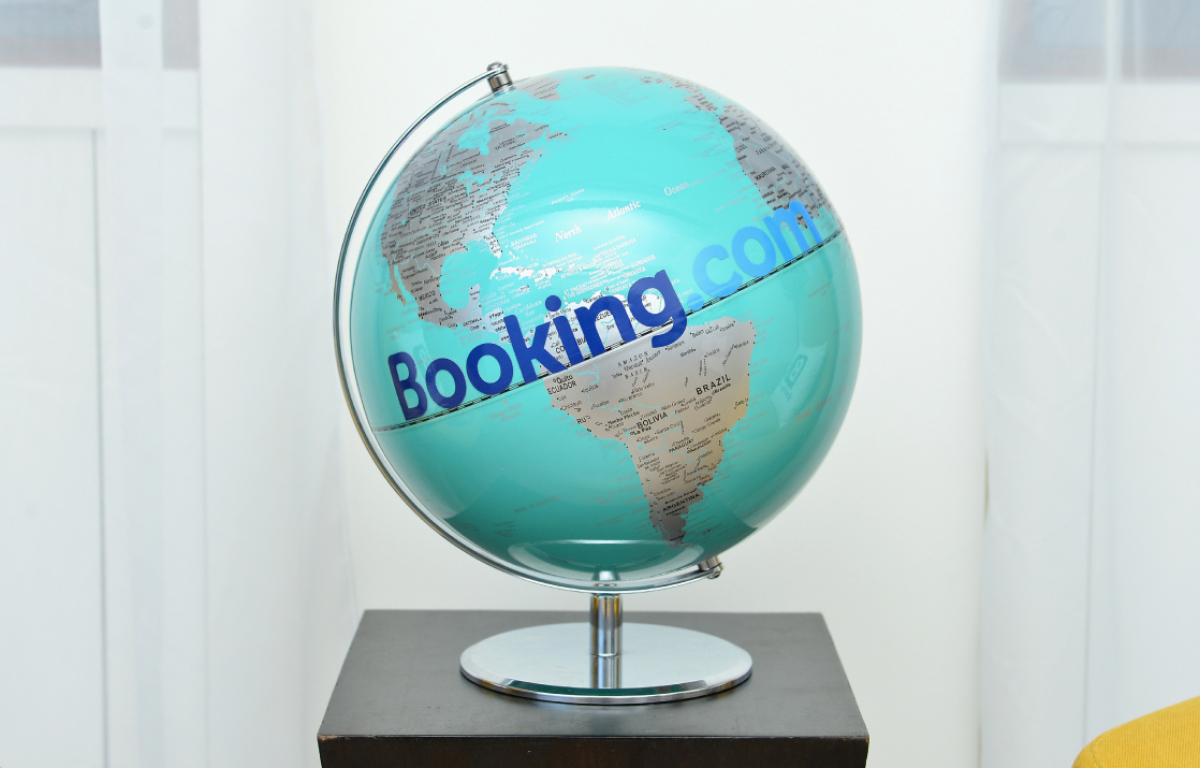
Online Travel Agencies (OTAs)
Online Travel Agencies have resolved many obstacles regarding travel accommodations. Platforms like Expedia, Booking.com, and Airbnb have made it easier to find and book accommodations wherever you go.
Providing a wide range of options and competitive prices, OTAs eliminate the need to visit multiple websites or make many phone calls to organize trips. User reviews and ratings, with 24/7 availability and customer support, have helped travelers get references about possible destinations and accommodations.

Mobile Apps
The days of using gigantic maps to move around unknown territory on your trips are over. Travel apps have changed the way we organize and manage every journey. It seems like every problem or issue can be easily resolved by just unlocking a smartphone and downloading different apps.
Airlines have their own apps to book flights. Some hotels and activities can also be booked through apps, while car rentals and tickets for other modes of transport can also be secured online. Moreover, any Maps application on smartphones can provide real-time information and even travel guides while spending time far from home.
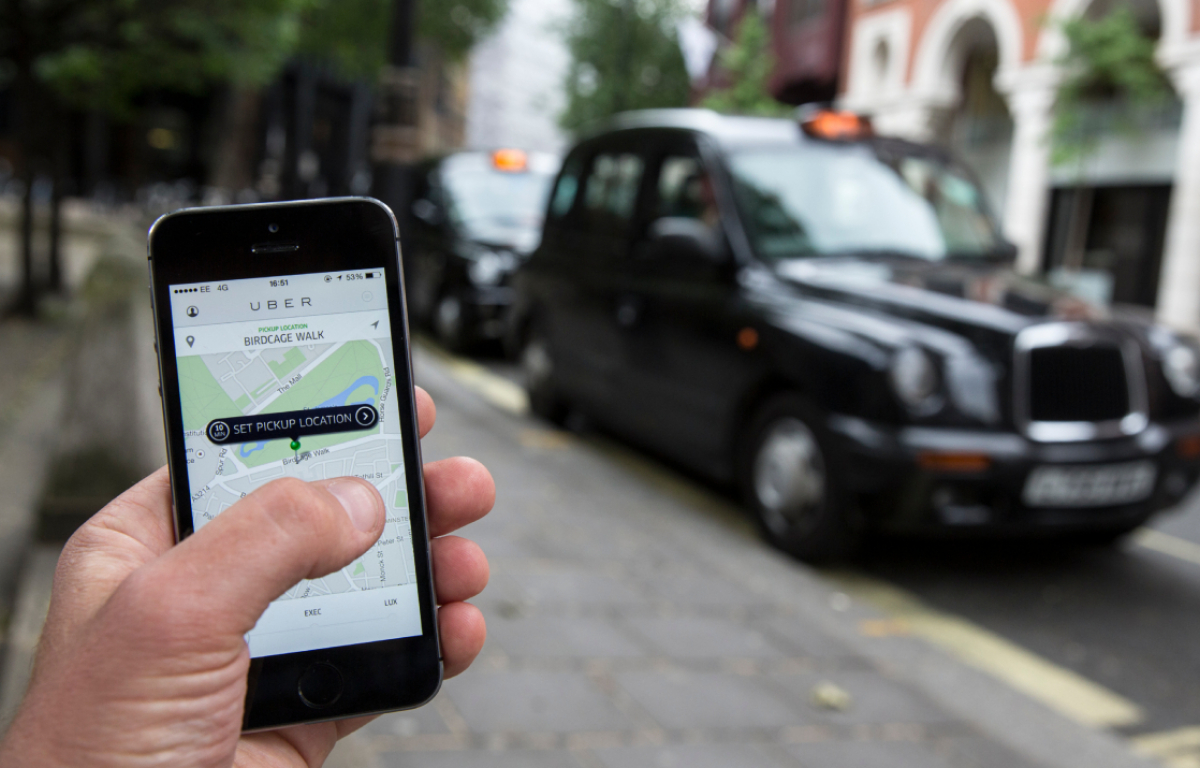
Ride-Sharing Services
The long-awaited alternatives to traditional car rentals and taxis have finally arrived in the last couple of years. Companies like Uber and Lyft have revolutionized transportation with their convenient ways of getting a car to move around a city.
Smartphone apps help travelers request a ride, track their driver’s location, and pay for the service without the need for cash. Pricing models, such as dynamic pricing based on supply and demand, can offer competitive rates, especially during non-peak hours when regular taxis are not available or hard to find in some cities. These companies usually offer safety and transparency by providing driver background checks, vehicle inspections, and real-time tracking of rides.

Mobile Payment Solutions
Mobile payment solutions have been playing a major role in the evolution of travel. In fact, the globalization of these payment solutions has enhanced travelers’ experiences wherever they go, reducing the need for physical cash.
Many mobile payment solutions are widely accepted globally, allowing travelers to make payments in different countries without dealing with currency exchange or international banking issues. It also provides financial inclusion by providing access to digital payment methods to people who may not have access to traditional banking services while on the move.

Virtual Reality
Technology has advanced so much that it allows us to travel to a certain place before actually going there. How? Virtual reality allows travelers to go through immersive experiences. Through VR headsets or immersive displays, users can virtually “step into” different locations, allowing them to explore and interact with their surroundings as if they were actually there.
These kinds of experiences can help people take a look at places that they haven’t been able to visit. It also provides helpful information that can help travelers make decisions ahead of their trip.

Electric and Hybrid Vehicles
In a world where there’s air pollution nearly everywhere, the transportation industry is trying to change that with electric and hybrid vehicles. The quest for environmental sustainability has allowed these vehicles to change the way we travel.
Electric and hybrid vehicles produce lower or zero carbon emissions, helping to fight air pollution, greenhouse gas emissions, and climate change. In that way, sustainable and eco-friendly travel can be achievable in countries that have and produce these kinds of vehicles.
More for You
Stephen Hawking once gave a simple answer as to whether there was a God
Scientists Think They've Found a New Cause of Type 2 Diabetes
Dolly Parton says it was ‘bold’ of Beyonce to change ‘Jolene’ lyrics without telling her
18 Foods You Won’t Find Anywhere Else Except the Midwest
Do you get a jolt when you're falling asleep? Here's the reason behind that and other strange bodily reactions.
Hear retired US general’s response to Ukrainian soldiers who say US-issued tanks are underperforming
Pauley Perrette Reunites With NCIS Co-Star Six Years After Series Exit

Trump judge faces a ‘serious problem’ if court returns guilty verdict: John Yoo
‘I’ve Been a Longevity Nutritionist for 30 Years, and These Are the Top 4 Foods I Tell My Clients To Eat Every Day’
Could the Duke of Westminster’s wedding change a 300-year-old English law?
16 Popular Pizza Chains, Ranked Worst to Best
What Is Traction Control, And Should You Ever Turn It Off?
The Supersized Weed That Is Very Dangerous In Your Yard
Alito Sits Out Unanimous Supreme Court Decision
“It was enough that I… have an idea”: Taylor Sheridan Has Already Told Luke Grimes How Kayce’s Journey Ends
If you have this much money in your 401(k), you're doing better than most—here's how to save even more
These Are The 7 Things Stroke Doctors Say You Should Never, Ever Do
He taught at MIT, worked at Morgan Stanley, and convinced Bill Ackman and Galaxy to back his $200 million crypto fund by his early 30s. His future is now in jeopardy
How to keep bananas from turning brown: Store it properly to maintain freshness
5 States with Tough Highway Patrol and Pricy Tickets
5 innovations transforming the travel industry

.chakra .wef-1c7l3mo{-webkit-transition:all 0.15s ease-out;transition:all 0.15s ease-out;cursor:pointer;-webkit-text-decoration:none;text-decoration:none;outline:none;color:inherit;}.chakra .wef-1c7l3mo:hover,.chakra .wef-1c7l3mo[data-hover]{-webkit-text-decoration:underline;text-decoration:underline;}.chakra .wef-1c7l3mo:focus,.chakra .wef-1c7l3mo[data-focus]{box-shadow:0 0 0 3px rgba(168,203,251,0.5);} Tiffany Misrahi

.chakra .wef-9dduvl{margin-top:16px;margin-bottom:16px;line-height:1.388;font-size:1.25rem;}@media screen and (min-width:56.5rem){.chakra .wef-9dduvl{font-size:1.125rem;}} Explore and monitor how .chakra .wef-15eoq1r{margin-top:16px;margin-bottom:16px;line-height:1.388;font-size:1.25rem;color:#F7DB5E;}@media screen and (min-width:56.5rem){.chakra .wef-15eoq1r{font-size:1.125rem;}} Supply Chain and Transport is affecting economies, industries and global issues

.chakra .wef-1nk5u5d{margin-top:16px;margin-bottom:16px;line-height:1.388;color:#2846F8;font-size:1.25rem;}@media screen and (min-width:56.5rem){.chakra .wef-1nk5u5d{font-size:1.125rem;}} Get involved with our crowdsourced digital platform to deliver impact at scale
Stay up to date:, supply chain and transport.
The 21 st century consumer is very different from previous generations. We are tech savvy and not only do we expect service quality, we want an experience to go with it. Given our unlimited access to information, we know what the gold standard is, and more importantly, we are open to sharing our experiences on social media and review platforms.

Although the travel industry is booming, with over 1.1 billion international global travelers in 2014, I haven’t met one person who has not complained about an experience they have had while traveling. So how can the industry make the experience more pain-free? There are obviously factors that are beyond the control of the industry, such as the weather, but like most other industries, there is room for innovation.
While many people are aware of some of the interesting innovations that are changing the way we experience travel, many are still under the radar:
- To share or not to share: The most obvious change in the last few years in hospitality is the sharing economy. The face of this movement is Airbnb, which is now valued at $25 billion, but there are many other companies that are playing the game, such as Couchsurfing, Feastly, Knok, Vayable or even Wimdu. While there are some regulatory issues around this new consumer model, it is providing accommodation to travelers who may not otherwise be able to afford it.
- Keep track of your bag: My biggest concern when I travel is losing my suitcase, and being left stranded for a business meeting whilst in sweatpants. But new innovations are changing this. Why, if we have smartphones, can’t we have smart suitcases? Well now we can. Different players are looking at different solutions. While airports like Las Vegas’ McCarran Terminal 3 are starting to attach a radio frequency identification chip to suitcases to ensure they don’t get lost, Bluesmart has created a carry on suitcase which can be controlled and tracked using an app on your phone.
- Let’s stay connected: We live in a hyperconnected world, where in-flight Wi-Fi was bound to happen – and it did. Although a number of airlines offer internet to passengers, it is not a perfect science and it is most definitely not free. But we have a choice which we didn’t have a few years ago. Airlines are also adding power outlets so that passengers can charge their devices throughout their flights and not arrive at their destination with a “dead” phone.
- Do it yourself: Today, I barely talk to anyone when I go through the airport. With the available technology, I am able to book my flight online, have my boarding pass on my phone, check in with machines, go through automated clearance gates and even validate my boarding pass to board the plane. These innovations have made navigating airports much more efficient – if you are tech savvy. Still, given that security is front of our minds, gate and security agents are present to make sure travelers can have a seamless experience.
- Guiding your experience: Guidebooks like Lonely Planet used to be the traveler’s bible – but have now become irrelevant in a world of websites and crowdsourcing sites which provide us with advice and reviews on hotels, tours and restaurants. Traditional online Travel Agencies like Expedia and Priceline have provided alternatives. But new players are on the market too: Peek puts a tour guide in your phone, while HotelTonight is a last minute hotel booking tool. Other players are also thinking differently about the issue, such as AnyRoad, which helps us connect to incredible guides and avoid travel agencies.
While these innovations are now the new norm, ten years ago, they would have been unheard of. As we look forward into the next decade, what innovations might continue to transform the way we travel?
The Annual Meeting of the New Champions 2015 is taking place in Dalian, China, from 9-11 September.
Have you read? The future of Chinese travel How to attract the tourists of tomorrow
Author: Tiffany Misrahi, Community Lead, Travel & Tourism Industries , World Economic Forum
Image: A mobile phone is connected to Wi-Fi network on board of the Norwegian Airways Boening 737-800 at Berlin Schoenefeld Airport April 2, 2015. REUTERS/Pawel Kopczynski
Share this:
- Share on Facebook (Opens in new window)
- Click to share on Twitter (Opens in new window)
- Click to share on LinkedIn (Opens in new window)
- Click to share on WhatsApp (Opens in new window)
Don't miss any update on this topic
Create a free account and access your personalized content collection with our latest publications and analyses.
License and Republishing
World Economic Forum articles may be republished in accordance with the Creative Commons Attribution-NonCommercial-NoDerivatives 4.0 International Public License, and in accordance with our Terms of Use.
The views expressed in this article are those of the author alone and not the World Economic Forum.
The Agenda .chakra .wef-n7bacu{margin-top:16px;margin-bottom:16px;line-height:1.388;font-weight:400;} Weekly
A weekly update of the most important issues driving the global agenda
.chakra .wef-1dtnjt5{display:-webkit-box;display:-webkit-flex;display:-ms-flexbox;display:flex;-webkit-align-items:center;-webkit-box-align:center;-ms-flex-align:center;align-items:center;-webkit-flex-wrap:wrap;-ms-flex-wrap:wrap;flex-wrap:wrap;} More on Supply Chains and Transportation .chakra .wef-17xejub{-webkit-flex:1;-ms-flex:1;flex:1;justify-self:stretch;-webkit-align-self:stretch;-ms-flex-item-align:stretch;align-self:stretch;} .chakra .wef-nr1rr4{display:-webkit-inline-box;display:-webkit-inline-flex;display:-ms-inline-flexbox;display:inline-flex;white-space:normal;vertical-align:middle;text-transform:uppercase;font-size:0.75rem;border-radius:0.25rem;font-weight:700;-webkit-align-items:center;-webkit-box-align:center;-ms-flex-align:center;align-items:center;line-height:1.2;-webkit-letter-spacing:1.25px;-moz-letter-spacing:1.25px;-ms-letter-spacing:1.25px;letter-spacing:1.25px;background:none;padding:0px;color:#B3B3B3;-webkit-box-decoration-break:clone;box-decoration-break:clone;-webkit-box-decoration-break:clone;}@media screen and (min-width:37.5rem){.chakra .wef-nr1rr4{font-size:0.875rem;}}@media screen and (min-width:56.5rem){.chakra .wef-nr1rr4{font-size:1rem;}} See all

3 ways to accelerate the clean transportation transition across communities
Debs Schrimmer
June 5, 2024

How the First Movers Coalition is working to decarbonize the aluminium, steel and cement and concrete sectors
Jelena Aleksić and Daniel Boero Vargas
June 4, 2024

9 ways national security and economic cooperation are evolving
Simon Lacey and Don Rodney Junio
June 3, 2024

This pioneering airspace management system can unleash the societal benefits of drone tech
Daniella Partem, Ofer Lapid and Ami Weisz
May 29, 2024

Are these five trends disrupting or driving logistics growth?
Ali Alwaleed Al-Thani and Sheikh Mohammed bin Hamad bin Faisal Al-Thani
May 24, 2024

How can innovation make mining more sustainable?
Robin Pomeroy, Emanuela Orsini and Sophia Akram
April 30, 2024

- App Development
- Cloud Security
- Cloud Migration
- Application Modernization
- Cloud-Native Development
- AI Strategy
- Data Science
- Generative AI
- Data Analytics
- Data Engineering
- Data Governance
- Data Architecture
- Immersive Experiences
- Customer Experience Audit
- Cloud Consulting
- Digital Transformation

An Ultimate Guide to Travel App Development
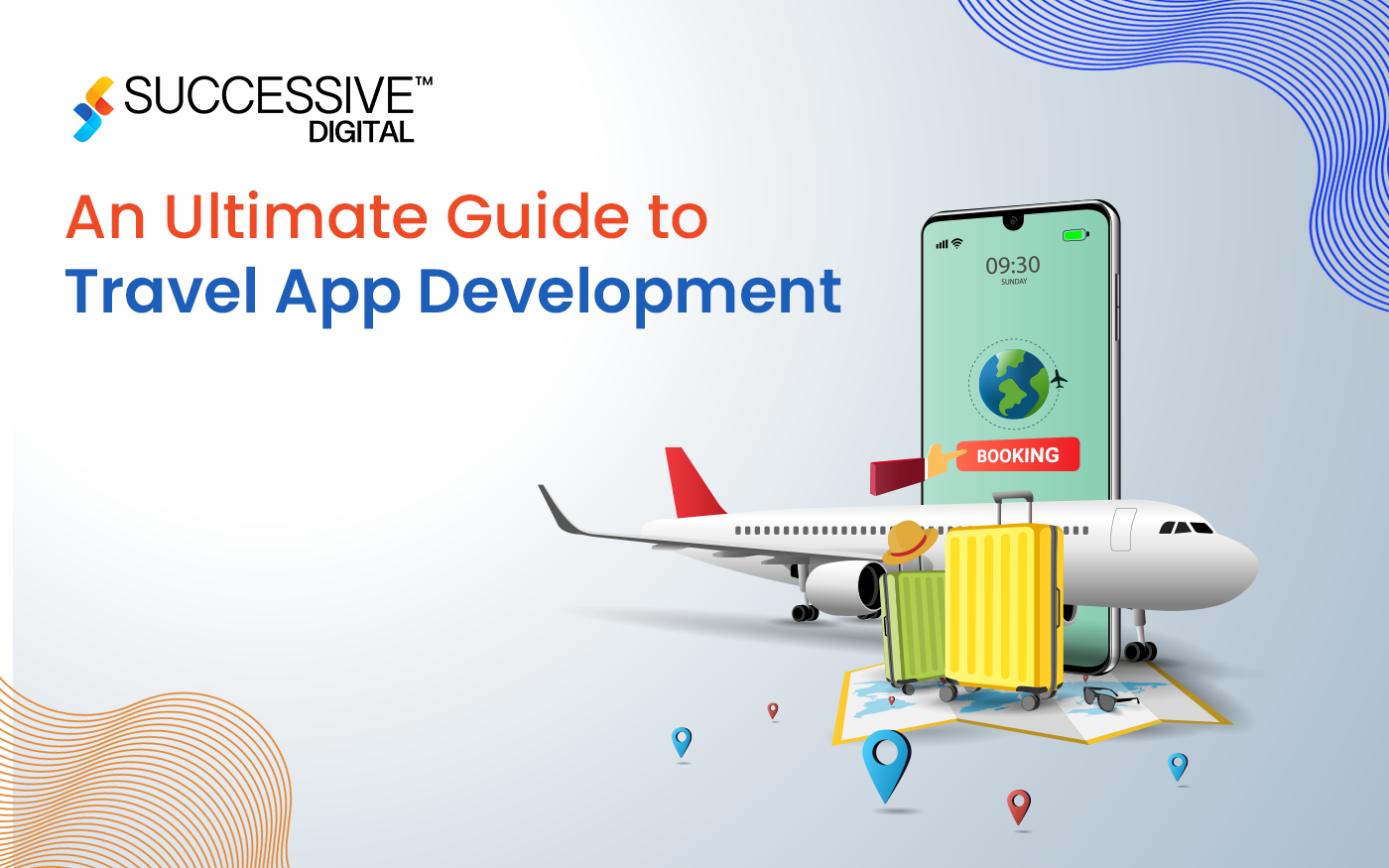
When a traveler plans a trip to their dream destinations, they go beyond the curve and scan the internet to make it worthwhile. This has compelled several travel and hospitality businesses, like Expedia, Booking.com, and Trivago, to invest in travel app development, facilitate digital bookings, and build a solution that caters to travelers’ specific needs. According to a Statista report, Booking.com recorded 80 million app downloads , while Airbnb had 52 million app downloads in the list of most downloaded travel apps worldwide. This study clearly explains how travel apps can be a valuable investment for online travel agencies and startups looking to tap into the tourism industry.
This comprehensive guide will dive into the details of travel app development, its benefits, development steps, essential features, and lastly, the cost.
How Mobile Apps are Transforming the Travel Industry?
Digital transformation in the tourism industry didn’t happen overnight. Travel agencies have implemented several strategies to make their business flourish, and being present digitally and facilitating an end-to-end digital experience is one of them.
Minimizing traditional hospitality operations, mobile apps have emerged as a significant player in transforming the tourism industry. It allows travel and hospitality operators to streamline their target users’ experiences – they provide travelers with accessibility to various options available throughout accommodations, flights, transportation, etc., of a specific destination via a single application and offer them the flexibility to book the best deal without having to leave the app or their homes, for that matter.
Furthermore, travel agencies also leverage the latest technologies, such as advanced AI and machine learning, for their mobile apps to gather data about customers’ preferences and leverage predictive analysis to improve their business strategies. An application-based customer experience journey gives agencies enough data to process and build models to make personalized travel recommendations based on the user’s past behavior and compel them to make the booking.
Benefits of Having a Travel App for Your Business
By now, you must’ve understood how the tourism industry is flourishing and is set to grow rapidly in the coming years. But with a spike in the industry’s CAGR comes an obligation to meet ever-evolving target users’ needs. Investing in tourism app development can give you a range of benefits to power your travel and hospitality business. Let’s discuss them below.
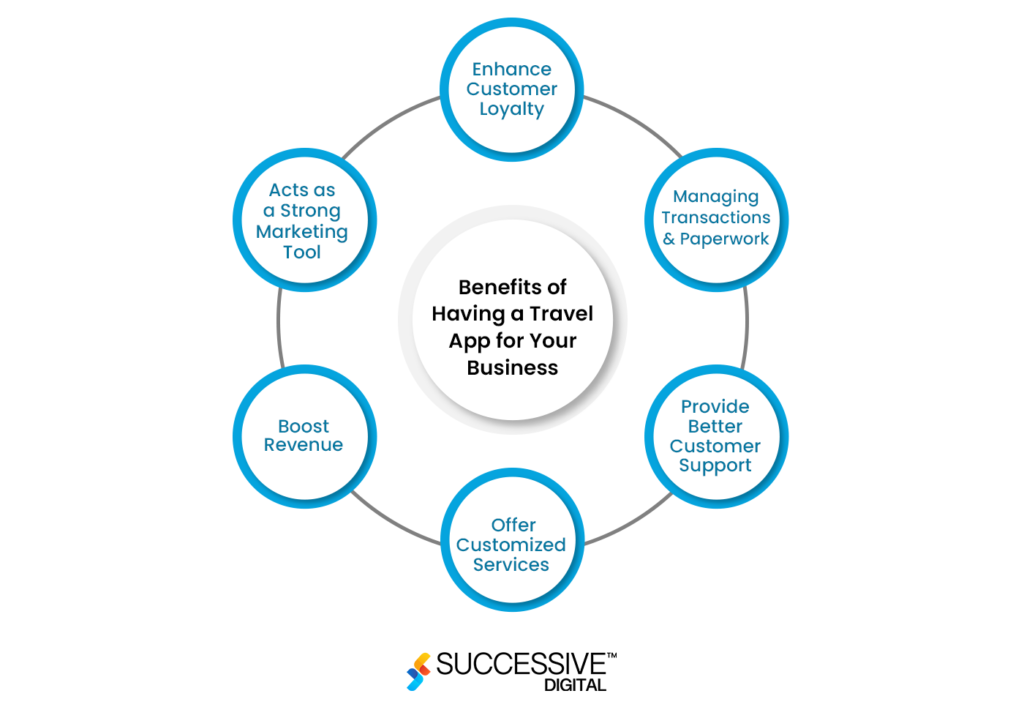
1. Enhance Customer Loyalty
With several businesses in competition, retaining loyal customers has become daunting in the long run. Here, the ideal solution is to invest in travel and tourism app development and build a target user-centric app. Creating a tailor-made mobile app allows you to reach a broader audience and meet their specific needs promptly to improve customer loyalty.
2. Minimizing Paperwork and Managing Transactions
A travel app enables travelers to book accommodations from the comfort of their homes, where they receive complete booking details in the app itself and over other platforms integrated with the app, such as Gmail and WhatsApp. This enables easy accessibility of all the documents upon arrival without carrying paper-based documents. Mobile apps also help businesses manage transactions for multiple users simultaneously. It enables them to eliminate the hassle of maintaining essentials like IDs and booking details on paper by making all the necessary traveler data manageable and accessible from a single app. With faster accessibility of traveler’s details, they can expedite the check-in and check-out process and facilitate in-app payments to enhance their travel booking experience.
3. Provide Better Customer Support
Every business aims to provide better customer services, irrespective of any industry. Since the travel industry is all about providing the “best possible” tour-related offerings, a mobile app can help boost the efficiency of these services and enable businesses to address customer queries faster. A high-performing travel app often includes functionalities such as in-app calling, AI-enabled chatbots, AR-enabled room or property tours, and WhatsApp-powered customer services, such as hotel ticket PDF and booking confirmation, that allow travel operators to provide advanced customer support.
4. Offer Customized Services
A travel app is designed to offer customized services to the end users. With its help, you can get detailed information about travelers’ preferences and cater your services, such as arrangements in the hotel room and meal options, for a better experience. You can leverage the latest technologies, such as AI, to offer personalized travel recommendations based on the past search preferences and booking behavior of the traveler and IoT for enabling Alexa-enabled hotel rooms that can play music, dim lighting, and order food with voice commands to enhance your hospitality services and overall traveler’s experience.
5. Boost Revenue
The traditional travel operations hampered businesses from reaching target customers since offline marketing strategies targeted every customer, irrespective of their needs. But thanks to mobile and web travel apps, online travel agencies can now reach the right customer, offer personalized experiences, and address their travel-related pain points. This enables them to persuade the target users for the final transaction and boost their sales.
6. Acts as a Strong Marketing Tool
The tourism app will be a significant marketing tool for your business. You can leverage it to showcase your services and essential insights to the target users and create brand awareness. Through a travel mobile app, you can also release notifications about sales, deals, offers, or discounts to the user via notifications who have been looking for or have opted in for future discounts. It will also help you to track and engage the users quickly to the offers and reduce marketing efforts while increasing sales. The more enticing your app is in front of the users, the higher the chances of it becoming successful in the market.

How Many Types of Travel Apps Can Be Developed?
Plenty of travel applications are rising up in the market, and tourism and hospitality businesses are increasing the experiences and expectations of travelers. Here is a list of different types of travel apps you can invest in to fill the gap in customer engagement and experience for your hospitality business.
1. Travel Itinerary Planning Apps
A travel itinerary planning app allows users to plan the overall itineraries of their trip. Adding functionality like this to your online travel business offerings enables you to capture travelers’ attention as you simplify their travel planning experience and save time often spent planning a comprehensive trip to multiple destinations at a time.
With travel planning applications, users can add all the details of their trip, including flight tickets, hotel booking, and other expenses, and manage everything from a single app. The app will manage their entire schedule and ensure they stay on track.
Some examples of these apps are Wanderlog, TripIt, and Sygic Travel.
2. Ticket Booking Apps
The ticket booking app development helps businesses build a dedicated app for travelers to book flight/train tickets for a particular destination. Such applications allow users to check and compare multiple flight/ train availability for preferred dates and display the best available options after scanning all third-party sites. With a ticket booking app, you can enable travelers to send push notifications for their preferred dates when the prices get low and help them with complete route planning by providing tickets for flights, trains, and buses. Additionally, your app must offer several deals and discounts, such as promo codes and “first booking” discounts, to help travelers book the best deals.
Examples of these apps include Expedia, Kayak, and Skyscanner.
3. Hotel Booking App
With the accommodation booking app, you can provide travelers with access to the details of various properties in a particular location or area. In such mobile applications, the users can check and compare the price range and other facilities, such as room type, pictures of the rooms, breakfast availability, check-in and check-out dates, and balcony views, and opt for the best hotel deal.
Such apps are Booking.com, Hotels.com, and Agoda.com.
4. Navigation Apps
By building a navigation app , you can help travelers find the perfect route from the airport/station to the required destinations in a particular city. A navigation app offers functionalities such as counting distance from the current location to the destination, displaying traffic, and integrating contact synchronization to track the latest check-ins of the user’s contacts. Additionally, it will show the best navigational route for reaching the hotel from the airport within the shortest time possible while minimizing traffic congestion.
Examples of such tourism apps include Google Maps, Apple Maps, and Komoot.
5. Travel Insurance Apps
Having travel insurance when planning a trip is a must-have for every traveler. The travel insurance apps provide insurance for travel-related accidents, such as baggage loss, theft, trip cancellation, loss of passport, medical emergency, bounced airline or hotel booking, etc., which are very common during long-haul trips. Hence, hospitality businesses can invest in such apps to help travelers book insurance coverage and track their past travel insurance and the latest ones for their upcoming trips.
Such apps are Goose Travel Insurance, Allianz TravelSmart, and AIG Travel Assistance.
6. Travel Guide Apps
By developing a travel guide app, you can assist travelers with information regarding events, heritage places, and restaurants of a particular destination. The app will include information about the best guides, restaurants, transportation, and tourist spots in the city. It will help travelers with functionalities like choosing the best restaurant to eat at or booking the top-rated tour guide, enhancing their overall trip experience.
Some popular travel guide apps are GetYourGuide, TripAdvisor, and Viator.
7. Transportation Apps
When travelers visit a new city, they prefer an on-the-go mobile app to book a cab and reach a particular spot quickly. By developing a transportation app, you can provide your target users with on-demand cab, bus, and taxi booking services. The app will provide functionalities, such as real-time ride tracking, driver details (driver name and vehicle’s RC number), and ride history, and help travelers reach their destination faster and without a hustle.
Examples of these apps include Uber, Ola, and Lyft.
Ready to Take Your Online Travel Business to the Next Level?
We’ll transform your app idea into a full-fledged product
Must-Have Features of a Travel Mobile App
Every dedicated travel mobile app comprises essential features, making it a high-performing and success-driven product. The app is divided into three segments: the customer panel, the property agent’s panel, and the admin panel. Each panel covers its own set of features that make the end product intuitive and fulfilling for each user persona. Let’s discuss each segment in detail:
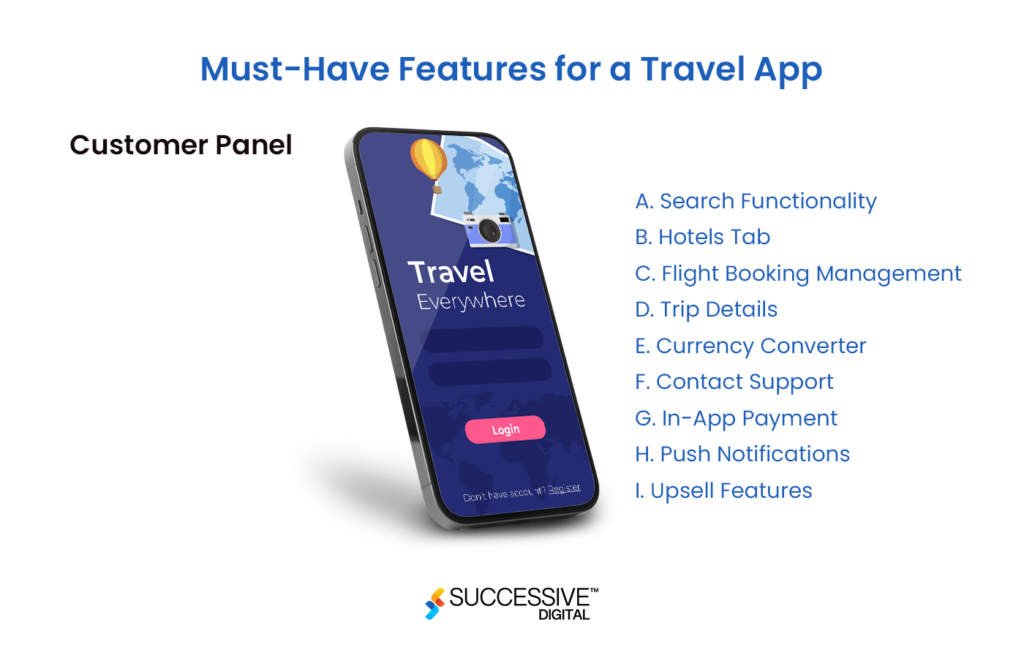
Travel App Development Features for Customer Panel
Being one of the core panels of a tourism app, it’s essential to add these features below to offer travelers a remarkable customer experience and engage them until and beyond the final purchase.
1. Log In/ Sign Up
Login and signup is a must-have feature in every mobile app, including the travel app. It allows users to easily register themselves on the business and save personal details like name, email address, phone number, home address, and other personal choices and preferences, which is further used to personalize the experience on the platform.
2. Search Functionality
Enabling a search functionality within a travel app requires you to pay enough attention and effort. As your travel app functions as a complete search engine for travel queries like destination information, flight or hotel bookings, or others, a search button at the top engages the user quickly by allowing them to search information instantly from your application. It enhances user experience within the app, reduces frustration, and increases satisfaction for every user.
3. Hotels Search
As accommodation is a crucial aspect of a trip, enabling a full-fledged hotel search option within an app allows you to address the vast preferences of the travelers, such as budget, location, amenities, and star ratings. You can also enable functionality like a filter for more deep searches at hotel levels; for example, a customer prefers an accommodation option at a particular property offering amenities like geyser and laundry service, breakfast availability, welcome drinks, and other add. The rule here is to be as descriptive as possible – enough to leave no room for confusion.
4. Flight Booking
A flight booking feature within a travel app allows customers to get real-time flight details for the searched destination on preferred dates, including flight availability, seating details, one-way or roundtrip details, etc. The rule that the travel app development company will implement here is to make this feature as intuitive as possible for travelers. For example, displaying fare rules and baggage information and providing functionalities such as sorting & filtering information by various options: departure time, trip time, layover duration, refundable fares, etc., make the user stick to the app and avail convenience at each step of travel planning.
5. Trip Details
A feature like “Trip details” or “my booking” as a separate section lets your customers view their trip history and upcoming trip details, such as booked flight tickets and accommodations. This feature would help them keep a reference point for their trip booking history, cancellations, and payments made, which they might consider revisiting in the future.
6. Currency Converter
If your app enables customers to travel worldwide, a currency converter is a must-have feature for the app. However, ensure it adequately displays currency conversion rates in real-time, such as Dollars ($) and Pounds (£) and others.
7. Contact Support
A key factor to focus upon while travel application development is ensuring you are available to your end users when they need you. Even if you cannot be physically present in the communication modes, you can integrate an AI-enabled chatbot to answer customers’ trip-related queries. The AI chatbot will provide them with personalized recommendations and solutions to enhance their trip-booking experience.
8. In-App Payment
One of the must-have features to add to your tourism app is in-app payment. You must integrate multiple payment gateways, such as Paypal, Stripe, and GooglePay, in your travel booking app to allow users to make payments against their booking from their preferred digital payment app without a hustle.
9. Push Notifications
Push notifications are significant and unavoidable when it comes to keeping the user engaged with your brand. With this feature, you can notify customers when a hotel is available for their preferred location, dates, and prices. Since customers continuously look for new offers or promotions, push notification encourages them to grab the deal instantly and make bookings too.
10. Additional Features
Though not essential, these are a few “good add-on features” to make your travel app more intuitive and efficient before your target audience. These include:
- Bundle Deals: Give customers details in combinations – Flight + Hotel or Hotel + Car deals to streamline their itinerary further.
- Car booking feature to make commutation easy in a foreign land.
- The “Things to Do” tab gives customers insight into activities happening at the destination on their trip dates.

Travel App Development Features for Admin Panel
The admin panel is the one where the admin is responsible for managing customers’ and agent’s details and streamlining the experience for both parties. The must-have features in this panel of the travel mobile application are discussed below.
1. User Management
User management is essential to maintain customer data, such as booking details, payment transactions, cancellation or refund information, and management of the overall profile of the user. The feature will help them streamline the process of keeping every booking running smoothly.
2. Agents Management
The Agents management feature is required to maintain the data of all third-party property owners and agents simultaneously. This includes details of the property and package and verification of property owners and agents.
3. Advertisement Management
It’s important for the app to display relevant advertisements, and it has to be managed by the admin. The admin will ensure the ads are travel-related, adhere to the parent company’s guidelines, and don’t overplay their role, which can lead to higher bounce-back numbers.
Travel App Development Features for Agent’s Panel
When we talk about agents, it means the hotels or trip planners who would be extending their services to your application. Here is the list of essential app features the agent panel of the travel app must include.
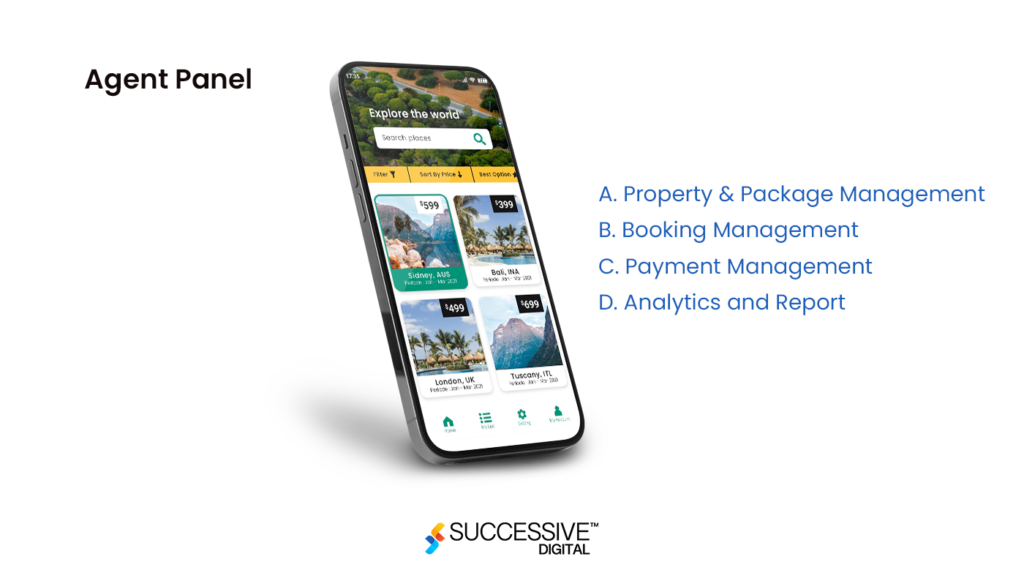
1. Property and Package Management
It is one of the most required features in the agent panel as it allows property managers or trip package owners to manage and modify the offering – the date, room availability, number of guests, payment details, etc.
2. Booking Management
The booking feature allows managers to decide whether they wish to accept or decline the booking request–in terms of requests aligning with the hotel’s policy or additional requests regarding smoking/non-smoking rooms and extra beds, etc.
3. Payment Management
Managing payments of several customers simultaneously is important for hospitality businesses to streamline transactions, refunds, and taxes. This feature is added to offer the service of accepting payments or making refunds, in addition to keeping track of the invoice of the bookings made.
4. Analytics and Reporting
The analytics and reporting feature will give hotel managers a dashboard to see the insights on their property or package, such as the number of bookings, reviews over time, payment details, etc. This will help them make better decisions about the property and the service they offer to the target travelers.
What is the Travel App Development Process?
Every successful tourism app, be it Expedia, Booking.com, or Airbnb, has followed a strategic app development process to make its product launch successful in the market. This is why a professional mobile app development company like Successive Digital suggests that businesses follow a dedicated step-by-step process, as explained below.
1. Market Research and App Ideation
The app development process begins with conducting in-depth research on the tourism industry, including the prevailing competition, market trends, and gaps that require a solution you can provide. This stage is highly crucial and the base determinant of whether the app will succeed in the market. During your research, you must also study your target audience and ideate the type of tourism app you want to build.
2. Decide App Features
After researching the market and identifying the target audience, the next step is to decide the features you want to add to your app. Do you want to make a basic features app? Or do you want a highly complex app with custom features and functionalities? This completely depends on your specific requirements, target users’ needs, and mostly your budget.
3. Consult and Hire a Trusted Travel App Development Company
Once you determine the app features and app type, it’s time to proceed with the development process. Building a mobile app in-house can cost you a fortune and requires deep knowledge of tech stacks. Hence, outsourcing a professional travel and tourism app development company is the best solution. The company will provide a dedicated development team ( frontend and backend developers, UI/UX designers, a project manager, a Business Analyst, a QA engineer, DevOps engineers, and a team lead.) They will understand your requirements and incorporate tech stacks and rightful development methods (native or cross-platform) to build a success-driven app product for your business.
4. MVP Development
Developing a minimum viable product (MVP) is an optimal strategy if you want to make your travel mobile app a success in the long run. An MVP is a basic feature version of the product, built with the aim of attaining feedback from a group of real users and then facilitating improvements in the app before the final launch. This will help create hype and awareness of your brand amongst the target users right from the initial stage and increase the chances of its success.
5. App Testing and Quality Assurance
After developing the MVP and making improvements as per user feedback, the app is pushed further for testing and quality assurance. The QA engineers will conduct thorough app testing, security compliance, and quality standardization to ensure your application is free of bug issues and glitches, can stand the competition, and is ready for the final launch amongst the end users.
6. Final Launch and Maintenance of the App
Now, every test, every quality check, and all other development phases are cleared, and your tourism app can be pushed to launch in the dedicated application stores (App Store and Google Play Store). Once it’s launched, the travel app development company will initiate maintenance efforts to streamline its functionality, fix bugs (if any), iterate improvements and updates, and maintain its performance.
Tech Stack Required for Travel App Development
In the process of travel mobile app development, you must also understand the tech stack used to build a full-fledged product. To develop a successful application like Booking.com or Airbnb, here is the probable list of tech stacks the development company will use.
Travel App Development Cost
Like every other mobile application, various influencing factors determine the travel app development cost. However, the overall cost can range from $60,000 to $300,000 on average. The actual estimate depends on the type of app you want to build, the complexity of the features, technology integrations, and the location of the mobile app development company.
Nevertheless, the table below will provide a brief overview of cost estimation based on the app’s complexity:
Wondering How Much Travel App Development Costs?
Book a free consultation with our experts and get your personalized quote today!
Why Successive Digital is a Reliable Partner for Travel App Development
With a decade of experience in facilitating digital transformation journeys of various industry-leading online travel agencies and hospitality businesses, Successive Digital takes pride in bridging the gap between technical complexities and innovation. Our seasoned developers will work closely with you to understand your pain points and create a tailored solution that appeals to your target audience. Our team has a strong understanding of robust frameworks and the latest technologies that can make your travel app a huge success.
With liberations in travel regulations and more people looking to explore their dream destinations, travel mobile app development is lucrative for online travel agencies more than ever. Since travelers now prefer online booking of their travel itinerary via smartphones, investing in travel app development can help you meet their needs faster and accelerate your business growth. However, to build a success-driven app, you must partner with a professional mobile app development company that can build a custom solution and integrate it with robust technologies.

FAQs- Travel App Development
Yes, investing in travel app development can turn out to be a successful move for your OTA. It will help you reach more customers, boost sales, and become a market leader in the long run.
The average travel and tourism app development cost can range between $60,000 to $300,000. But these are just rough figures, and the actual cost will vary depending on factors such as the type of app, the features’ complexity, development time, and the location of the mobile app development company.
Successive Digital has years of experience in developing custom travel apps for top-tier businesses in the tourism and hospitality sector. We understand each client’s specific needs and build a custom solution driven by innovation.
There are various types of travel app options available from which you can build the one that best aligns with your customers’ specific travel-related needs. These include:
- Travel planning app
- Ticket booking app
- Hotel booking app
- Travel insurance app
- Navigation app
- Travel guide app
- Transportation app
Ready to get started? Fill the form now!
Recent posts, categories see all.
- Artificial Intelligence
- Customer Experience
Related Blogs & Insights

Kotlin vs. Java

How IoT is Revolutionizing Mobile App Development

Tips on Designing PWAs to Boost User Experience
Your vision, our expertise - achieve unmatched digital transformation with ease.
Discover the Future of Digital Product Development with Our Global Expertise
Speak To Our Expert
Top Tourism App Ideas That Startups Can Steal To Shape Their Business
Using a travel app inseparable from modern travel and holiday is experience. While you travel, a great travel app comes as more than a problem solver, it almost becomes a constant companion.
Do you want to dive into the tourism industry with a unique or instantly engaging travel app idea? Well, this is the time to brainstorm some tourism app ideas. When you consider things to include in a travel app, new app ideas will help you.
Top 9 Tourism App Ideas in 2023
Here we are going to showcase some of the best travel app development company to develop your startup.
1) Travel App for Cost Saving Itinerary
Is it not common to many of us that we end up cancelling a trip just because the travel expenses are really not affordable? Well, to address this travel app developers can build a travel app that helps people to stick to the most cost-saving itinerary.
The app can help you save extra days by suggesting time-saving journeys, alternate routes, and various deals and discounts. You can plan every bit of the travel cost for the entire trip.
2) A Socialising App for Travellers
People still interact, ask questions and post helpful information on travel forums and discuss their trips. People also make travel posts on regular social media platforms. By taking this idea further one can build a social media app exclusively for travelers and help them stay connected with each other, talk about and share travel experiences, ask questions, provide information, share images, reviews, and itinerary.
Since there are already similar kinds of travel apps, you need to focus on a travel niche in particular. To make the app even more interesting, you should integrate travel itinerary, GPS-based maps, reviews, rating and itinerary-oriented features.
3) Travel Payment App
As mobile payment apps continue to get popular, a dedicated payment app with all specific features required by travelers on the go can be very helpful. From digital travel card integration as well ride booking features to currency converter, a travel payment app can be loaded with a range of helpful features that travelers need. Are you thinking how to build a travel app that instantly gets traction? Well, consider this tourism app idea.
Many hotels and restaurant chains offer travel cards and the app can integrate them to help use these cards for payments on the go. The dedicated payment app for travelers will also help global travelers in respect of country-specific rules and currencies.
Read More: Best Trending Startup Mobile App Ideas
4) Tour Guide App
A tour guide app can provide detailed information about a city and its multiple locations as well as sights. The same app can also provide details about the local cuisines and the particular experiences you should try.
The app apart from telling you about the must-visit places, history of locations, tickets and other information can also show a list of exquisite restaurants and their delicacies. The app can also showcase traveler reviews.
If you want to start considering travel app development costs, this simple idea can help you build an app with minimum cost burden. There are many mobile app development company india that can offer you a really lucrative budget while maintaining top notch quality.
5) Translation and Language Help App
This is already a well-known travel app idea that you need to develop further. You can incorporate a lot of new language options, features like voice-over and voice translation.
Such an app should also be able to scan an image and convert any text within the image into the native language. Finally, it will be more helpful if you offer offline access to translation features for travelers on the go.
6) Weather Forecast App for Travelers
Consider building an app that provides real-time forecasts on weather of travel destinations. This can be of immense help to travelers making trips in faraway places and places with the different weather condition.
The app should provide detailed information about the specific weather condition, temperature, perspiration, and rainfall. The app should also suggest the kind of wearables you should carry for such places.
7) App for Accessing Local Public Transport
When you travel in a new place you get cheated often by cab drivers and you end up hiring cabs when local transport is available nearby. To help with this lack of knowledge about a new city and its local public transportation, you can come with a traveler-friendly app.
The same app should also help the user with information on car-sharing, bike rental, inter-city or inter-state bus services, train routes and various passes. The app should also inform the user about the specific places and stops they should visit and the ones they already visited.
8) Deal Finder App for Travelers
A travel experience is hardly complete without shopping. This is why travelers always look for offers, deals, and discounts. You can address this need of travelers through a dedicated deal finder app.
When travelers download the app on their devices, they start getting messages and notifications on lucrative deals, new arrivals, discounts, local shopping trends, and special offers.
9) Restroom and Gas Station Finding App
Getting informed about the right facilities on the road such as gas stations, restrooms and garages are really important for travelers. This is why you can build an app to offer this helps to travelers. The same app should also inform the travelers on trains and flights on the next flights or train stations and options to take different routes.
Such an app should also inform about places on the go where you can fill your bellies with traditional delicacies and places of interest where you can stop for a while in case you have time. Such apps are especially helpful when you are travelling with your family and kids.
You may like this: How to Build an App Like Airbnb ?
At a time when everything in our lives became digital, travelers are likely to go for travel apps for their on-the-road needs. All these travel or tourism app ideas clearly explain how today’s travelers try to find almost every kind of help during travel right on their mobile devices. These ideas just offer a brief outline and you can always extend these tourism app ideas with unique features. You can hire mobile app developers in India for your next travel app project and get the best of expertise and competitive rate.
Take a look at
Frequently Asked Questions
- How Mobile App Benefits Travel and Tourism Industry? The use of mobile apps has transformed the travel and tourism industry in recent years, making it more convenient and accessible for travellers. Several ways in which mobile apps benefit the travel and tourism industry include Convenience, Real-time updates, Personalization, Reviews and recommendations, Contactless payments and Sustainability.
Travel apps make money through various means such as commission on bookings, advertising, premium features, and partnerships with travel companies.
Rate This Post
Written by Atman Rathod
Atman Rathod is the Founding Director at CMARIX InfoTech, a leading web and mobile app development company with 17+ years of experience. Having travelled to 38+ countries globally and provided more than $40m USD of software services, he is actively working with Startups, SMEs and Corporations utilizing technology to provide business transformation.
Hire Dedicated Developers
Ready to take your business to new heights? Our team of dedicated developers is here to make your dreams a reality!
Related Blogs
What is ocpp protocol integrating for ev charging for mobile app.
Using a travel app inseparable from modern travel and holiday is experience. […]
How to Create an App That Indicates Detect the Surface and Putting a Virtual Object in Android Apps
Have an interesting project let's talk about that.
Travel app Sēkr can plan your next road trip with its new AI tool

Sēkr, a startup that offers a mobile app for outdoor enthusiasts and campers, is launching a new AI tool for planning road trips. The new tool, called Copilot, is available on the startup’s updated website and app, which is used by more than 100,000 users.
The company was founded in 2016 with the goal of helping the “van life” community find campsites based on their needs, such as shower facilities, restrooms, overnight van parking or free Wi-Fi. The app also allows users to connect with fellow travelers who want to participate in outdoor activities together, like rock climbing or skiing.
After being acquired by van company Peace Vans in December 2023, the startup is under new leadership. Sēkr and Peace Vans CEO Harley Sitner was a user of the app for seven years but had noticed last year that the app had gone dormant. He learned that the founders of the startup were going to unwind the app due to the sudden shift in global fundraising climates in late 2022, despite having a strong user base. Sitner, who was a former product manager at Microsoft, was approached to acquire Sēkr in November 2023.
Fast-forward eight months, the startup is now looking to help people better plan the journeys to their destinations, while also updating the app with enhanced features that stay true to Sēkr’s original mission.
With the new AI-powered road trip planning tool, Sēkr is combining natural language processing with proprietary data from its community of users who have left reviews and ratings about specific places. Copilot also looks at publicly available data when creating road trip itineraries. The tool leverages OpenAI’s GPT, Meta’s Llama and others.

“For the millions of people traveling by van, car, or RV this summer, Sēkr Copilot will help you bypass hours of trip planning to quickly deliver a better itinerary,” Sitner said in a statement. “AI isn’t going to create a panoramic sunset, but it will help you overcome the notorious planner’s block, set you up for serendipitous moments, and connect you to an authentic road trip experience co-created by Sēkr’s incredible community of dedicated users.”
Copilot can be accessed via the new “Trip Planning” tab on the startup’s website or app. Once users open the tool, they will be asked to answer a series of prompts about where they’re going and what they’re looking for. The tool will then provide a travel itinerary that has editable trip legs that include camping destinations, stops for food and outdoor activities.
The idea behind Copilot is to help travelers discover unique places that they may not have known about otherwise. For instance, the tool may encourage travelers to check out a taco truck parked by the side of a dusty road in Baja that users have said offers better food than a five-star reviewed Denny’s outside of Los Angeles. Or, the tool may encourage users to explore secluded, unmarked areas in BLM (Bureau of Land Management) land that overlooks scenic views.
Sēkr is available on iOS and Android . The app’s basic features are free to use. Users can unlock premium features like, offline maps, event discount codes, and unlimited messaging and searching for $4.99 per month.
The startup previously received $2.25 million in seed funding led by Storyteller Overland, with participation from Backstage Capital, Techstars, Ad Astra Ventures, Crescent Ridge Ventures and Andy Ballester, the co-founder of GoFundMe.
Travel app Sēkr scores $2.25 million to bring campsite inventory into the digital age
More TechCrunch
Get the industry’s biggest tech news, techcrunch daily news.
Every weekday and Sunday, you can get the best of TechCrunch’s coverage.
Startups Weekly
Startups are the core of TechCrunch, so get our best coverage delivered weekly.
TechCrunch Fintech
The latest Fintech news and analysis, delivered every Tuesday.
TechCrunch Mobility
TechCrunch Mobility is your destination for transportation news and insight.
Boeing’s Starliner overcomes leaks and engine trouble to dock with ‘the big city in the sky’
Boeing’s Starliner spacecraft has successfully delivered two astronauts to the International Space Station, a key milestone in the aerospace giant’s quest to certify the capsule for regular crewed missions. Starliner…

Rivian’s path to survival is now remarkably clear
Rivian needs to sell its new revamped vehicles at a profit in order to sustain itself long enough to get to the cheaper mass market R2 SUV on the road.

Featured Article
What to expect from WWDC 2024: iOS 18, macOS 15 and so much AI
Apple is hoping to make WWDC 2024 memorable as it finally spells out its generative AI plans.

HSBC believes that $22 billion Byju’s is now worth zero
In a research note, HSBC estimates that the Indian edtech giant Byju’s, once valued at $22 billion, is now worth nothing.

What to expect from Apple’s AI-powered iOS 18 at WWDC 2024
As WWDC 2024 nears, all sorts of rumors and leaks have emerged about what iOS 18 and its AI-powered apps and features have in store.

Apple’s Design Awards winners highlight indies and startups
Apple’s annual list of what it considers the best and most innovative software available on its platform is turning its attention to the little guy.

Meta rolls out Meta Verified for WhatsApp Business users in Brazil, India, Indonesia and Colombia
Meta launched its Meta Verified program today along with other features, such as the ability to call large businesses and custom messages.

Meta adds AI-powered features to WhatsApp Business app
Last year, during the Q3 2023 earnings call, Mark Zuckerberg talked about leveraging AI to have business accounts respond to customers for purchase and support queries. Today, Meta announced AI-powered…

TikTok is testing Snapchat-like streaks
TikTok is testing streaks that are similar to Snapchat’s in order to boost engagement, including how long people stay on the app.

Inside Fisker’s collapse and robotaxis come to more US cities
Welcome back to TechCrunch Mobility — your central hub for news and insights on the future of transportation. Sign up here for free — just click TechCrunch Mobility! Your usual…

Revel to lay off 1,000 staff ride-hail drivers, saying they’d rather be contractors anyway
New York-based Revel has made a lot of pivots since initially launching in 2018 as a dockless e-moped sharing service. The BlackRock-backed startup briefly stepped into the e-bike subscription business.…

Google Play cracks down on AI apps after circulation of apps for making deepfake nudes
Google says apps offering AI features will have to prevent the generation of restricted content.

UK retailers file a £1.1B collective action against Amazon over claims of data misuse
The British retailers association also takes aim at Amazon’s “Buy Box,” claiming that Amazon manipulated which retailers were selected for the coveted placement.

Rivian overhauled the R1S and R1T to entice new buyers ahead of cheaper R2 launch
Rivian has changed 600 parts on its R1S SUV and R1T pickup truck in a bid to drive down manufacturing costs, while improving performance of its flagship vehicles. The end goal, which will play out over the coming year, is an existential one. Rivian lost about $38,784 on every vehicle…

Twitch DJs will now have to pay music labels to play songs in livestreams
Twitch has come up with a solution for the ongoing copyright issues that DJs encounter on the platform. The company announced Thursday a new program that enables DJs to stream…

Google partners with RapidSOS to enable 911 contact through RCS
Google said today it is partnering with RapidSOS, a platform for emergency first responders, to enable users to contact 911 through RCS (Rich Messaging Service).

Atlassian now gives startups a year of free access
Long before product-led growth became a buzzword, Atlassian offered free tiers for virtually all of its productivity and developer tools. Today, that mostly means free access for up to 10…

A social app for creatives, Cara grew from 40k to 650k users in a week because artists are fed up with Meta’s AI policies
Artists have finally had enough with Meta’s predatory AI policies, but Meta’s loss is Cara’s gain. An artist-run, anti-AI social platform, Cara has grown from 40,000 to 650,000 users within the last week, catapulting it to the top of the App Store charts. Instagram is a necessity for many artists,…

Google looks to AI to help save the coral reefs
Google has developed a new AI tool to help marine biologists better understand coral reef ecosystems and their health, which can aid in conversation efforts. The tool, SurfPerch, created with…

Tektonic AI raises $10M to build GenAI agents for automating business operations
Only a few years ago, one of the hottest topics in enterprise software was ‘robotic process automation’ (RPA). It doesn’t feel like those services, which tried to automate a lot…

SpaceX launches mammoth Starship rocket and brings it back for the first time
SpaceX achieved a key milestone in its Starship flight test campaign: returning the booster and the upper stage back to Earth.

Sirion, now valued around $1B, acquires Eigen as consolidation comes to enterprise AI tooling
There’s a lot of buzz about generative AI and what impact it might have on businesses. But look beyond the hype and high-profile deals like the one between OpenAI and…

Kleiner Perkins leads $14.4M seed round into Fizz, a credit-building debit card aimed at Gen Z college students
Carlo Kobe and Scott Smith believed so strongly in the need for a debit card product designed specifically for Gen Zers that they dropped out of Harvard and Cornell at…

How many Earths does your lifestyle require?
A new app called MyGlimpact is intended not only to help people understand their environmental footprint, but why they shouldn’t feel guilty about it.

Prolific Machines, with a $55M Series B, shines ‘light’ on a better way to grow lab proteins for food and medicine
Prolific Machines believes it has a way of transitioning away from molecules to something better: light.

Punk singer Shira Yevin pushes for fair pay with InPink, a women-focused job marketplace
It’s been 20 years since Shira Yevin, the lead singer of punk band Shiragirl drove a pink RV into the Vans Warped Tour grounds, the now-defunct punk rock festival notorious…

Qargo raises $14M to digitize and decarbonize the trucking industry
While the transport industry does use legacy software, many of these platforms are from an earlier era. Qargo hopes its newer technologies can help it leapfrog the competition.

Greptile raises $4M to build an AI-fueled code base expert
When you look at how generative AI is being implemented across developer tools, the focus for the most part has been on generating code, as with Github Copilot. Greptile, an…

Study finds that AI models hold opposing views on controversial topics
The models tended to answer questions inconsistently, which reflects biases embedded in the data used to train the models.

Cube is building a ‘semantic layer’ for company data
A growing number of businesses are embracing data models — abstract models that organize elements of data and standardize how they relate to one another. But as the data analytics…

- Skip to main content
- Skip to primary sidebar
Most successful travel app ideas for your consideration

All mobile app users want an instant response to a query, much like using Google on a laptop, and it is speed and minimal clutter that helps a travel app move up the rankings.
The leading mobile apps aim for a particular market and then dominate it. Tourism industry giants such as Booking and Kayak are aimed at the family or casual traveller, while airBnB offers its services to customers looking for a home from home.
While all the bases appear to be covered by those three, there are some highly successful mobile apps that fill the gaps that the big boys have missed.
Breaking it down by travel app category first, let’s have a look at 25 top travel app ideas that have been highly successful.
Flight booking apps
There are many out there in the market, but not all of them are reliable. The few that are incredibly popular have the biggest access to airline databases and can fetch prices quickly and efficiently.
This is a great flight booking application to find the best flights and save money. It will check seat availability on upcoming flights to any particular location, including travel insurance.
Although the app has added some extra booking features for car hire and hotels, its main strength has always been the flight search, which it does beautifully.
This travel app has a neat approach to finding the best flight using a very innovative idea. Once the dates are chosen, the app will let you know by push notifications when to buy tickets to get the best price.
It does this by watching price fluctuation and predicting when is the right time to purchase. Such a travel app is crucial for people who wish to save money.
Holiday Pirates
For the people who are flexible and ready to go anywhere, this travel app offers amazing deals and gets an honourable mention.
Adventurers can check out the ‘All Deals’ section with crazy prices for many travel destinations. It’s only available on iOS or website unfortunately, no android app.
FlightAware
If you’re one of those people who get skittish about flight departure times and gate changes (I am!), then this is absolutely vital for peace of mind.
The brilliant flight tracking mobile app allows you to check the status of any flight worldwide, and will send you push notifications about your flight, including delays and gate changes.
It’s one of those top mobile app ideas I couldn’t live without on vacation.
Hotel booking apps
Travel mobile app development has moved ahead so rapidly that we can offer three flavours of hotel booking apps.
The standard travel apps for booking hotels are usually used when planning a trip before a vacation starts.
Booking.com
Booking is one of the easiest and most convenient travel apps to use, as it offers an extensive range of venues globally.
Its success is based on return customers who wish to participate in the rewards program, which offers price discounts and travel deals.
With nearly 6 million places to stay, Booking gives their customers a wide variety of choice depending on budget.
For the traveler that wishes to get closer to the community, this one is the champion. Over 100,000 cities around the world have local properties and apartments connected to the travel app.
It is a great travel app idea, and there are several businesses who have tried to emulate AirBnB, with varying degrees of success.
One very successful travel app is Vrbo, Vacation rental by owner. It is an online brokerage system that matches property owners with vacationers wishing for a different holiday stay.
Fancy a holiday by the sea, or in the wilderness? Vrbo has cottages, bungalows and cabins to suit all tastes and budgets, including high end villas and ski chalets.
HotelTonight
Finally, the last minute market is alive and kicking. Travelers who are spontaneous can save a lot of money with this travel app.
In the tourism industry, there is nothing worse for a hotel to have empty rooms, and by working together with HotelTonight, they can still try and fill those rooms at the last minute, offering discounts to the app users.
This travel app is perfect for those who don’t like fixed plans and are open to offers.
Travel itinerary maker
A travel app development company will hit the nail on the head if they can produce a great itinerary mobile app.
These types of travel apps are designed to take the stress out of document handling and storage traditionally encountered in the tourism sector, by putting together all flight, hotel, travel insurance and tour mobile transactions in one place on a smartphone.
A peach of a travel app, it’s able to help travelers with destination research, organisation of email documents, and storing reservation information.
Offering offline access, the travel app makes it easy to keep track of the entire vacation, without having to worry about connection issues.
Think of it as a tour guide in your pocket, except you have to do all the preparation first!
The mobile app also lets users collaborate with friends and family, who can add notes and links to the itinerary using a social media platform.
This travel app works in a slightly different way. Every booking confirmation made needs to be emailed to tripit.com who then provides a free itinerary master document.
If mobile or wifi connectivity is not available, a Tripit user can still access the main document for their information.
This compilation of travel documents and confirmations makes Tripit highly successful with travelers.
Local public transportation apps
Once you’ve got there, how do you get around? Some people are not comfortable hiring a car in a new city abroad, so that leaves local public transit or walking.
Here are three great travel apps to consider.
The best tourism app for moving around is probably this one, with its access to bus and train timetables and accurate arrival times. It can also let you know when to get off so you don’t miss your destination.
Moovit ties into the GPS locators on each public transport vehicle to provide real time information on delays and traffic buildups.
A huge number of cities, both big and small, are listed on the travel app, and it makes accessing local public transport a breeze.
Moovit turned a clever travel app idea into such a successful business that Intel bought them out in 2020.
Next on my list is Transit, a similar local public transport option, with access to all buses, trains and subways in the area.
A smart detail in this travel app is that a user can tell it where he/she wants to go and it will provide precise details on how to make the trip.
Although Transit offers less cities on the app, the user interface is really attractive and intuitive, must have features for a successful travel app.
Finally, a great option that is widely used by people living in a new city is Citymapper.
Although the travel app offers the smallest number of destination cities of the three, it is really great for picking the mode of transport needed.
Buses, trams, metros and bicycles are all listed on the app, and if the bike option is chosen, the app will tell the user how many calories they will burn. Pretty useful stuff!
These three travel app ideas above have all become seriously popular with residents and visitors alike.
Ride booking
Car pooling has been around for many years, and was a useful tool for commuters who worked together and lived in the same areas.
Taxis provided the services needed for moving around a city quickly, but the public have started to avoid using them due to high prices, limited numbers of cabs, and often dirty conditions of the vehicle itself.
In 2009, a small company transformed the modern travel industry by providing fast, inexpensive and clean methods to get about.
I am going to list three different types of these travel apps, each with their own speciality.
Offering services similar to taxis, but much cheaper, Uber allows drivers to use their own vehicles to transport passengers, communicating via a mobile application.
Using the mobile app, a person can summon a driver to a location, with an in app feature giving precise GPS location details and time of arrival.
The passenger is able to enjoy time saving journeys, much faster and more comfortable than public transport.
Not without controversies, this is a remarkably successful business, with great benefits to the travel and tourism industry.
This travel app offers a corner to corner ride sharing experience, kind of like a shared shuttle service. Users book rides and then join the shuttle as it comes past.
This clever travel mobile app uses GPS and location algorithms to direct the shuttle to pick up and carry several passengers going in the same general direction.
It is basically a shuttle bus ticket booking app idea turned into an innovative service that helps to reduce carbon emissions and traffic bottlenecks in cities.
Unfortunately, Covid seriously affected the business, although it appears to be bouncing back. The benefits of the service are uncomplicated travel, comfortable shuttle vans, and prices equal to taking public transportation.
Via have also partnered with local transport authorities, universities and hospitals for non emergency patient transport.
The third iteration of ride sharing travel apps is BlaBlaCar, an extremely successful idea that has grown to over 100 million users predominantly in Europe and the surrounding countries.
It works like this. A driver who is going on a journey will upload the itinerary and any waypoints to the app, list the number of seats available and the cost of the ride.
I was amazed when my friend told me he took a 410 km ride with a doctor who was going on vacation.
The driver dropped my friend off right outside his house before heading further south to the mountains.
It cost less than 10 USD.
The travel mobile app is quick, especially for finding trips of 10 kms or more. It is easy to city hop, and then use the same travel app to move across the country.
By the way, the name of this travel app comes from the ‘talkyness’ of the driver in a ratings system. A Bla driver will watch the scenery go by, a BlaBla will be fairly conversational, and the BlaBlaBla driver will be unstoppable!
Currency converter
There are several travel mobile apps that support currency conversion, but for the most accurate service it is better to use a dedicated app.
This travel app was my go to for all things currency connected. It is simple to use and has a great interface.
Available for over 130 countries, the currency rate converter shows a live mid market rate and previous status up to the last ten years.
With the Xe travel app, you can even send and receive international money transfers, and the app will store all details for future inspection.
But not all tourism app ideas and improvements are well received. Recent changes to the mobile app have damaged its reputation somewhat, and the market leader is now……
All Currency Converter
It has pretty much the same features as Xe, but ACC adds a little flair.
It gives access to charts and the latest trends, tracks precious metals such as gold and silver, but the gem is the tip calculator tool.
After working out what tip you want to add, it will allow the user to pay a restaurant bill via a third party mobile app. Great if you want to split the bill between friends.
GPS based maps
Mobile apps that provide location services are vital for travelling. Having a phone map will allow users to find services such as gas stations close to them, trip distances and best route suggestions.
Some navigation apps are quite specialised for outdoor activities, such as hiking, and offer a premium package with weather forecasting and parking area locations.
Google Maps
The old favourite, Google’s own app, Maps has been used by millions as a city tour guide, to locate amusement parks and even to get information on local shopping trends.
Tied into the travel industry, Maps has helped countless people find exactly what they were looking for.
With the Google name tag attached, it is one of the finest location services around. Combine that with street view, and you get a complete visual exposure to any street, anywhere, just like a city guide.
Designed to be a mobile app for sharing precise locations, What3words is a fabulous app idea that has been a lifesaver to people wishing to meet up in an unknown environment.
Every single 3×3 metre square on the face of the earth is assigned three unique words, which can then be shared as a ‘pin’ for others.
For directions to the ‘pin’, users can use the built in compass or any GPS mobile app.
Lotus 4 map for outdoor activities
The basic free version of the Lotus 4 travel app is set up for adventure enthusiasts who like hiking, biking and geocaching as part of their vacation.
The interface allows app users to plan routes and record tracks. Using in app purchases, a user can upgrade and use the complete set of mapping tools.
Translation apps
The pleasures of travelling to another country can be swiftly diminished by language problems with everyday interactions.
This is where travel apps capable of translating multiple languages come to the fore. Mobile app development in this field has improved drastically, although there are still some teething problems that can be embarrassing.
Microsoft Translator
This app can be used offline, which makes it very handy when there is no internet connection available.
It has a very useful phrasebook built in, giving the users access to the most common phrases in several languages.
The travel app can use voice, text and photo inputs, which is perfect for translating menus and signs.
Google translate
Pretty much standard on all android phones, this mobile application assists the travel industry as much as the user.
It is very quick and simple to use, but it does require a wifi or mobile connection to work.
Packing app
One of the greatest travel app ideas has been this one. Who hasn’t fretted over what to take on a vacation and usually has packed too much?
Airlines should give the original travel app development company a pat on the back for reducing the amount of baggage, and users should too.
As far as travel app ideas go, this one is a doozy. It’s like your own personal packing assistant, giving a list of everything you need.
All you need to do is select the destination, the dates and the type of trip (business, general, adventure-based or other) and off it goes.
It will check the weather forecast and decide on rainwear or beach clothes, and will even note if there will be laundry access at the destination, reducing the amount of clothing and saving space.
This travel app does the same as Packpoint without the weather forecast, but adds a few extras that make it even more useful.
Travelling with people and/or pets? Covered.
To Do and shopping lists? All there for you.
It has a simple user interface, and you can use the Assistant, templates or choose your own list which will be stored in the cloud. I love it.
Companies that are involved in travel mobile app development have had a difficult time since 2020, but there are some outstanding performers in the travel industry and have managed to survive.
In many cases, the top mobile apps have strengthened their position in the market with acquisitions of competitors.
A successful business always looks forward to provide the finest service possible, retaining customers and enticing new ones to join.
Travel forums are constantly giving feedback to travel app developers in order to improve services and give more to the consumer.
There will always be simple and clever ideas for the travel app industry, and I expect to see huge growth in the coming years.
More #tech blog posts
Location-based features in mobile apps: leveraging geofencing and gps for enhanced utility, realitykit object capture – create custom 3d models for visionos.
The Brydge 17+
Brydge holdings llc, designed for ipad.
- 5.0 • 1 Rating
Screenshots
Description.
The Brydge app serves as a beacon of innovation in the realm of travel, fundamentally reshaping the dynamics of connecting tourists with locals. By transcending geographical boundaries and cultural barriers, we strive to cultivate genuine and immersive experiences that go beyond the typical tourist experience. Our vibrant community, affectionately known as "Brydgee's",' embodies a collective dedication to fostering meaningful connections between travelers and the diverse cultures they encounter. These Brydgee’s are not merely participants but ambassadors of authentic cultural exchange, exemplifying the spirit of connection that lies at the heart of our platform. With their unwavering passion and commitment, they serve as bridges, seamlessly facilitating interactions and insights that enrich the travel experience. Together, we are on a mission to revolutionize the very fabric of global exploration and connectivity. By embracing innovation and embracing the transformative power of human connection, we invite you to join us in shaping a world where boundaries dissolve, and authentic cultural immersion becomes the norm. Come, be a part of our journey, as we redefine the way the world explores and connects.
Version 2.0.1
Improvement & Bug fixes
Ratings and Reviews
This app will change travel.
The Brydge app is truly a game-changer in the world of travel. It offers an innovative approach to connecting tourists with locals, making every journey far more enriching and immersive. The app goes beyond the typical tourist experience by breaking down geographical and cultural barriers, allowing for genuine connections and deeper cultural exchanges. One of the standout features of Brydge is its vibrant community of “Brydgee’s”. These passionate individuals are not just users but ambassadors of authentic cultural exchange. Their dedication to fostering meaningful interactions is evident in every experience facilitated through the app. They serve as bridges between travelers and the diverse cultures they encounter, providing insights and interactions that are both enriching and transformative. The app itself is intuitive and user-friendly, making it easy to connect with locals no matter where you are in the world. The seamless facilitation of interactions and the insights offered by Brydge’s ambassadors significantly enhance the travel experience. It’s refreshing to see an app that prioritizes human connection and cultural immersion in such a profound way. Overall, the Brydge app is on a mission to revolutionize global exploration and connectivity. By embracing innovation and the transformative power of human connection, it redefines the way we travel and connect with the world around us. If you’re looking to go beyond the typical tourist experience and truly immerse yourself in the cultures you visit, I highly recommend giving Brydge a try. It’s a journey worth embarking on.
App Privacy
The developer, Brydge Holdings LLC , indicated that the app’s privacy practices may include handling of data as described below. For more information, see the developer’s privacy policy .
Data Not Collected
The developer does not collect any data from this app.
Privacy practices may vary, for example, based on the features you use or your age. Learn More
Information
- Developer Website
- App Support
- Privacy Policy

Get all of your passes, tickets, cards, and more in one place.
You might also like.
New York Subway Times
Art Stumble App
Motorcoach Resort Lake Erie
Ride Current Driver
Savoya EXP for Drivers
You are using an outdated browser. Please upgrade your browser to improve your experience.
REDEFINING THE END-TO-END PASSENGER EXPERIENCE AND BUSINESS PERFORMANCE
Vienna Airport enhancing role as an “innovation hotspot for the digital travel world of the future”
On the Ground | Startups // Jun 2024
Share on LinkedIn LinkedIn Share on Twitter Twitter Share on Facebook Facebook Share on Reddit Reddit Share on Flipboard Flipboard Share on Tumblr Tumblr Share via Email Gmail Share on WhatsApp WhatsApp

Vienna Airport – a Corporate Partner of the FTE Digital, Innovation & Startup Hub and an Airport Lab Network Partner of the FTE Baggage Innovation Working Group – is further enhancing its role as an “innovation hotspot for the digital travel world of the future”.
Whether autonomous wheelchairs, Artifical Intelligence (AI)-based photovoltaic inspection, autonomous cleaning robots or baggage check-in from home – numerous future projects for more passenger comfort and less resource consumption document the impressive five-year innovation track record of the collaboration with Plug and Play Tech Center.
The partnership between Vienna Airport and Plug and Play has been extremely productive since 2019. 15 major companies have already joined, including global players such as Airbus and SkyTeam, as well as the Vienna Insurance Group, Fraport AG, Aeroporti di Roma, Austrian Airlines and many more.
“Only innovation will create competitive advantages in the future,” said Dr Günther Ofner, Joint CEO and CFO, Vienna Airport. “Aviation in particular, like the entire travel industry, is undergoing a huge transformation process towards more passenger comfort, digitalisation and less resource consumption. Thanks to the cooperation with Plug and Play, we can look into the future with a telescope, so to speak, and prepare ourselves and all partner companies for the fully digital travel future in good time. The continuing good cooperation with Plug and Play helps to identify the necessary know-how worldwide to realise interesting digital future projects, such as autonomous wheelchairs and cleaning robots, as well as AI-based inspection of large-scale photovoltaic systems and many other AI-based services.”
Meanwhile, the Vienna Airport Conference and Innovation Center in AirportCity provides the local framework for innovation know-how. The latest addition is the first European ESA-Phi-Lab, which was recently opened at AirportCity. The aim of the ESA-Phi-Lab is to promote the commercialisation of space travel. ESA-Phi-Lab Austria will be part of a network of a total of 12 ESA Phi Labs in Europe, which will provide innovative projects and business enterprises with direct access to a variety of technology areas.
You may also want to read...

Vienna Airport begins €420m terminal expansion “to set new benchmarks in quality and ensure a comfortable stay”
Vienna Airport has started its €420 million terminal expansion. The development, to be complete in 2027, includes modern new retail and F&B, new lounges, and a state-of-the-art security checkpoint.
Construction , On the Ground , Terminal Design // Feb 2024

Aerolíneas Argentinas partners with Intelsat on multi-orbit inflight connectivity for “fast and dependable internet access”
Aerolíneas Argentinas has selected Intelsat to provide inflight connectivity service on 18 Airbus A330 and Boeing 737 MAX aircraft. It is the first in Latin America to use Intelsat’s new ESA antenna.
Connectivity , Up in the Air // Dec 2023

Vienna Airport and Austrian Airlines offer new services to enhance experience of travellers with hidden disabilities
Vienna Airport and Austrian Airlines are implementing measures to make their services more accessible. Travellers who are blind or have low vision can be guided through the airport utilising the Aira App.
Initiatives , On the Ground // Oct 2023
Future Travel Experience Ancillary
11-13 June 2024, Dublin
Empowering the airline sector to profit from collaborative digital retailing opportunities at every step of the journey
Future Travel Experience EMEA
A gathering of air transport’s digital and innovation leaders, creative designers and progressive minds who will inspire one another and reimagine travel together.
Future Travel Experience Global
28-30 oCT 2024, California
Where the world's most progressive travel facilitators define tomorrow’s end-to-end passenger experience

Future Travel Experience APEX Asia EXPO
19-20 November 2024, Singapore
Connecting vendors with airline and airport executives to transform tomorrow’s end-to-end passenger journey across Asia-Pacific
Get Future Travel Experience news & updates sent to your inbox

Dont remind me again X Close
TechRepublic

ChatGPT Cheat Sheet: A Complete Guide for 2024
Get up and running with ChatGPT with this comprehensive cheat sheet. Learn everything from how to sign up for free to enterprise use cases, and start using ChatGPT quickly and effectively.

The 10 Best AI Courses in 2024
Today’s options for best AI courses offer a wide variety of hands-on experience with generative AI, machine learning and AI algorithms.

Llama 3 Cheat Sheet: A Complete Guide for 2024
Learn how to access Meta’s new AI model Llama 3, which sets itself apart by being open to use under a license agreement.

Gartner: 4 Bleeding-Edge Technologies in Australia
Gartner recently identified emerging tech that will impact enterprise leaders in APAC. Here’s what IT leaders in Australia need to know about these innovative technologies.

How Apple’s 2024 iPads Will Benefit Working Professionals
At Apple's "Let Loose" event, the company unveiled major upgrades for the iPad Pro and iPad Air, with a new Apple Pencil as icing on the cake.
Latest Articles

IBM’s Think 2024 News That Should Help Skills & Productivity Issues in Australia
TechRepublic interviewed IBM’s managing director for Australia about how announcements from the recent Think event could impact the tech industry in particular.

Cisco Live 2024: New Unified Observability Experience Packages Cisco & Splunk Insight Tools
The observability suite is the first major overhaul for Splunk products since the Cisco acquisition. Plus, Mistral AI makes a deal with Cisco’s incubator.

Top Tech Conferences & Events to Add to Your Calendar in 2024
A great way to stay current with the latest technology trends and innovations is by attending conferences. Read and bookmark our 2024 tech events guide.

Intel Lunar Lake NPU Brings 48 TOPS of AI Acceleration
Competition for AI speed heats up. Plus, the first of the two new Xeon 6 processors is now available, and Gaudi 3 deals have been cinched with manufacturers.

Cisco Live 2024: Cisco Unveils AI Deployment Solution With NVIDIA
A $1 billion commitment will send Cisco money to Cohere, Mistral AI and Scale AI.

AMD Reveals Ryzen 9000 CPUs and AI PC Architecture at Computex 2024
The next generation of Ryzen processors for desktops is built on AMD’s Zen 5 microarchitecture.

What is the EU’s AI Office? New Body Formed to Oversee the Rollout of General Purpose Models and AI Act
The AI Office will be responsible for enforcing the rules of the AI Act, ensuring its implementation across Member States, funding AI and robotics innovation and more.

Google, Microsoft, Meta and More to Develop Open Standard for AI Chip Components in UALink Promoter Group
Notably absent from the group is NVIDIA, which has its own equivalent technology that it may not wish to share with its closest rivals.

GPT-4 Cheat Sheet: What Is GPT-4, and What Is it Capable Of?
How much better is GPT-4 compared to previous models? Learn about cost and capabilities.

Gartner’s 7 Predictions for the Future of Australian & Global Cloud Computing
An explosion in AI computing, a big shift in workloads to the cloud, and difficulties in gaining value from hybrid cloud strategies are among the trends Australian cloud professionals will see to 2028.

OpenAI Adds PwC as Its First Resale Partner for the ChatGPT Enterprise Tier
PwC employees have 100,000 ChatGPT Enterprise seats. Plus, OpenAI forms a new safety and security committee in their quest for more powerful AI, and seals media deals.

Top 5 Cloud Trends U.K. Businesses Should Watch in 2024
TechRepublic identified the top five emerging cloud technology trends that businesses in the U.K. should be aware of this year.

Celoxis: Project Management Software Is Changing Due to Complexity and New Ways of Working
More remote work and a focus on resource planning are two trends driving changes in project management software in APAC and around the globe. Celoxis’ Ratnakar Gore explains how PM vendors are responding to fast-paced change.

AI Seoul Summit: 4 Key Takeaways on AI Safety Standards and Regulations
Major breakthroughs were made in global nations’ AI safety commitments, AI safety institutes, research grants and AI risk thresholds at this month’s AI Seoul Summit.
Create a TechRepublic Account
Get the web's best business technology news, tutorials, reviews, trends, and analysis—in your inbox. Let's start with the basics.
* - indicates required fields
Sign in to TechRepublic
Lost your password? Request a new password
Reset Password
Please enter your email adress. You will receive an email message with instructions on how to reset your password.
Check your email for a password reset link. If you didn't receive an email don't forgot to check your spam folder, otherwise contact support .
Welcome. Tell us a little bit about you.
This will help us provide you with customized content.
Want to receive more TechRepublic news?
You're all set.
Thanks for signing up! Keep an eye out for a confirmation email from our team. To ensure any newsletters you subscribed to hit your inbox, make sure to add [email protected] to your contacts list.

DFPI Cautions on Apps Offering Unqualified Securities
Jun 5, 2024
The California Department of Financial Protection and Innovation (DFPI) has issued desist and refrain orders for violations of California securities laws against Alluo and Star Network , which both unlawfully offered investments to the general public through smartphone apps available for download from app stores.
A new consumer brochure describing the dangers of unregistered securities offered through smartphone apps is now posted to the DFPI website. The brochure gives advice to consumers on how to protect themselves from unlawful investment activity and what to do if they get involved with such apps.
The orders require these entities to desist and refrain from the further offer and sale of securities unless and until qualification requirements of the law have been met.
The DFPI urges consumers to exercise extreme caution before responding to any solicitation offering investment or financial services. To check whether an investment or financial service provider is properly licensed in California, or to submit a complaint, consumers should go to the DFPI website at https://dfpi.ca.gov/consumers/ or call 1-866-275-2677.
Consumer Alerts Archives
- Consumer Alerts 2024
- Consumer Alerts 2023
- Consumer Alerts 2022
- Consumer Alerts 2021
- Consumer Alerts 2020
- Consumer Alerts 2019
- Consumer Alerts 2018
- Consumer Alerts 2017
- Consumer Alerts 2016
- Consumer Alerts 2015
- Consumer Alerts 2014
- Consumer Alerts 2013 and 2012
- 2004-2013 Escrow Alerts Archive
- Enforcement Alerts Archive
- Payday Lender Alerts Archive
News & Info Links
- Press Releases
- Monthly Bulletins
- Important Notices
Information
Help us improve the DFPI website! Share your feedback .
Last updated: Jun 6, 2024 @ 9:07 am
This free line-cutting app could save you hours at the airport
Skip the wait at customs and immigration with Mobile Passport Control, travel’s best open secret.

A month ago, I flew from Paris back to Baltimore full of despair: My vacation was over , and the trip home seemed to take an eternity .
Then I saw the snaking line for customs and immigration.
What could have sunk me into a deeper woe actually revived me, because I didn’t have to wait in that soul-sucking purgatory. I didn’t have to wait in the shorter but still well-populated Global Entry line, either.
Instead, I headed to a third option that most people miss: the Mobile Passport Control (MPC) line. Thanks to this secret national treasure, I was out of the airport and hailing my Uber in eight minutes. (I timed it.)
You, too, can experience this completely free VIP treatment the next time you fly internationally. Here’s how.
What is Mobile Passport Control?
Think of Mobile Passport Control like a fast pass for international travel. It’s a free service that allows select travelers to access a U.S. Customs and Border Protection (CBP) express lane with a smartphone app.
To be eligible, you must be a U.S. citizen, a lawful permanent resident, a Canadian B1/B2 citizen visitor or a returning Visa Waiver Program traveler with approved Electronic System for Travel Authorization.
You can use the app only when returning from an international trip at an MPC-approved site . That includes more than 30 U.S. international airports, 14 pre-clearance locations (among them airports in Abu Dhabi, Aruba and Ireland) and four seaports.
Why don’t more people use it?
Although you’ll see signs promoting Mobile Passport around those sites and sometimes ads on in-flight entertainment systems, most people aren’t taking advantage of the service. Just 8 percent of eligible travelers used the app in the 2024 fiscal year, according to CPB spokesman Aaron Bowker, though that’s a 50 percent increase from the year before.
The company Airside Mobile originally developed the app and launched it in 2014, first at Atlanta’s Hartsfield-Jackson International Airport. Awareness of its powers seemed to spread mostly by word of mouth and some signs around airports. In 2022, CBP officially took over the app, launching an updated version that left the original defunct. Some travelers missed the memo and figured the service had been discontinued when their app no longer worked.
But CBP is invested in the program’s growth.
“We’ve expanded the population of travelers that are able to use it. We’ve started to educate the airports. Airports have started to put in a better queuing system,” Bowker said. “And so we’re expecting to see this continue to increase.”
How Mobile Passport works
First, download the Mobile Passport app from the Google Play Store or Apple App Store . Unlike line-cutting services such as Global Entry or TSA PreCheck , MPC doesn’t require preapproval or an application process. Even if you forget to do it before your trip, it’s so quick to set up, you can install it as you’re walking up to customs.
When it’s time to pass through, eligible travelers can fire up the app, answer the standard few questions about their trip that they would at a customs kiosk, take a selfie and proceed to a dedicated Mobile Passport lane, where an officer will confirm their details and wave them through. Individual travelers and families of up to 12 people can use the app at once.
It makes me feel like a fancy diplomat — not someone who just spent 12 hours in economy — every time I use it.
Mobile Passport vs. Global Entry
Mobile Passport and Global Entry both promise a faster airport experience. Both also come with pros and cons.
One MPC downside: Although it’s free to use and rarely has a line of more than a few travelers, it’s not at every airport. And Mobile Passport lanes may not always be available even in places that claim to offer it.
CBP spokeswoman Corey Daboin said the agency is aware of that problem. Sometimes, issues are due to infrastructure constraints — some airports may not have the lanes available to operate MPC continuously — or management. The agency stresses, however, that Mobile Passport is a priority, and “we are working on making that so it’s not an issue moving forward,” Daboin said.
If you fly internationally and your home airport doesn’t have MPC yet, Global Entry is a great option. It does cost $100 and requires an application and interview process. But it also comes with a TSA PreCheck membership and is good for five years — plus it’s still light-years better than waiting in that endless regular line.
More travel tips
Vacation planning: Start with a strategy to maximize days off by taking PTO around holidays. Experts recommend taking multiple short trips for peak happiness . Want to take an ambitious trip? Here are 12 destinations to try this year — without crowds.
Cheap flights: Follow our best advice for scoring low airfare , including setting flight price alerts and subscribing to deal newsletters. If you’re set on an expensive getaway, here’s a plan to save up without straining your credit limit.
Airport chaos: We’ve got advice for every scenario , from canceled flights to lost luggage . Stuck at the rental car counter? These tips can speed up the process. And following these 52 rules of flying should make the experience better for everyone.
Expert advice: Our By The Way Concierge solves readers’ dilemmas , including whether it’s okay to ditch a partner at security, or what happens if you get caught flying with weed . Submit your question here . Or you could look to the gurus: Lonely Planet and Rick Steves .


IMAGES
VIDEO
COMMENTS
Based on the Travel Innovation Map, the Tree Map below illustrates the impact of the Top 9 Travel Industry Trends in 2024. Startups and scaleups are enabling contactless travel using technologies like biometrics, radio-frequency identification (RFID), and near-field communication (NFC). This is due to increasing health and hygiene concerns post ...
NEW Travel Apps Report 2023: Speed And Innovation in the Travel App Industry. We are excited to share Watchful's new report, with new findings on how 15 of the biggest companies in the industry, including major airlines and OTAs (Online Travel Agents), are pushing their R&D and product efforts to remain competitive and meet or exceed traveler ...
June 2021 travel app installs were 7% above the yearly average. June 2022 travel app installs were 10% above the yearly average. June 2023 travel app installs were 11% above the H1 2023 average. June also continues to be a star month in other trends and below, we'll get into more on why that is. 2. Travel app sessions journey upward.
This is why, according to our research by my company, downloads of the top U.S. airlines, hotels and online travel agencies apps are up 45% year-over-year. This was particularly true for airline ...
This report - in partnership with Apptopia - takes an in-depth look at the lay of the travel app land, analyzing more than 100 apps across the travel ecosystem. Topics covered include: Top travel apps by downloads and monthly active users. Dynamics across the Android and iOS platforms. Competitive analysis within and across travel segments ...
— Mike Coletta, manager of research and innovation. Underappreciated tech in travel. Travel is at a tipping point, balancing traditional ways of doing business with an exciting future of emerging technologies. The industry, while not a stranger to technological investment, lags other sectors in adopting and integrating new advancements.
Each year, Phocuswright's expert analysts identify the technology and innovation trends that will influence travel significantly in the coming year and beyond. This year, we're exploring the growing roles of social media and Web3 in travel, addressing the realities of sustainability and our fragmented technology landscape, and pondering the ...
Trend 1: The domination of personalized offers…. Better personalization of offers & user experience is key to handling a diverse, segmented market. Customers want such offers and they are willing to pay for them. Hunters want access to exclusive and quick deals. Planners expect a streamlined and seamless experience.
The future of travel app development is a dynamic landscape where technology continues to redefine our journey. From immersive AR experiences to AI-driven personalization, the travel industry is embracing innovation to offer more seamless, secure, and sustainable experiences. As we embark on this journey into the future, one thing is certain ...
UV-C cleaning. Hospitals have used UV-C light to disinfect and kill viruses for more than two decades. Now, indoor public spaces including airports, gyms, and movie theaters are adding UV-C to ...
Dublin, June 04, 2024 (GLOBE NEWSWIRE) -- The "Thematic Intelligence: Travel Apps (2024)" report has been added to ResearchAndMarkets.com's offering.This report provides an overview of the impact ...
Similarly, travel-goers also like to share their photos and videos through a special purpose travel social app. This also helps them in preserving the memories of their travel experiences. 4G & 5G Connectivity. If the growing innovation in mobile apps wasn't enough to shake the travel industry, 4G technology did the deed.
Just like in previous years, the travel industry will certainly be heavily influenced by travel apps in 2024.Nowadays, travel businesses have to focus on quality and value as much as quantity of services and products, which means creating personalized experiences and offering seamless travel services, sustainable initiatives, and cutting-edge technologies.
The app also translates photos and has a "conversation mode" so travelers can communicate fluidly with others. Instant translation also became a standard feature on Apple's latest iOS 14 update, which includes a Translate app that supports 10 languages. ... Travel insurance is an important innovation as it provides peace of mind and ...
The app could also offer real-time booking options for flights, hotels, and activities. Travel Safety App. Safety is a top priority for travelers, and a travel safety app could help ease some of ...
This study examines the factors influencing the intention to use travel apps in emerging economies based on the technology acceptance model (TAM) and diffusion of innovation (DOI) theory. A structured questionnaire was used to collect cross-sectional data from a sample of 313 smartphone users who had used travel apps. Data were analysed using partial least squares structural equation modelling ...
Discover the best travel apps for 2024 that can help you find flight deals, book vacation homes, reserve camping sites, and more with PCMag's expert reviews.
Business Travel Apps Rank High In Expenses. In a recent report from expense management company, Certify, of customer expense habits in the second quarter of 2019, Uber ranked as the top expensed service by far. Uber was followed by Starbucks, with its rival Lyft coming in third. Both of these rideshare services are booked only via mobile app ...
Travel apps have changed the way we organize and manage every journey. It seems like every problem or issue can be easily resolved by just unlocking a smartphone and downloading different apps ...
The World Economic Forum is an independent international organization committed to improving the state of the world by engaging business, political, academic and other leaders of society to shape global, regional and industry agendas. Incorporated as a not-for-profit foundation in 1971, and headquartered in Geneva, Switzerland, the Forum is tied to no political, partisan or national interests.
The average travel and tourism app development cost can range between $60,000 to $300,000. But these are just rough figures, and the actual cost will vary depending on factors such as the type of app, the features' complexity, development time, and the location of the mobile app development company.
6) Weather Forecast App for Travelers. Consider building an app that provides real-time forecasts on weather of travel destinations. This can be of immense help to travelers making trips in faraway places and places with the different weather condition.
Sēkr, a startup that offers a mobile app for outdoor enthusiasts and campers, is launching a new AI tool for planning road trips. The new tool, called Copilot, is available on the startup's ...
AirBnB. For the traveler that wishes to get closer to the community, this one is the champion. Over 100,000 cities around the world have local properties and apartments connected to the travel app. It is a great travel app idea, and there are several businesses who have tried to emulate AirBnB, with varying degrees of success.
TripIt. The TripIt app organizes all your travel plans in one convenient place, making it easy for you to find your flight details, hotel confirmations, rental car info and more without having to ...
The Brydge app serves as a beacon of innovation in the realm of travel, fundamentally reshaping the dynamics of connecting tourists with locals. By transcending geographical boundaries and cultural barriers, we strive to cultivate genuine and immersive experiences that go beyond the typical tourist…
Vienna Airport - a Corporate Partner of the FTE Digital, Innovation & Startup Hub and an Airport Lab Network Partner of the FTE Baggage Innovation Working Group - is further enhancing its role as an "innovation hotspot for the digital travel world of the future". Whether autonomous wheelchairs, Artifical Intelligence (AI)-based ...
Innovation Project Management Celoxis: Project Management Software Is Changing Due to Complexity and New Ways of Working . More remote work and a focus on resource planning are two trends driving ...
The California Department of Financial Protection and Innovation (DFPI) has issued desist and refrain orders for violations of California securities laws against Alluo and Star Network, which both unlawfully offered investments to the general public through smartphone apps available for download from app stores.. A new consumer brochure describing the dangers of unregistered securities offered ...
The company Airside Mobile originally developed the app and launched it in 2014, first at Atlanta's Hartsfield-Jackson International Airport. Awareness of its powers seemed to spread mostly by ...